Today we were lucky to have poet A.F Harold visit Huish. Ashley (as we were asked to call him) came to school to perform some of his most famous poems and to inspire us to begin writing our own. He shared with us some silly poems, some strange poems, some poems that rhymed and some that didn’t. Having performed some of his poems ourselves in assembly, it was fascinating to see him read with such expression and energy.
After reading some poems, Ashley talked to us about how to start writing poems, and how ideas can build. We had a go at some tasks where we thought creatively and combined some of our ideas. Soon, we will be writing poems for the Somerset Literacy Network competition, so will be putting his wise advice into practice.





We completed a book share with Class 4 for World Book Day. We paired up with the Year 1 children and read them one of our favourite stories. We made sure to read with accuracy and expression. We chose fun books, silly books, interesting books and some of us even chose our favourite childhood books! We had so much fun sharing and connecting with the Year 1s! We also listened to Year 1 children read and helped them with any of the words or sounds they found difficult. Lastly, we completed some word puzzles together.
In our English lesson, we completed a book review of our favourite book. We included a star rating, a synopsis of the plot and characters, our opinions and who we would recommend the book to. We completed a front cover and a blurb too! We then shared our book reviews around the class and chose two new, recommended books to read next! We really enjoyed sharing our favourite books and were very inspired to read something new.





Today was Vocabulary Day! In the morning, we shared our word with Class 4. They enjoyed learning some trickier vocabulary.
We got to dress up as a tricky word and had to explain what our tricky word meant. We joined with the rest of Year 5 and celebrated Vocabulary Day by finding four new words that we didn’t already know. We had to explain what the word meant, put it in a sentence and draw it.





Today, in PSHE, we shared skills! We have a very talented year group and this afternoon we taught our friends some new skills. Not only did this allow us to celebrate our diverse range of talents, but it continued our learning about how skills are developed. We had to carefully consider how we could help others to succeed in something they haven’t tried before. Many groups could be seen giving instructions, showing demonstrations and praising their peer when they did well.
Some of the skills on display included:
-Speaking foreign languages
-Playing chess
-Specific aspects of a sport
-Roller blading
-Cooking
-Playing a musical instrument
-Creating abstract art
How did your partner help you to learn?
Bella – they did it step by step
Harry – they demonstrated it first
Otis – Finlay communicated well
How did you know if you were doing well?
Autumn – they complimented me, “that’s really good!”
Finlay – Otis gave me feedback about the moves I was making in chess
What did you find challenging?
Ezra – the teachers sometimes had to repeat their instructions.
T – our teachers had to slow down their instructions so that we could understand.





Today was International Day! This year – France!
We began the day by by learning key facts about the country, before using atlases to research its locality and other geographical features. We also spent some time learning how to count in French.
After playtime, we moved on to research French food. The children were tasked to create a menu, recipe or poster related to a French food type or restaurant. Alongside this, children had the opportunity to make and eat crepes.
In the afternoon, we produced some French art. We studied Georges Seurat (famous for pointillism). We recreated his ‘The Seine at Le Grande Jatte’.





Class 11 had our first history lesson of Year 5! We began by ordering each period of time from The Big Bang to today and the future. Some pictures gave us clues such as their armor, the types of houses and if the date was BC. We talked a lot about evolution of these different areas.





This week was Art Week! We have been studying African Art and an artist called Gakonga. We studied Gakonga’s art work and created a mood board to express our thoughts and feelings about his work. Then we practised our paint colour blending of warm colours and made different shades by adding white or black.
We were really proud of our final pieces and we enjoyed learning about Africa and its artwork!





Today, Year 5 performed poems for Key Stage 2 in Assembly. Both classes have been practising poems by A.F Harold. In rehearsals, we analysed the poems to understand what they were about. We discovered that A.F.Harold writes in a quirky, funny style. Year 5 read with expression to make the poems entertaining, adding actions as well.





On Friday 18th October we had a visit from Tim from Wessex Water. He taught us about the safety of water, the water cycle, how water is extracted from rivers, problems and issues relating to water, how water gets dirty, unblocking pipes, what things are put in the toilet and found in the pipes and sewers and many other things!
Tim did a demonstration on how water gets dirty! He added body wash used for showering, bath liquid used to make our bath soapy, milk left from cereal, coffee left from Miss Horsfield’s cup and toothpaste from brushing our teeth! We even had to add toilet paper, pee and poo! This water ends up back at Wessex Water for them to clean so that it is safe for us to use again.
We had to test whether tissues, wet wipes or toilet paper should or shouldn’t be flushed down the toilet. We estimated if they would break down and be flushable or if they would clog and block our drains. The tissue and the wet wipe did not disintegrate and would block the drains. The toilet paper started to disintegrate so can be flushed down the toilet.





In Geography we looked at the Year 5 pick and mix homework for our topic ‘Rivers’. We explored both classes and wrote down 3 facts that we found out from someone else's homework.
Thank you to all those who took the time to produce some fantastic homework! The children enjoyed sharing what they produced.





Nicky and Michelle came to visit us today from Nationwide. They taught us all about banking and money. We learnt about current accounts and how someone can pay for things. Some of us knew about saving money, especially if we were lucky and got money for our birthday. We learnt about interest and percentages. We learn that if we saves £100 and the interest was 1%, it would be £1 interest. We talked about how to keep ourselves and our money safe and secure. Some of knew about ‘scams’ and how to be careful. All of us learnt what a Money Mule was and how we could prevent this from happening.



We recapped what we learnt today in a speech bubble. Here are some examples:



After months and months of hard work and practice, we finally performed the clarinet to our parents and carers! We played Twinkle Twinkle Little Star, Mrs Muddle, Laxton’s Pearmain and Uptown Funk and some of us performed a solo or as part of a small group. We were nervous but our nerves were overcome with our excitement and we put on an excellent show!





The children enjoyed lots of activities yesterday, including the high ropes, archery and fencing. The sun shone for us, the children were exhausted after such a busy day.





After a great night's sleep and a hearty breakfast the children have travelled to Portland for Dragon Boat racing and are looking forward for a fun filled afternoon back at Osmington!





The children arrived safely at PGL, but sadly the weather was very wet so there was no trip to the beach. The children have all settled in to their rooms, toured the site and enjoyed activities indoors. Everyone is looking forward to the activities tomorrow, where hopefully the sun will put in an appearance.





Today is Earth Day! To celebrate Earth Day, we thought about the importance of looking after our Earth and how we can protect it. We learnt about why we celebrate Earth Day and discussed many areas of how to protect our planet. We completed a Guided Comprehension all around Earth Day and plastics. This helped us with our knowledge about our Earth, how we use plastics and how we can prevent plastics damaging our planet. For our art lesson, we read the flap book 10 Things I Can Do to Help Our World. We then discussed other ways we could help our world.
Our own ideas:
Building new habitats, Sustainable energy, Solar panel, Shop local, Reuse recycling, Reduce the things you buy or use, Volunteer
We then made a flap for a class flap page with lots of ways to help our planet and wrote information underneath the flap! Here are some examples of our work:



We had a fantastic day as we were joined by five Leonardo employees who led us in a series of STEM workshops where we created a rollercoaster and a boat that could float after weight was added. We evaluated and improved not only our scientific and DT skills but also our teamwork and communication.
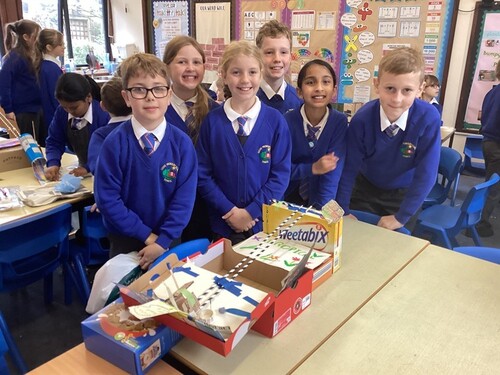
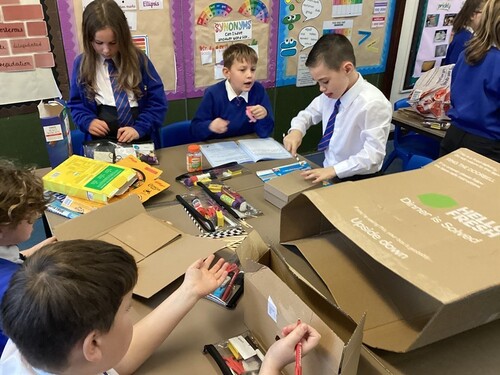
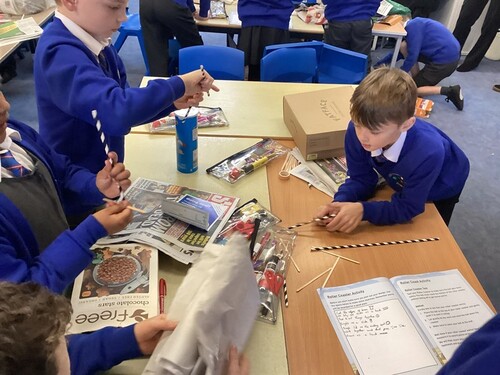
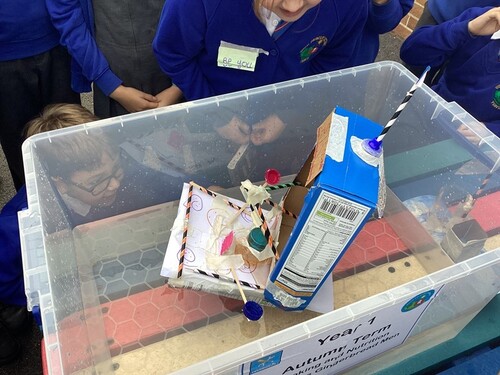
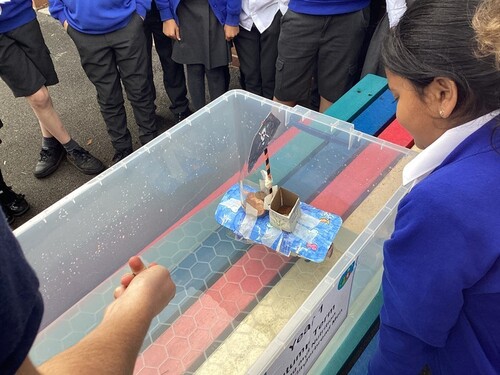
Year 5 enjoyed our RAF STEM day and created our own rockets to test to see how far they would fly. We had great fun!
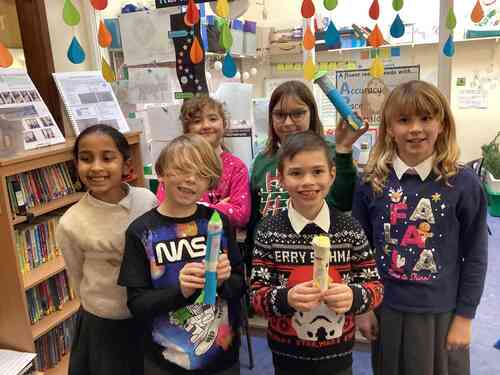
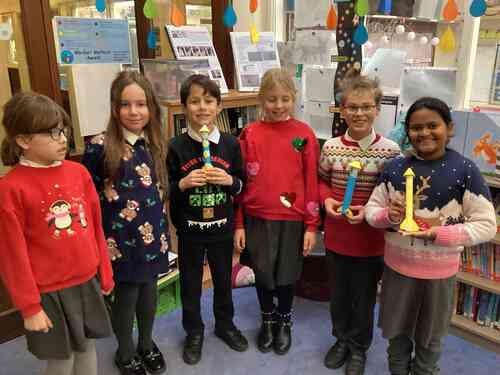
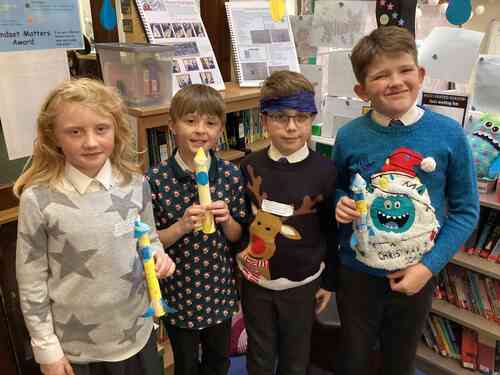
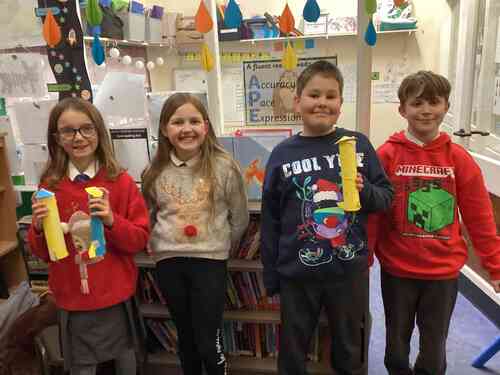
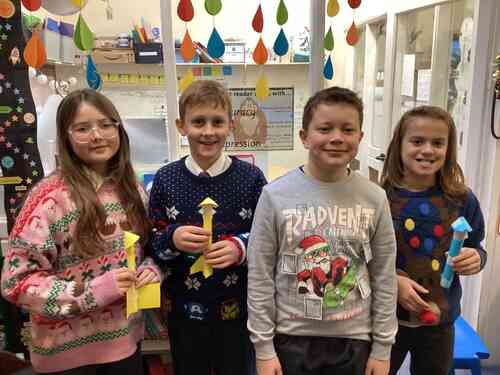
Take a look at our amazing homework that we shared across Class 11 and 12. We did a fantastic job and learnt lots of fascinating facts about South Africa. Well done and thank you for your hard work.
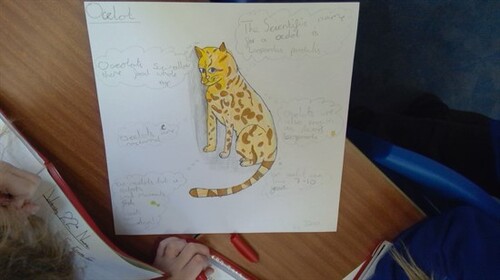
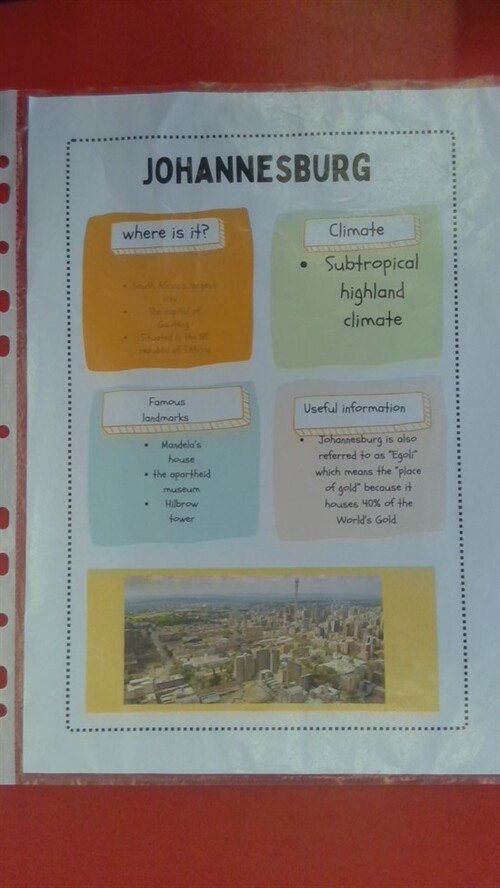
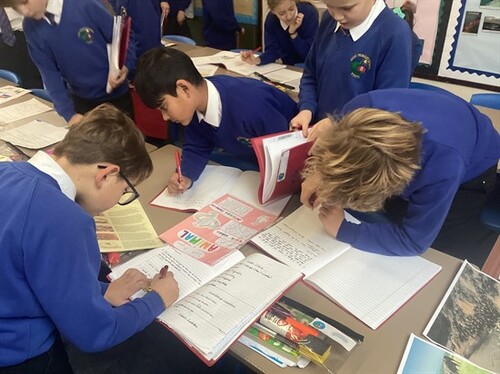
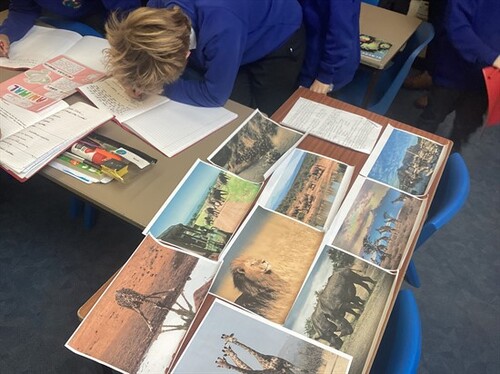
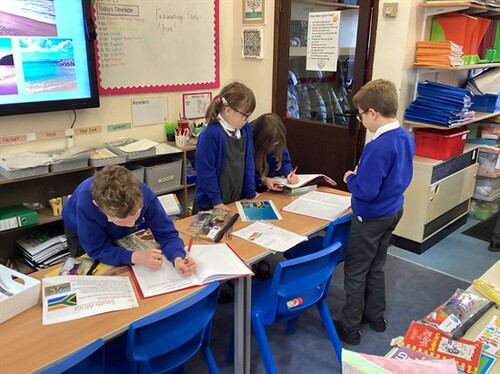
Year 5 enjoyed their Christmas Dinner- it was delicious!
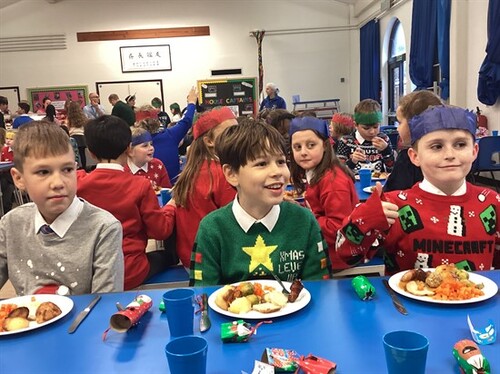
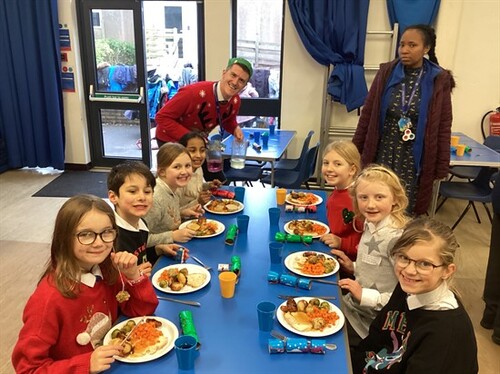
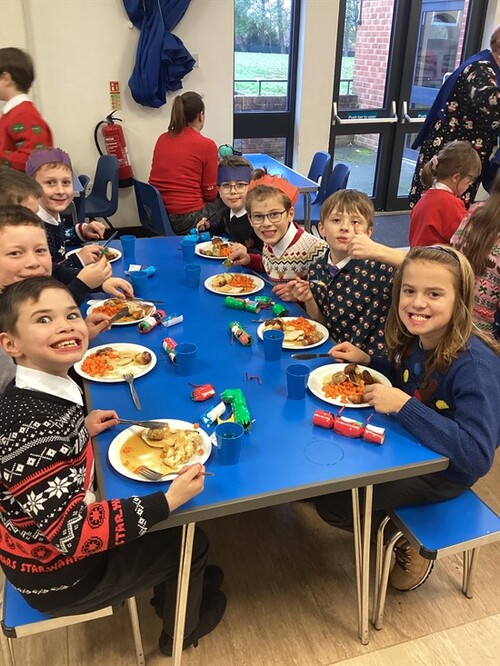
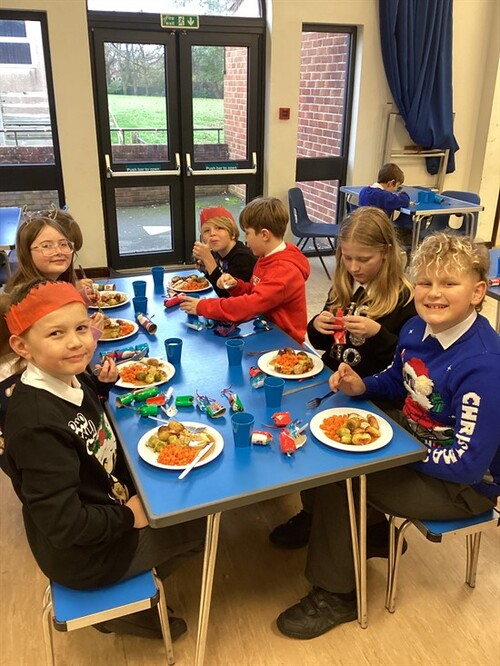
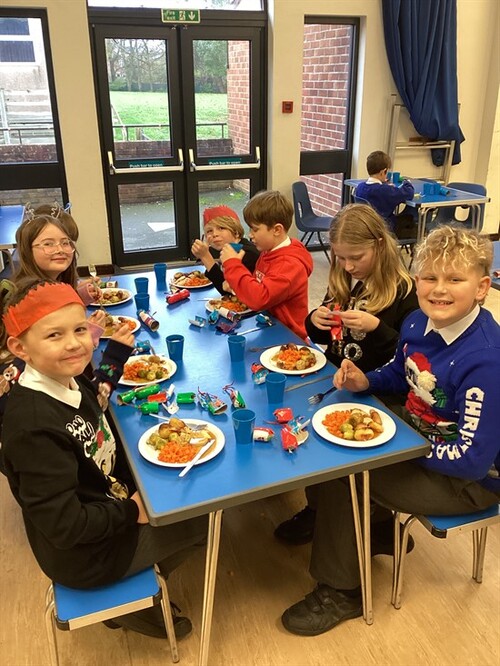
We studied a an African artist called Gakonga and practiced our painting skills to create our own pictures in his style. Some of these were displayed at our art exhibition while others are on display in the corridor for everyone to admire.
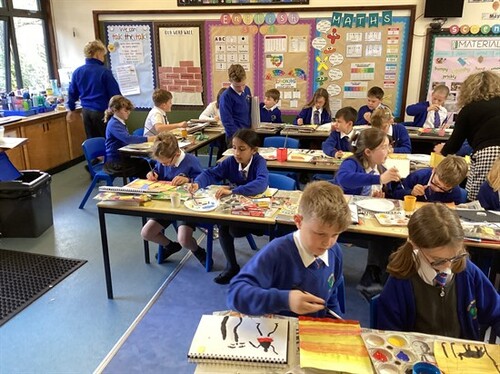
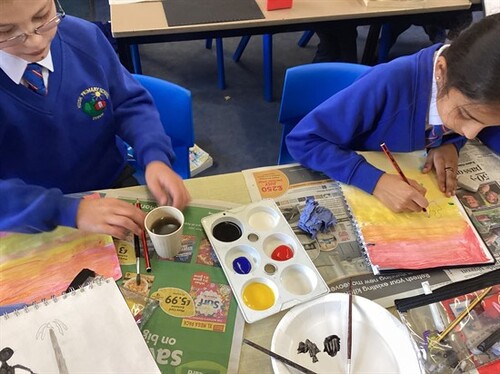
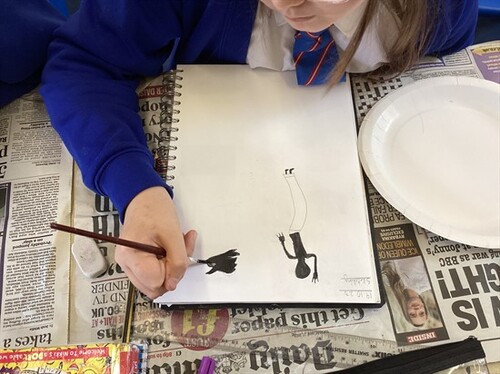
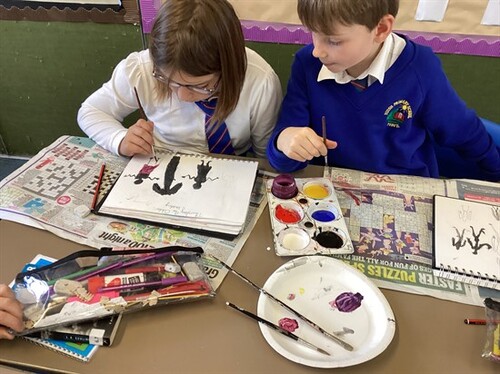
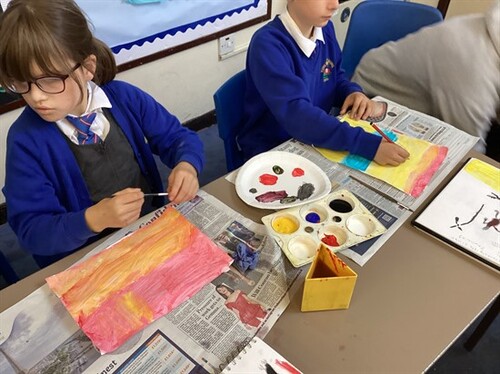
Across Year 5, we shared our brilliant Pick 'n' Mix homework pieces all about rivers. It was wonderful to see their hard work and new geography knowledge to support our rivers topic.
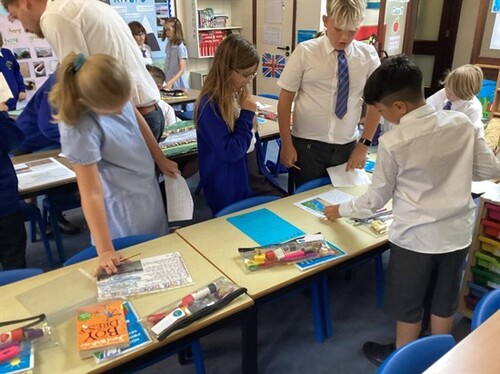
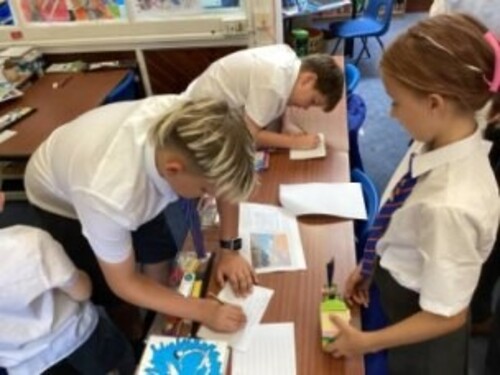
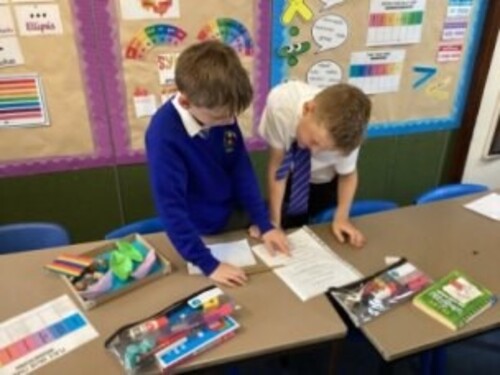
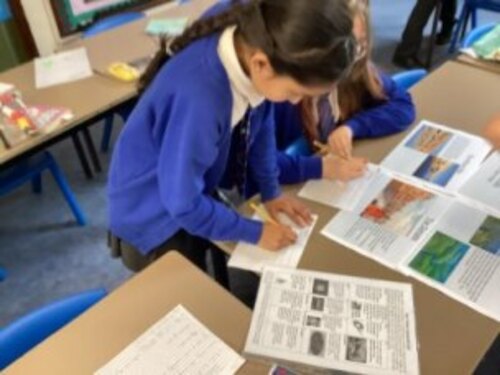
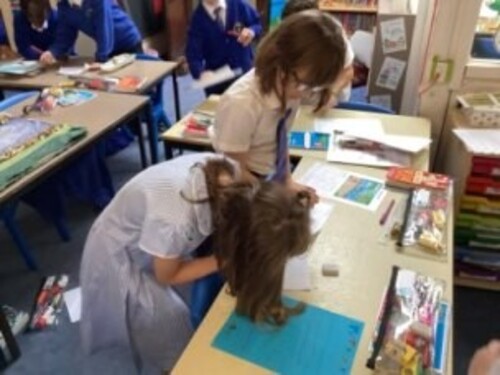
Over the last few weeks, we have been investigating materials and their properties. We sorted materials before carrying out tests on them. We used pipettes to test for permeability and absorbency; magnets to test for magnetism and electrical circuits to test for conductivity. Some of the results surprised us. We added these results to our mind maps. In the next lesson, we then thought about why specific objects were made of certain materials and how the properties made them suitable. We did a treasure hunt around the school looking at different objects.
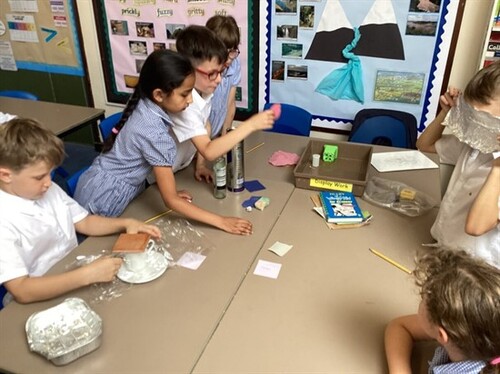
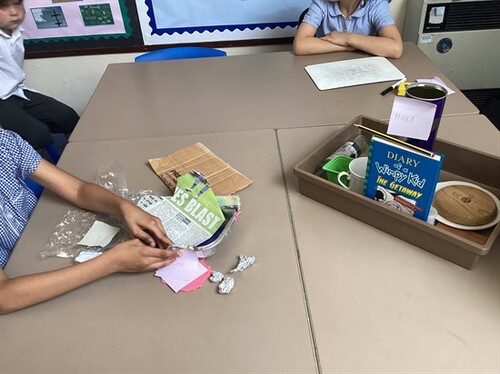
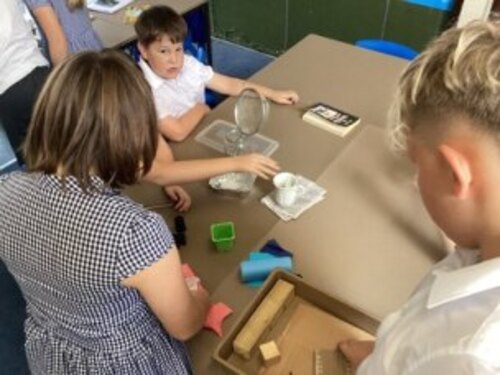
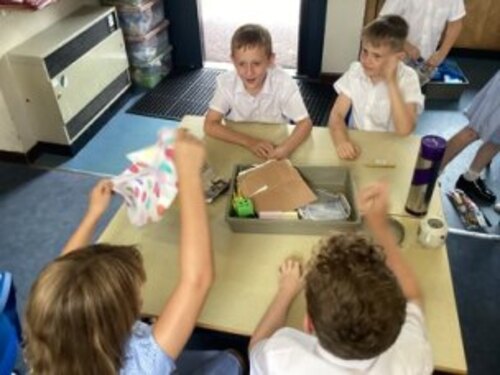
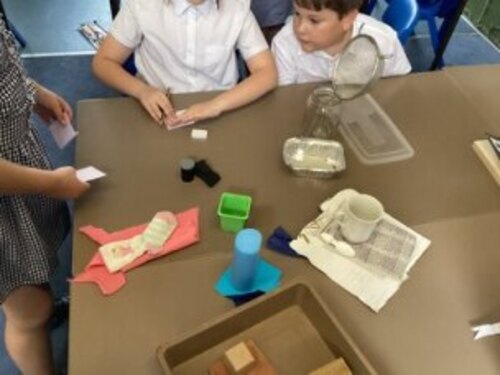
We were introduced to our new class text The Arrival. We immersed ourselves in role play to capture the feelings of the characters. This aided some powerful writing tasks.
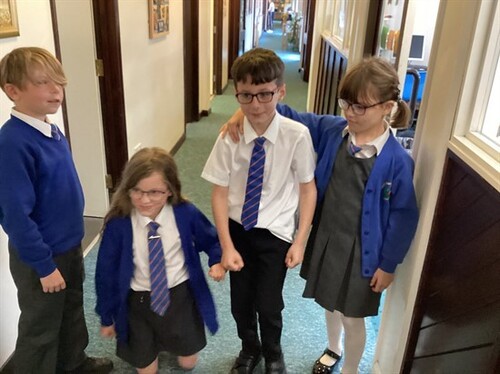
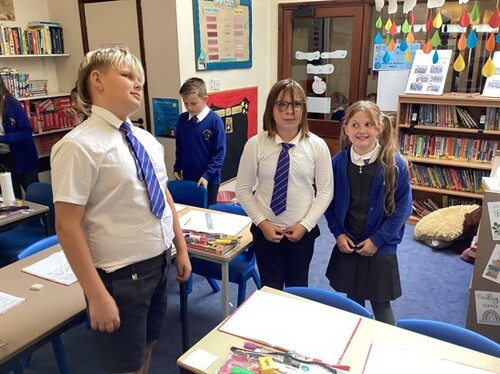
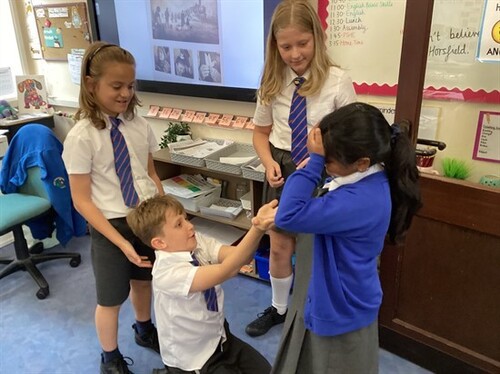
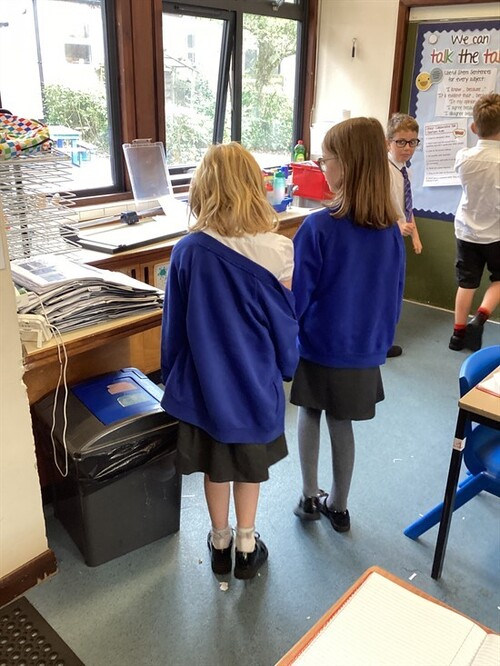
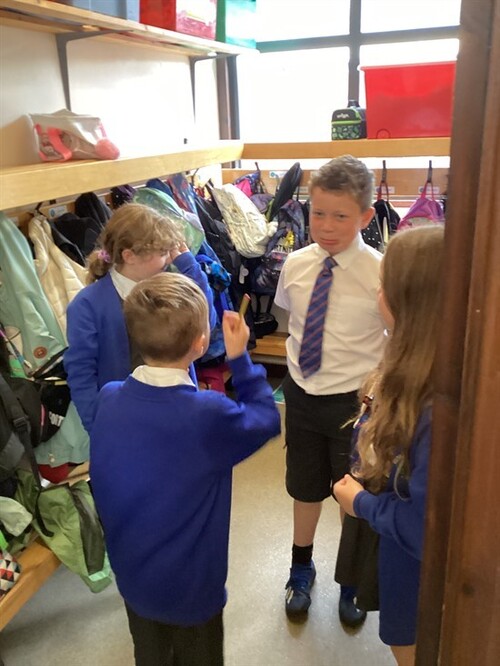
For our first week back, we studied abstract art and made our own abstract art pieces. We included sentences about ourselves so that our new teachers could get to know us more!
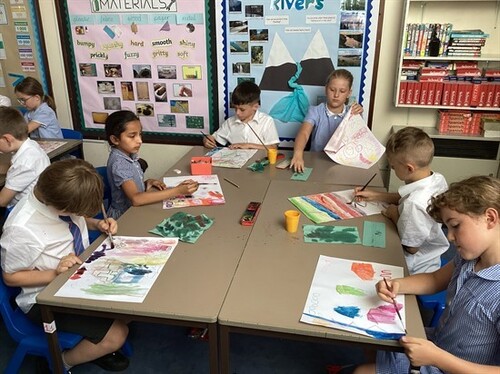
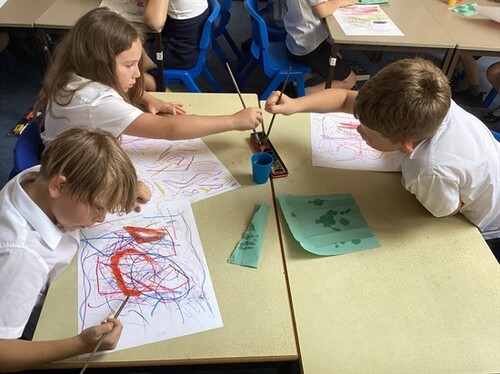
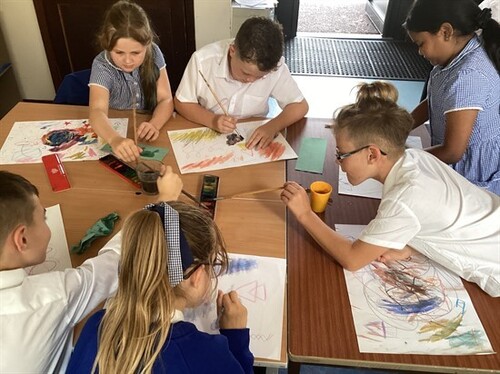
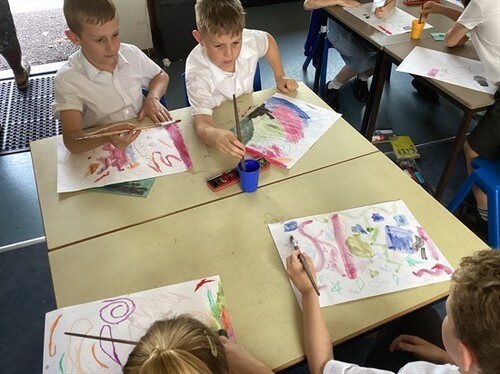
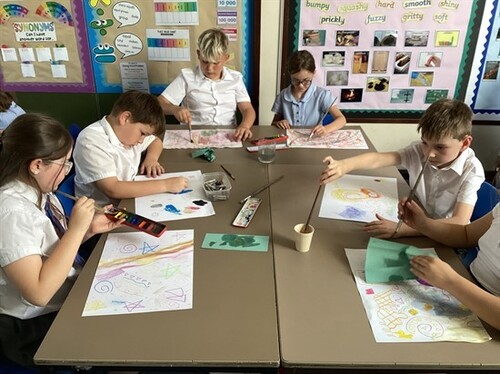
We are very lucky in Year 5 because we get to learn the clarinet for the entire year!
In our first lesson, we learnt about each part of the clarinet, how to make them, how to clean them and, most importantly, how to play them! Most of us were able to make a sound without too many squeaks! We are now able to take home our clarinets to practice.
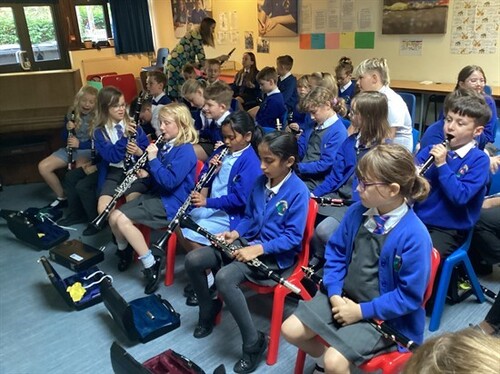
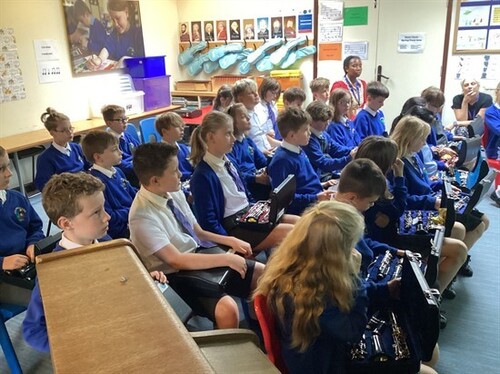
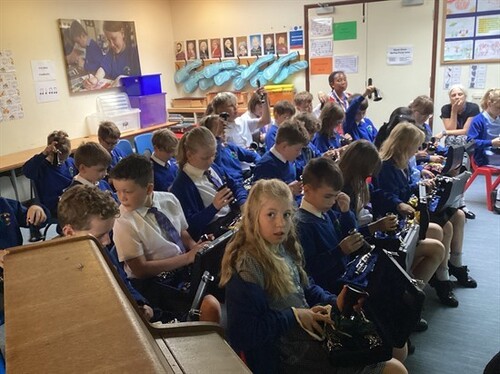
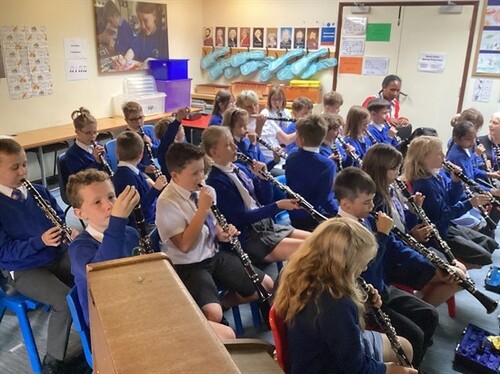
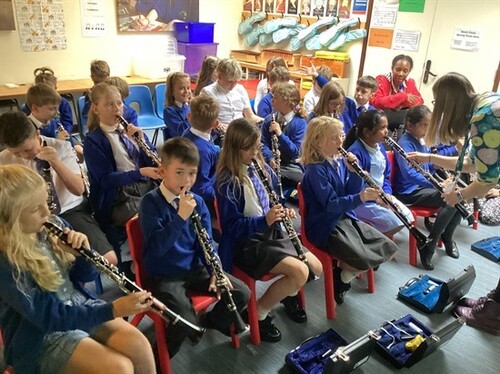
The children in Year 5 have been learning The Highwayman poem ready to perform in front of the school in an assembly. Auditions for the main roles were completed and the children worked on how to say each line using their knowledge of APE, using actions and small acting parts. They practicsed and worked hard to make the performance engaging and interesting and the final result is available in the film below.
The weather was much kinder to the children on Day Three and so year 5 were able to enjoy the high rope activities during the day. They also managed to enjoy some archery and finished with sporting activities. Below is a small selection(!) of the photographs taken!
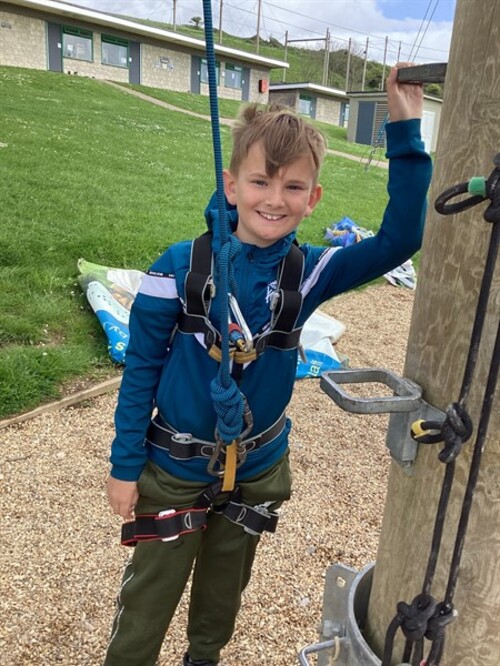
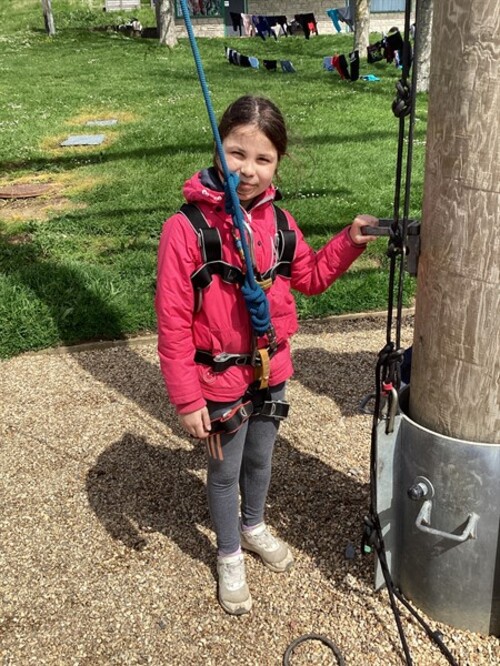
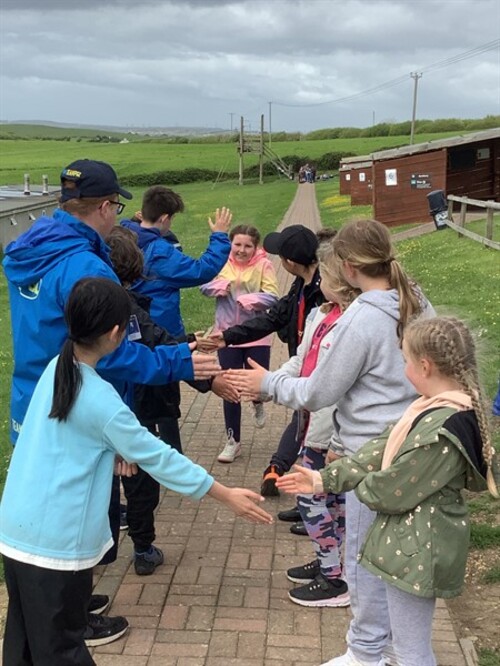
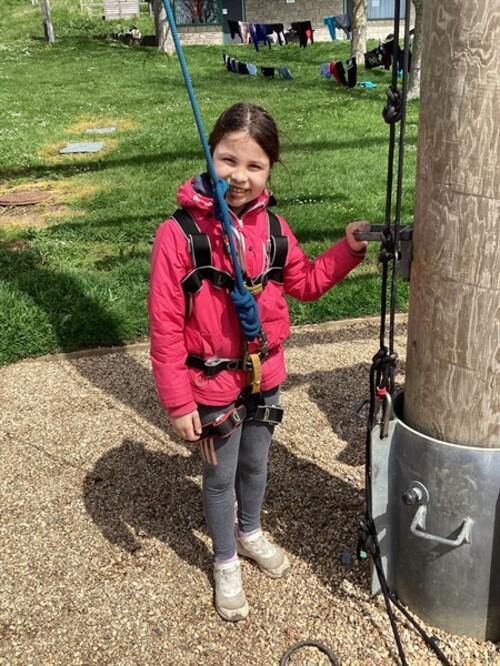
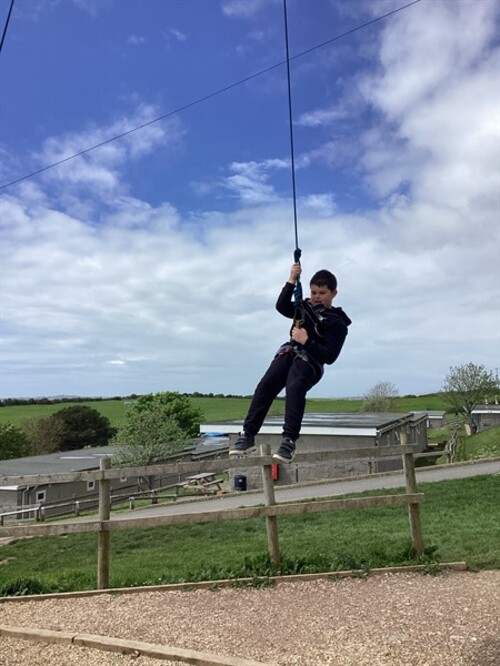
Year 5 have had a great couple of days and even saw the sun after a very rainy start to PGL. Day two (Tuesday) saw us take part in Dragon Boating wtith a 4 boat race and lots of fun games on the sea, a sensory trail completing obstacles while blindfolded and a beach walk where we made sea monsters and explored the shoreline. All the children are enjoying the food and had a fun first night sleepover with their friends.
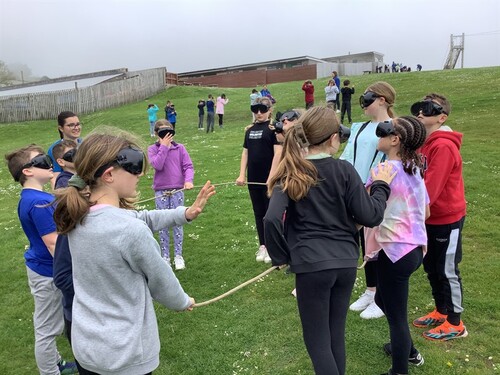
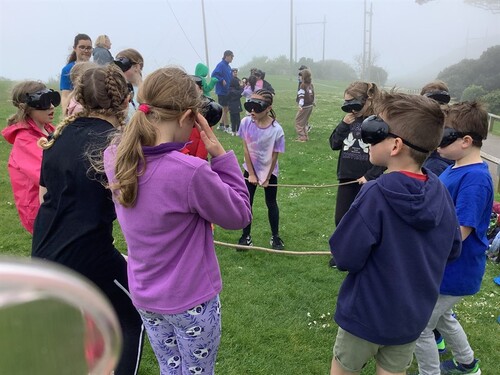
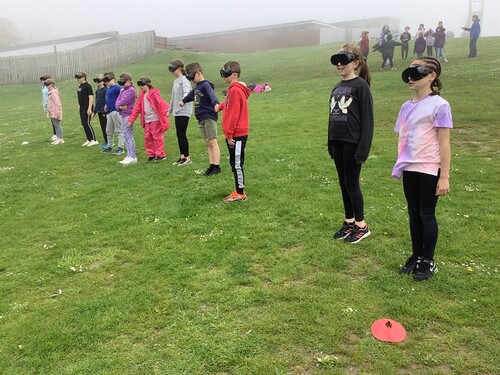

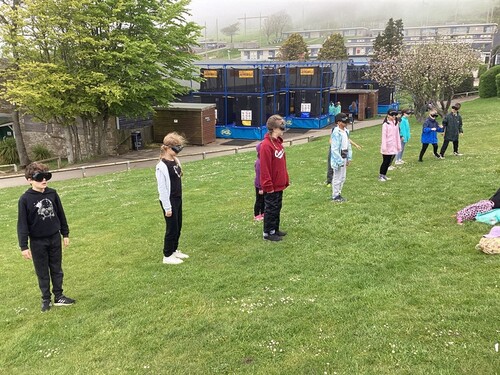
We went on a trip to Nine Springs! We were split into two groups and got involved in the history of Yeovil and some forest school tasks. We had so much fun and enjoyed the range of activities.
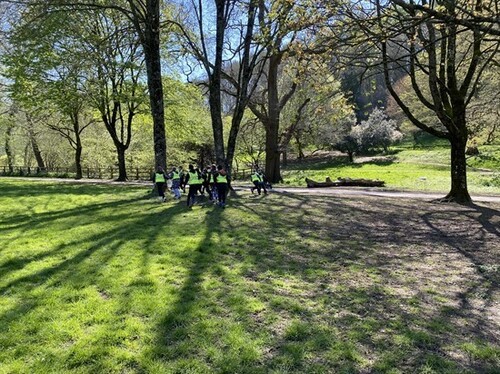
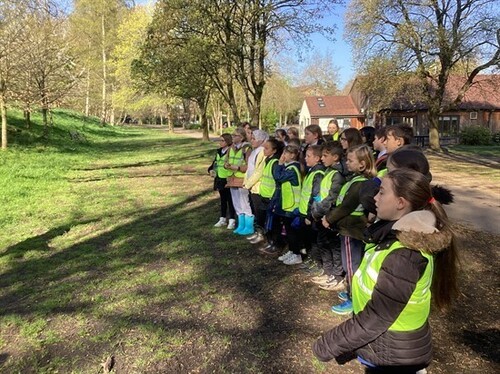
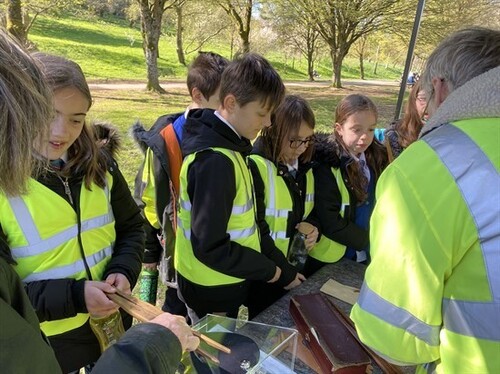
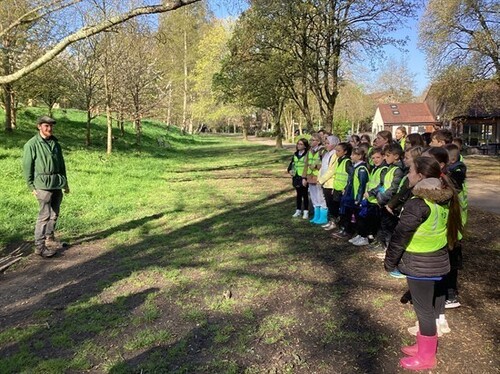
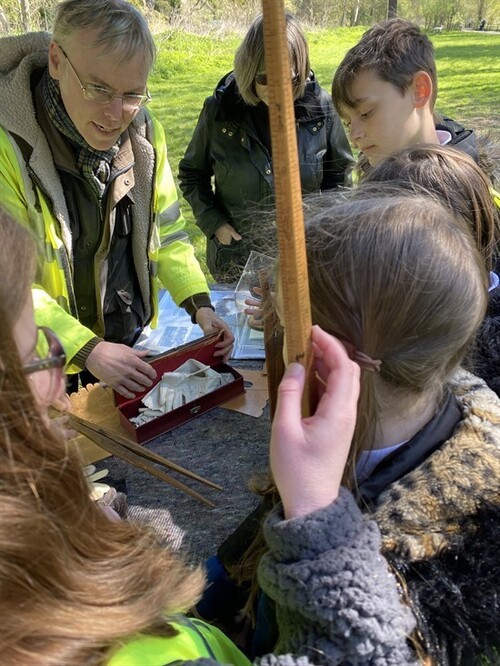
Today we celebrated the King’s Coronation! We made paper bunting to decorate our classroom which looked very patriotic. In preparation for our Tea Party Celebration, we decorated paper plates ready for our cakes. For our celebrations, we sang with the rest of KS2 in assembly. Then we sat outside with our Class 4 buddies and enjoyed the cakes and the sunshine. We then played a game of ‘Prince, Prince, King’ (just like ‘Duck, Duck, Goose’). We really enjoyed celebrating the coronation.
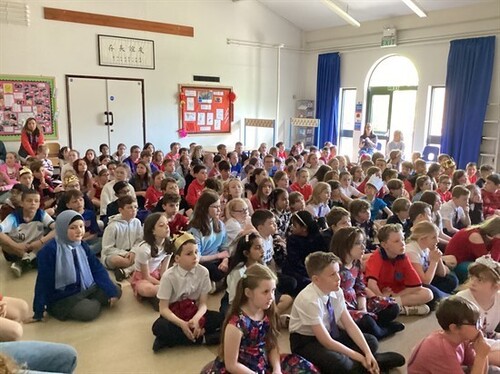
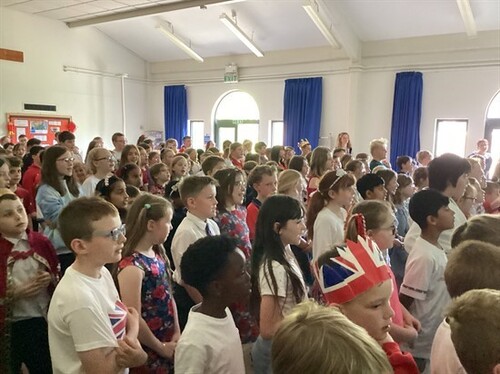
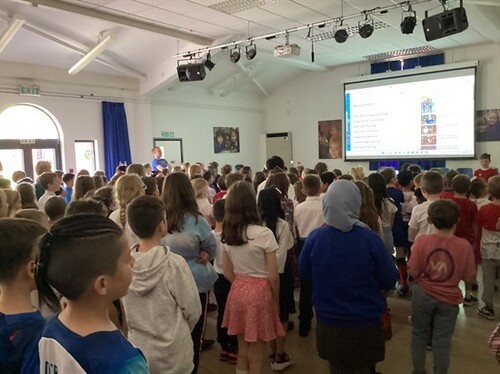
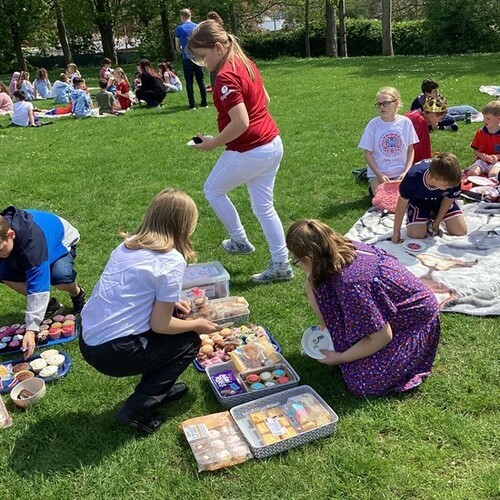
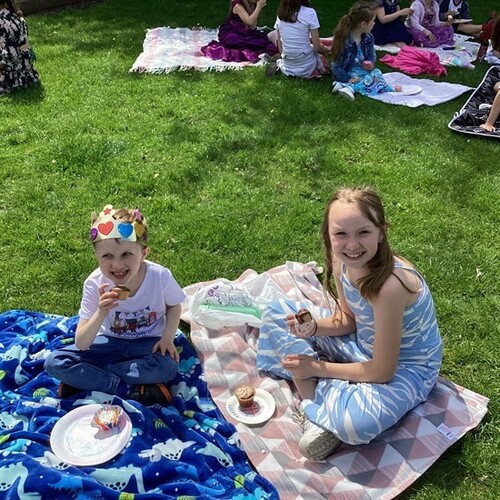
Here is a Class Photo of Class 11 showing their favourite books. We also did a book share with Class 4.
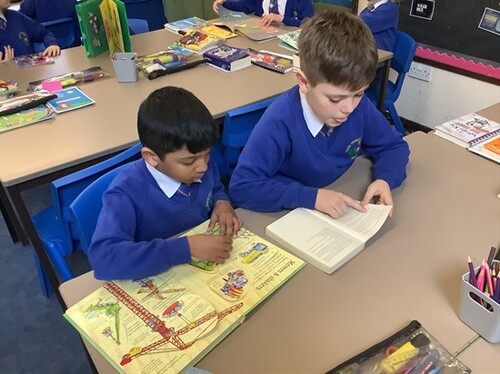
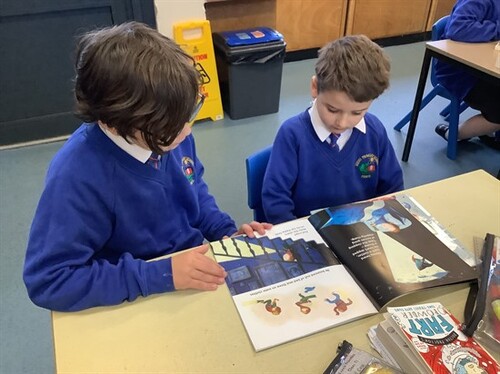
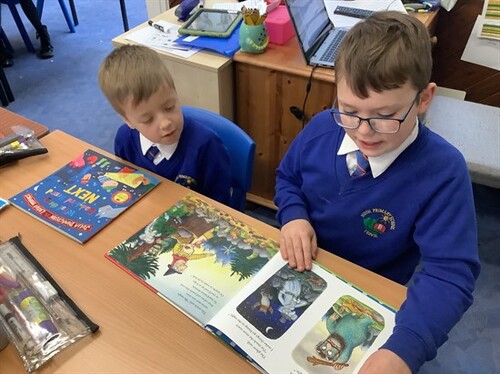
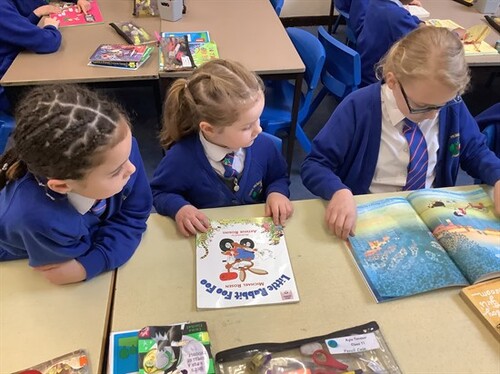
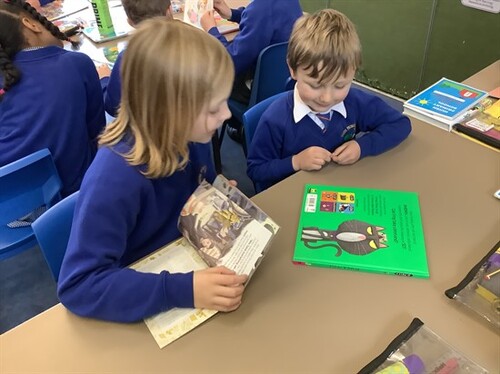
For Year 5’s International Day, we were able to start our Geography topic as it was all about India. Karthik shared some traditional clothes and information from his family from India. We researched where India was in the world using atlases, before creating our own Indian inspired henna hands.
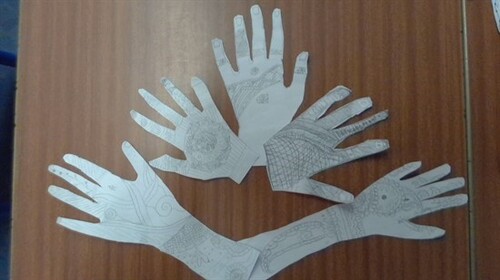
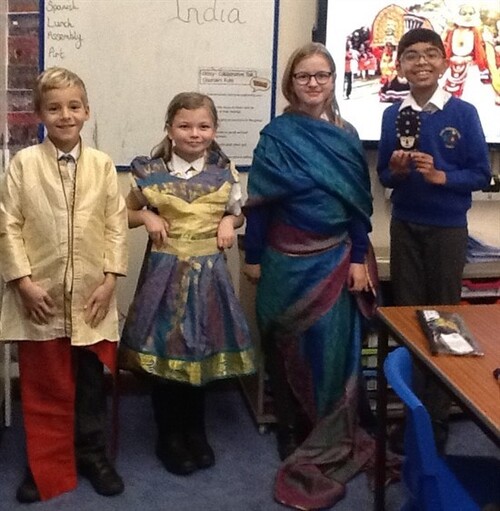
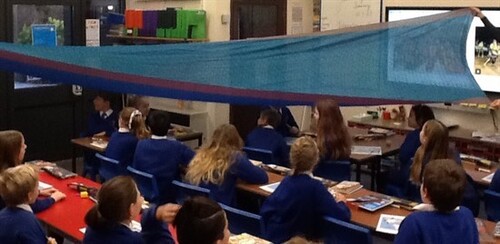
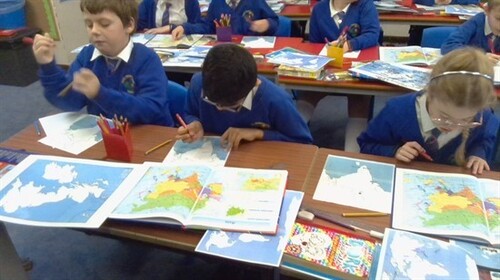
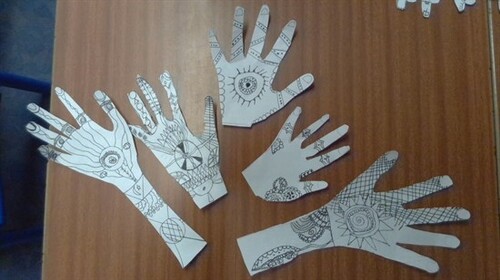
Today we celebrated Children’s Mental Health Week with Class 4! We used the theme of ‘Let’s Connect’ to work with the Year 1s to complete a task. Following the clues around the school, we had to find all of the letters to make a word. The word that we made was… WELLBEING! We were so happy when we found the answer and celebrated with our partner. We used our teamwork skills and our friendly smiles to make the Year 1s comfortable and happy!
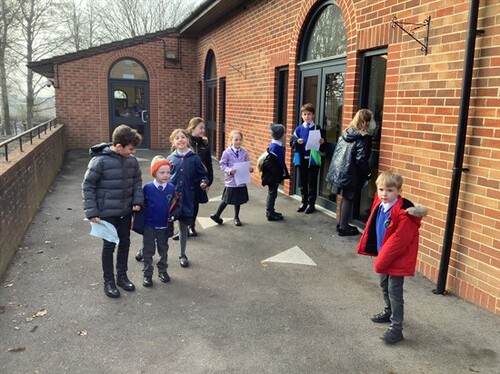
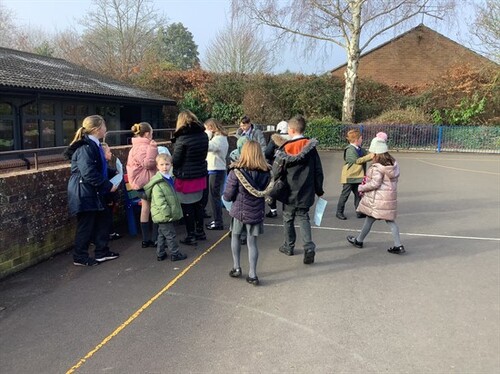
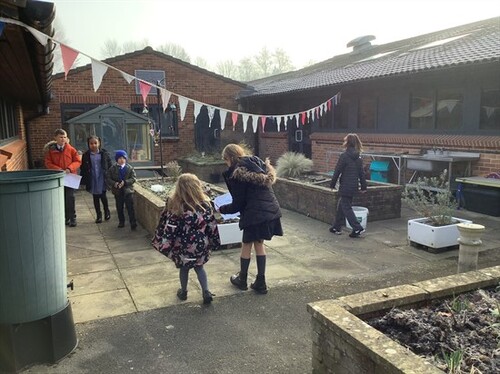
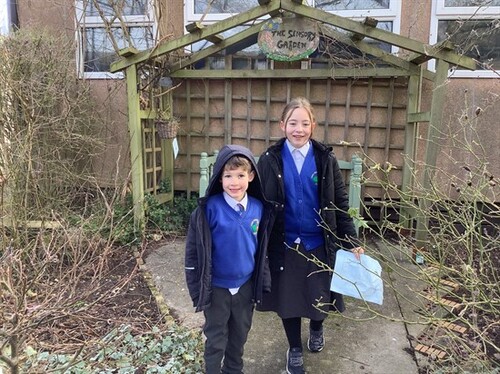
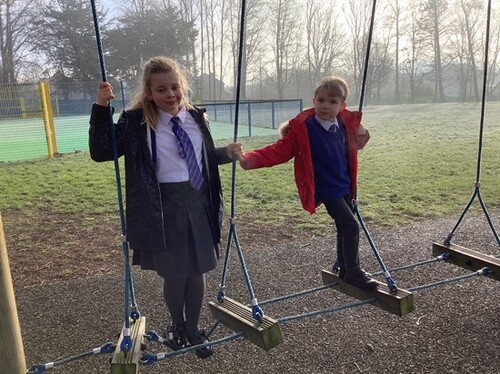
Year 5 have been out enjoying the snow!
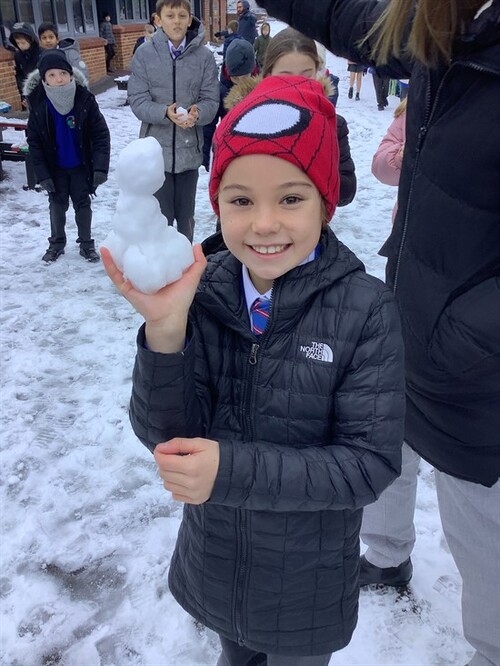
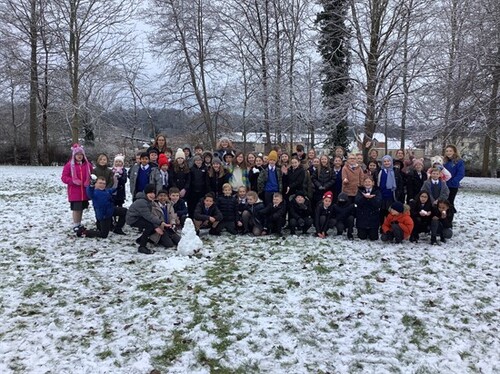
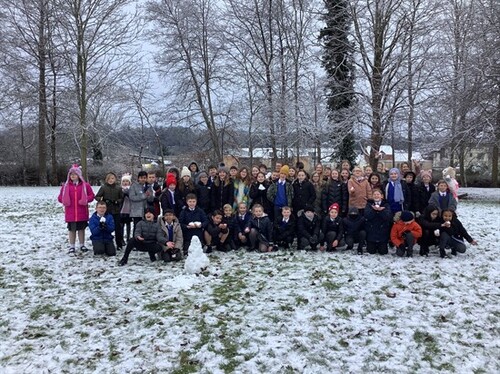
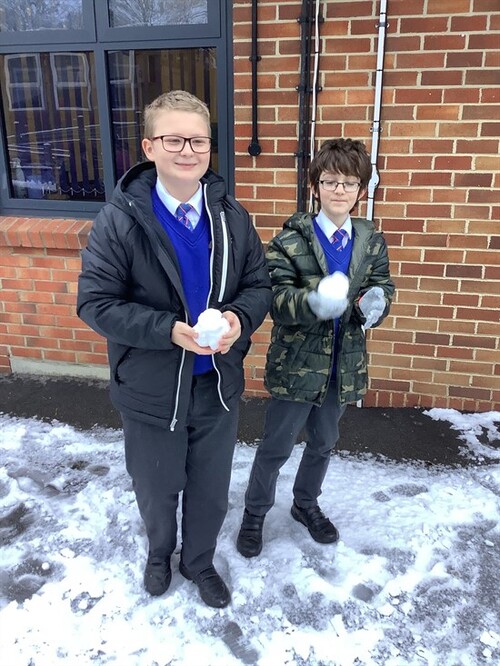
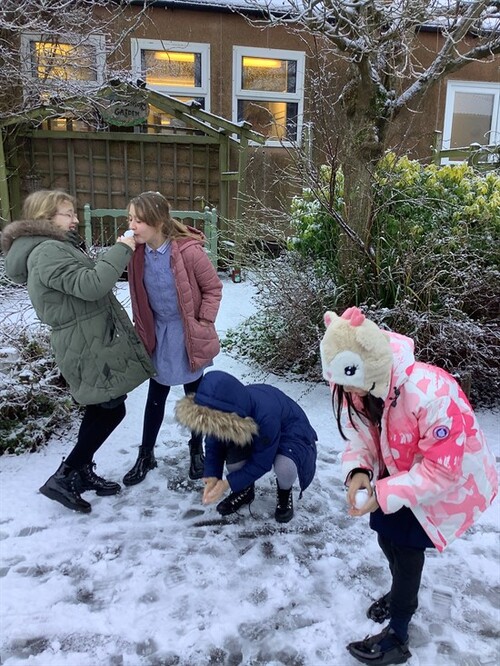
Year 5 enjoyed their christmas dinner!
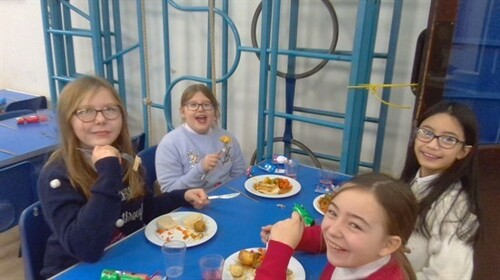
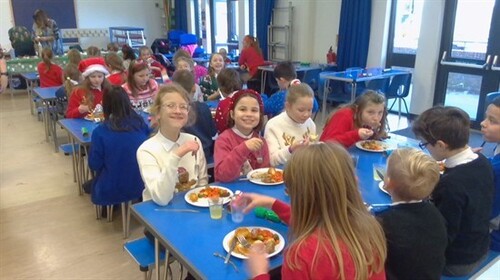
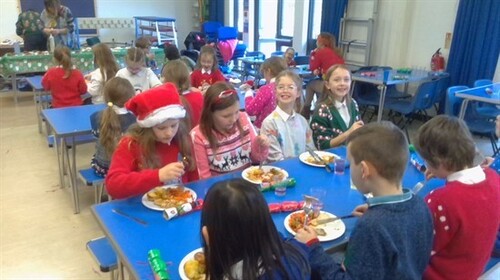
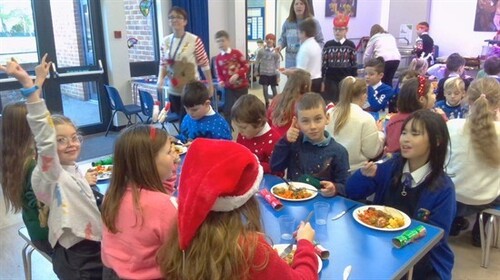
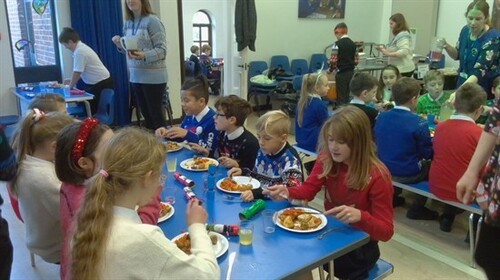
In Geography today, we looked at the Year 5 pick and mix homework for our topic ‘Rivers’. We explored both classes and wrote down 3 facts that we found out from someone’s homework.
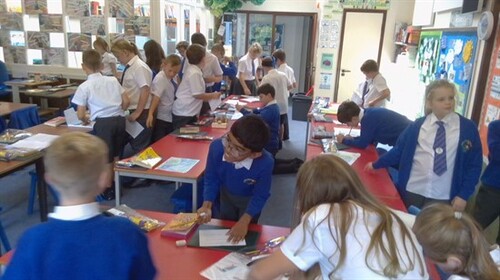
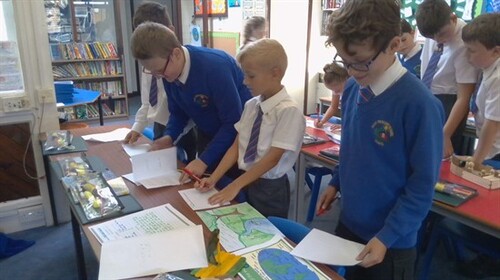
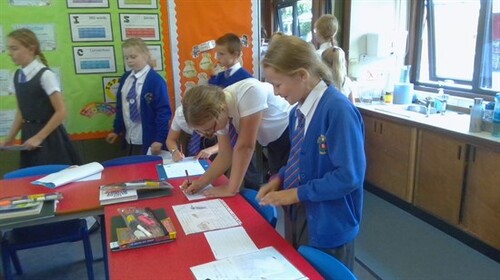
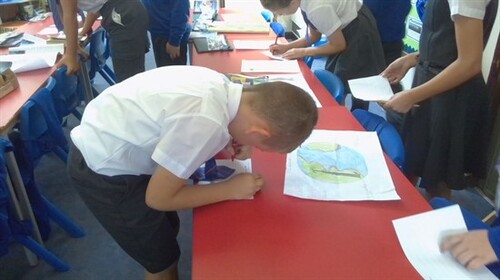
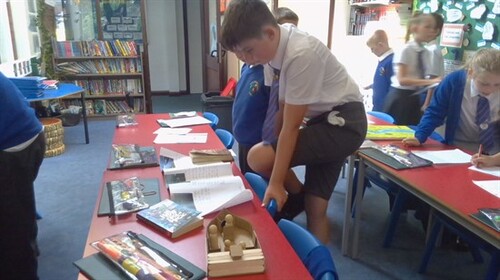
In Computing, we talked about internet safety and sharing information online. Firstly, we used string to see how we are all connected to the internet (such as playing online games, texting, emailing, facetiming etc.) We then watched a video telling us what person information we should not share online including:
• Our full name
• Address
• Phone number
• Email address
• Our school/school uniform
• Passwords
In our Science lesson, we experimented with materials to see if they were magnetic, waterproof and a conductor of electricity.
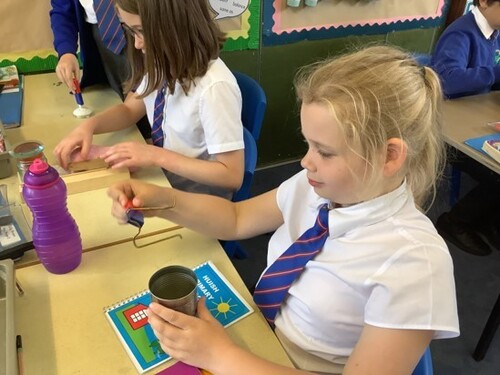
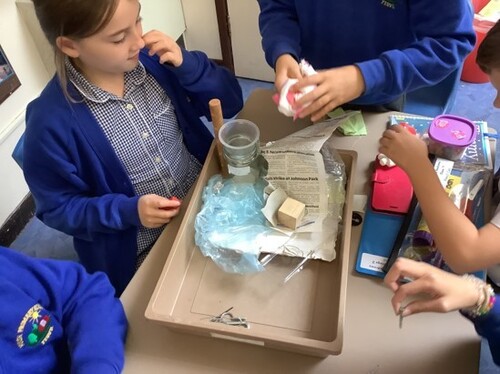
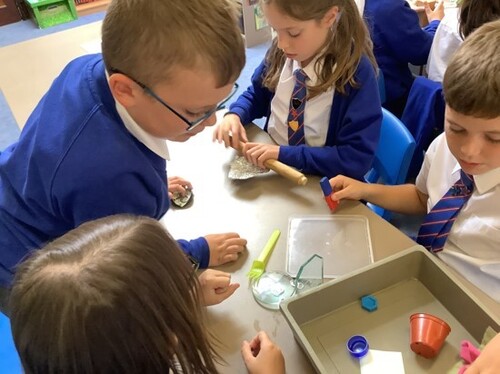
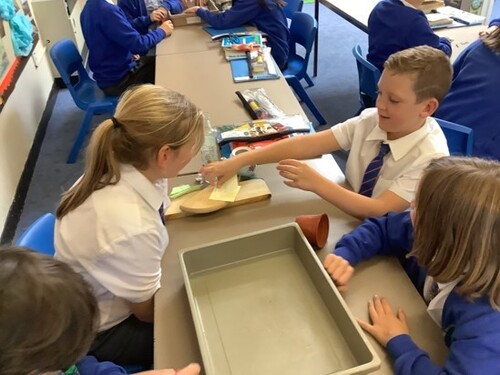
In Art, Year 5 have been busy making elephant sculptures using modroc linked to their India topic. We looked at images of painted elephants at the festival in Jaipur and experimented with different patterns and designs inspired by these in our sketchbooks. We made armatures for our sculptures using newspaper, cardboard and masking tape before covering with Modroc – a type of plaster-bandage which sets hard. We transferred our designs on to our sculptures before painting.
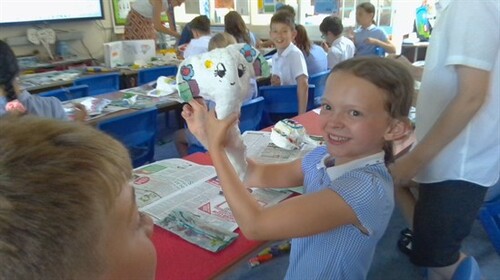
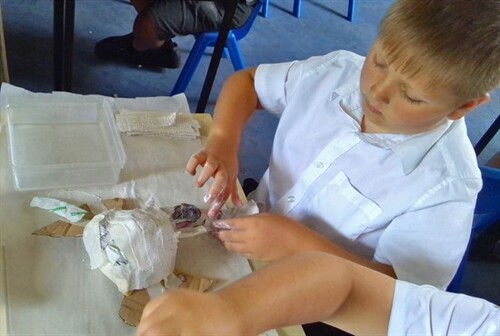
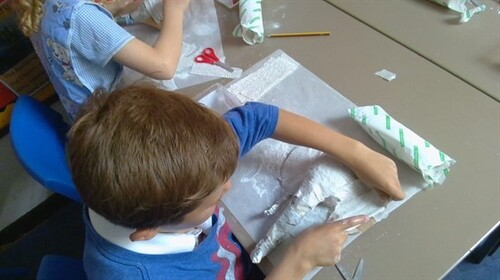
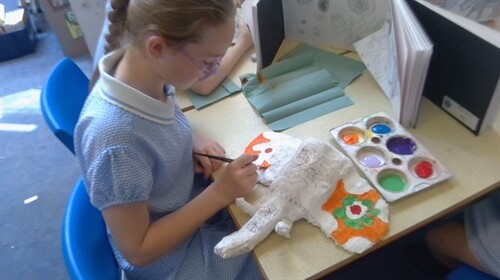
We had a brilliant week at PGL where everyone faced their fears in some form and had a fantastic time. It was lovely to see how everyone shone and you should be very proud of all you achieved. The photos are testament to this.
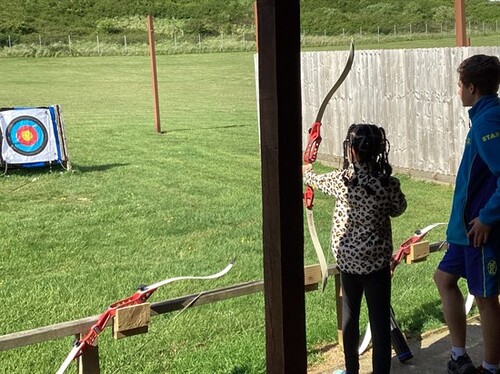
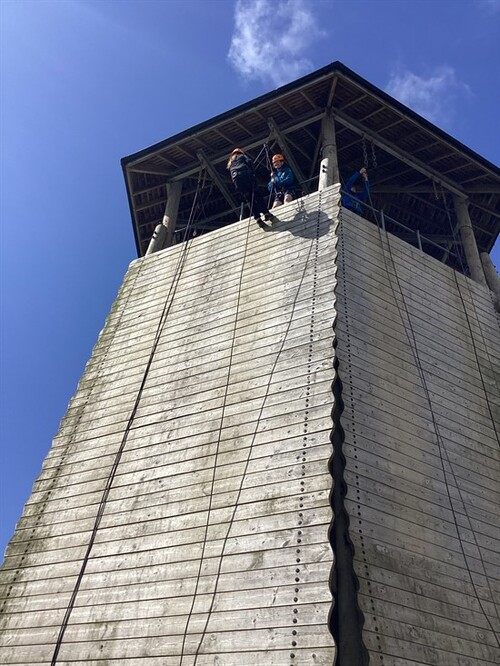

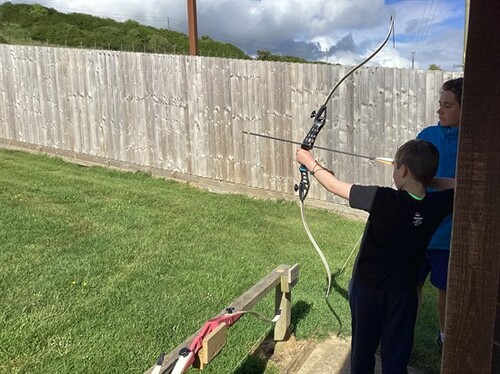

Everyone is having a great time! Here are a few photos from the first couple of days.

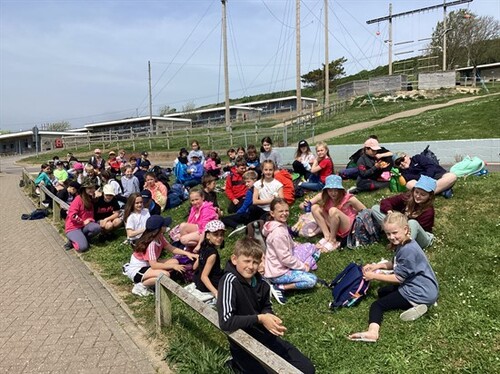
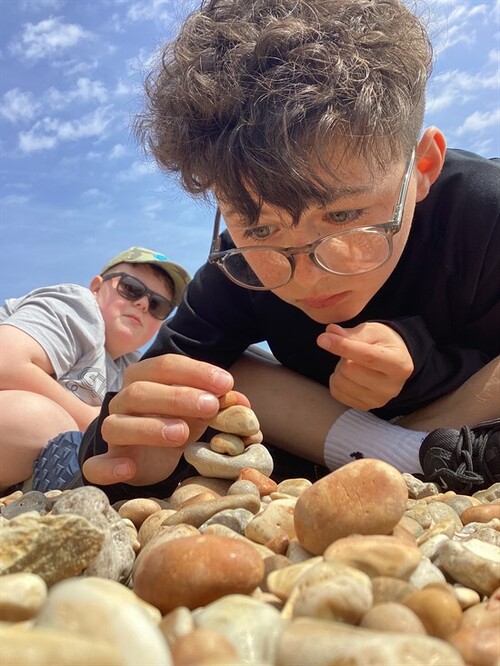
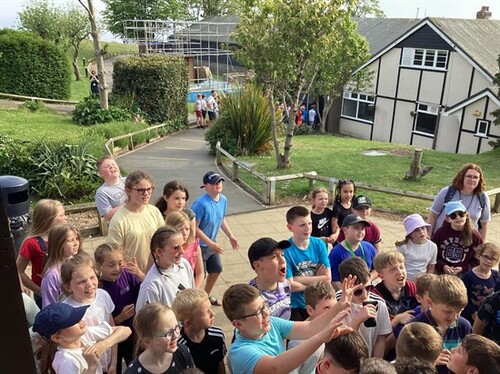
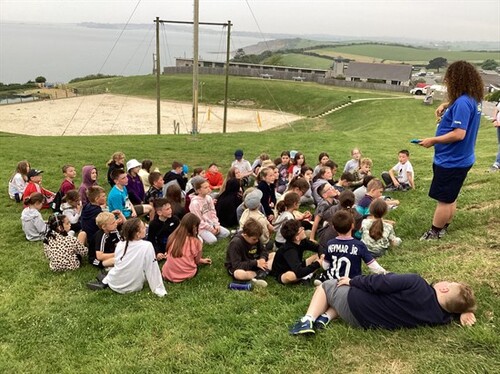
We had an excellent day celebrating our second Earth Day on Wednesday with the children debating and thinking about the need for immediate change. To begin the day, we started looking at the recent COP26 summit and the fragility of the agreement that was agreed by the world leaders. Following this, we wrote a letter to Marcus Fysh asking him a series of important questions about climate change and what his plans were for the local area. In the afternoon, the children designed a piece of environmental art using colour to convey emotions.
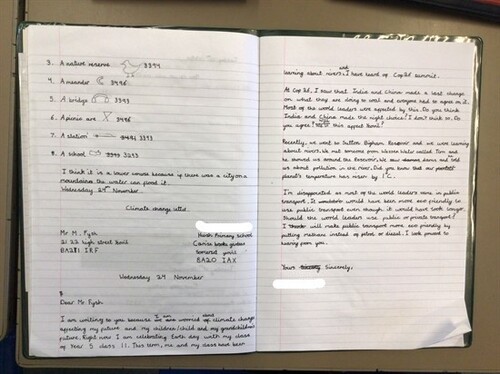
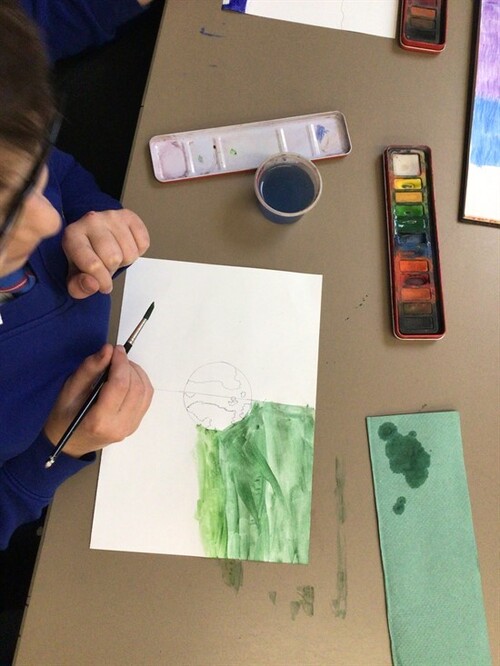
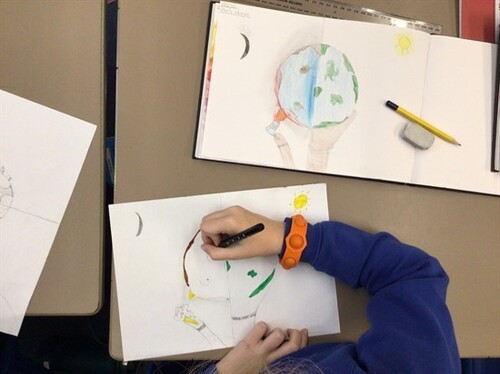
We went to the Wessex Water site out at Sutton Bingham. There we met Tim, who talked to us about rivers and the water cycle, explaining how Wessex Water work with the natural environment to get enough water for the local area. He talked to us about the different processes the water goes through to be cleaned, telling us that most of our water comes from the reservoir. Unfortunately we were unable to visit the water treatment centre, but we did get to walk out over the dam and explore the surrounding area.
In English we are currently studying a book set in South Africa called ‘Journey to Jo’Burg’. Within the book there are some brilliant descriptive paragraphs about the local landscape and we wanted to use this within our art lessons. The children first researched a number of different landscapes and then we began to use water colours to try and blend the incredible colours of a sunset over the savannah. We then started to look at an African artist called Naomi Gakunga who uses bright colours on black silhouettes to symbolise emotions and feelings. Once the children had practiced this style, they added it to their water colour background to create some beautiful African art.
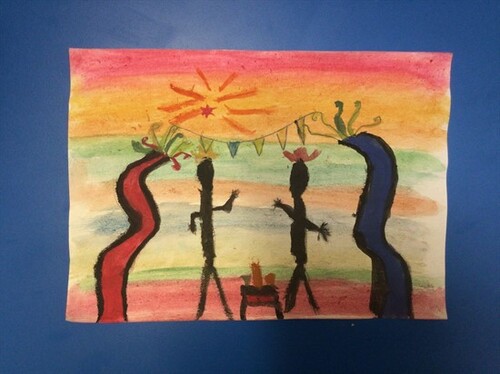
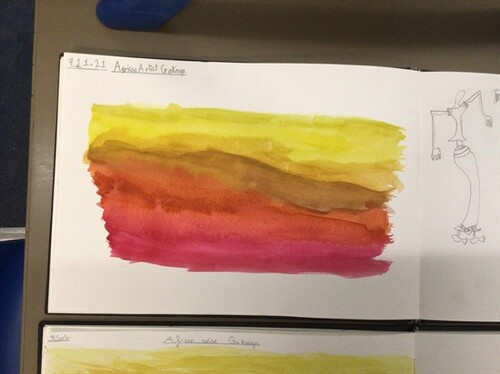
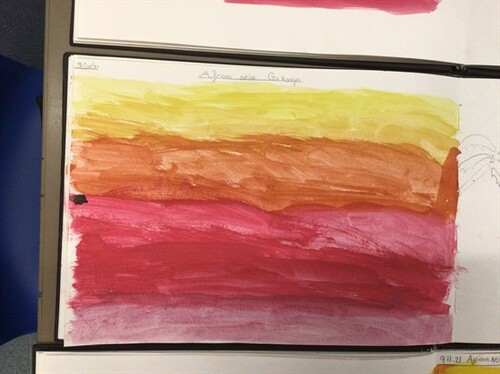
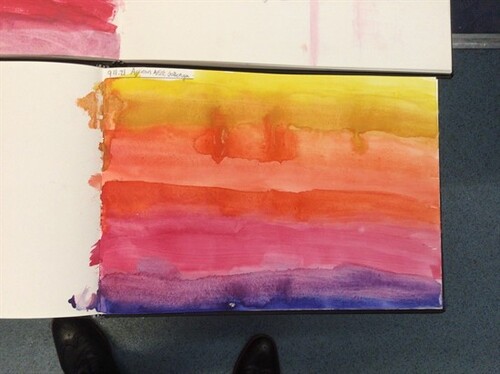
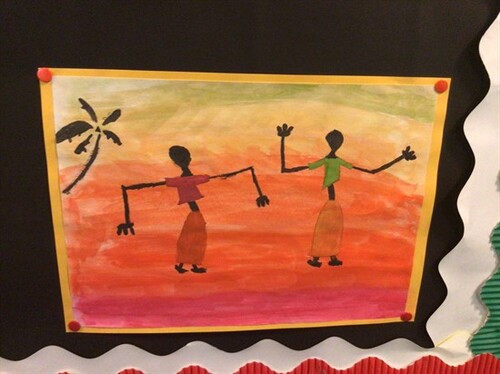
Today, we looked to deepen our understanding of factors and multiples through a series of reasoning tasks. For their first challenge, the children needed to try and build a ‘factor and multiple chain’ using a 100 square. Each number could only be selected once and it really made the children think about the variety of multiples and factors such numbers have. Chloe and Isiah worked brilliantly together to construct a chain with over 40 factors and multiples!
For their next activity, using the same principle of factor & multiple chains, the children had to work in pairs to try and answer a series of reasoning questions. These were designed to really assess how well the children could explore this relationship and think about which factor or multiple would best fit in each chain.
It was also fantastic to hear the children using the STEM sentences we’ve been practising this week. For example, ‘I know that 6 is a factor of 18 and that 18 is a multiple of 6’.
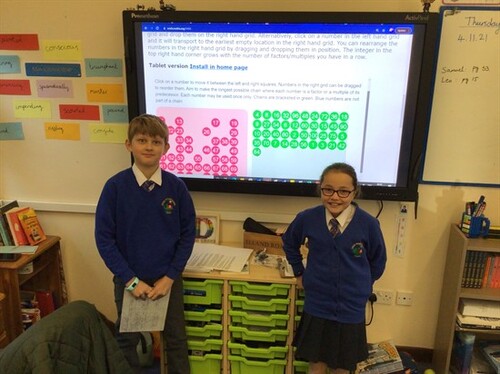
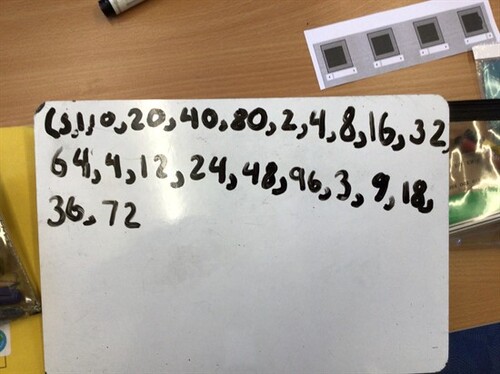
This week we were set the challenge of imagining we were in a desert island and needed to find a source of drinking water, but both were dirty, and we had to ensure that neither was salty water.
We made a filter using filter paper, sand, gravel and stones and passed each sample through it. We left a small sample of each filtered water in the windowsill to evaporate and check for salt. We discovered that Sample A had lots of salt in it and would therefore not be suitable to drink. Sample B, was salt free but we would need to boil it before drinking to remove any bacteria.




We have now started our brass lessons and are enjoying taking our instruments home.
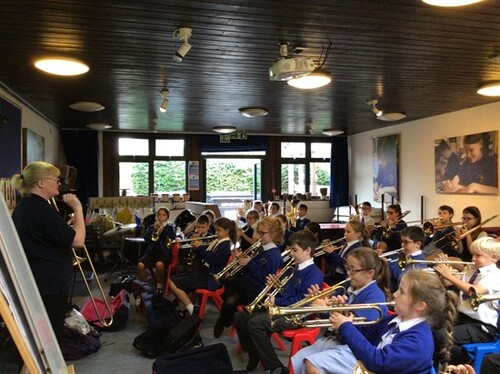
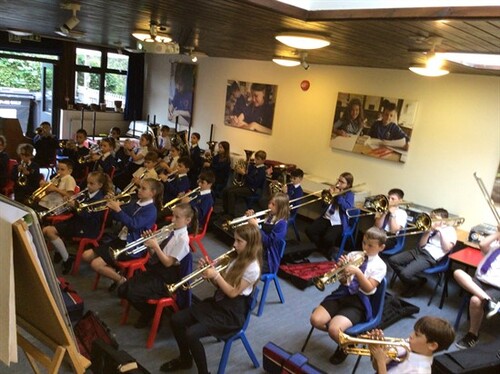
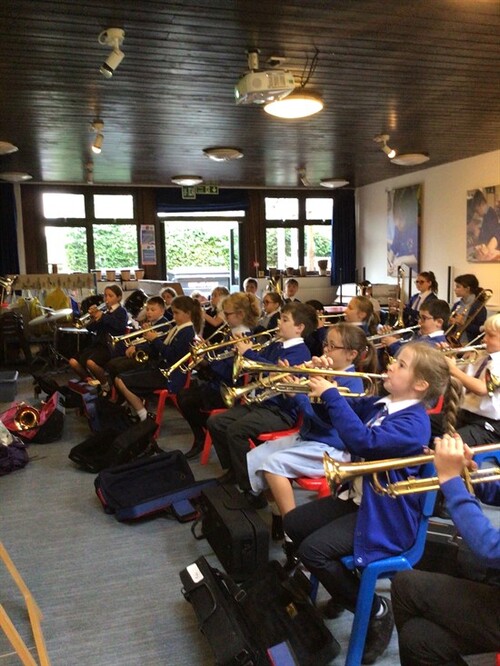
Over the last two weeks in science, Class 11 have been learning about and investigating the solubility of a range of materials in water. Their experiment was split into two parts, firstly we wanted to find out what materials were soluble or not and secondly we then wanted to investigate how the temperature of water could effect the speed in which materials dissolved and became a solution.




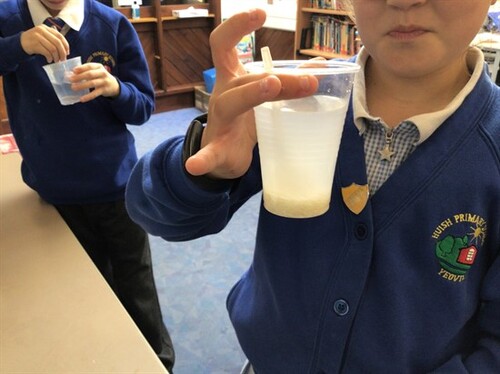
Over the past few weeks, we have been working through our addition and subtraction unit in lessons and learning about a variety of strategies that can be used to answer questions. To help deepen their understanding of exchanging, we used place value counters and grids to physically complete this process and provide the children with an opportunity to ‘talk maths’. Following this, we began to explore a series of problem solving and reasoning questions and have spent time looking at how the part-whole model and comparative bar model can be utilised to help answer these questions.
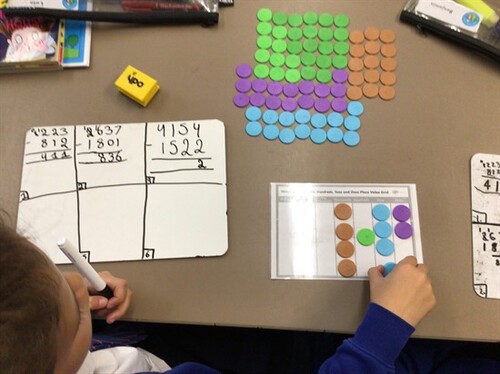
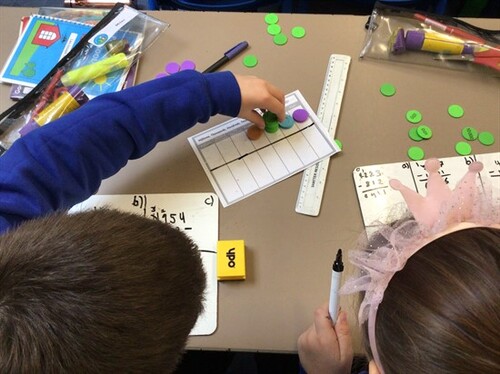
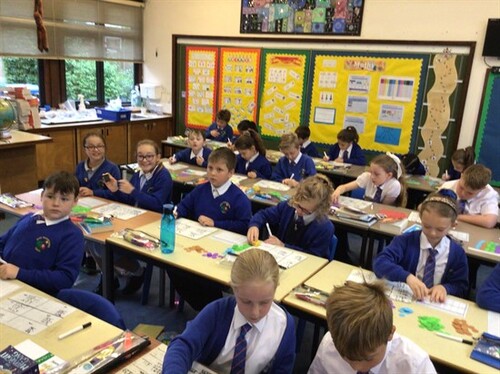
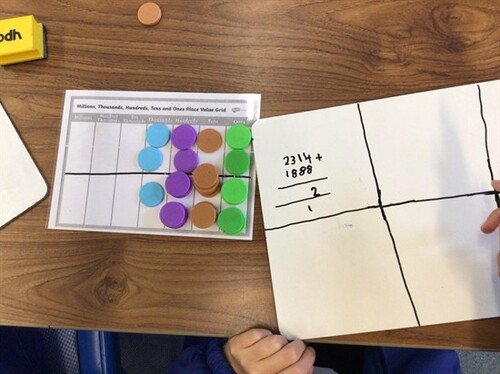
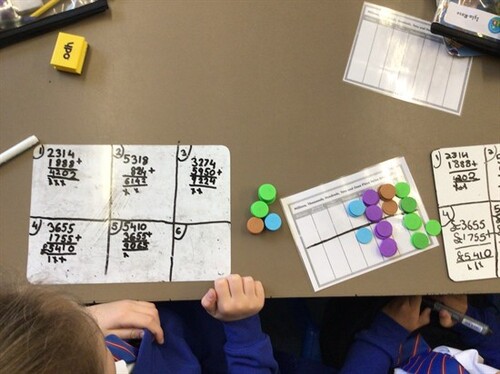
We spent a lovely day at The Bear Trail near Exeter. The site has a very muddy obstacle course that we were all able to take part in. We spent the morning in our groups tackling every obstacle – some were high, some were wobbly, most were muddy! After lunch we had the chance to go and explore the course on our own – the favourite was definitely the giant slide that finished in a huge puddle of muddy water! Some of us enjoyed lying in the mud and covering our faces in it. We all had a great time and got rather grubby.
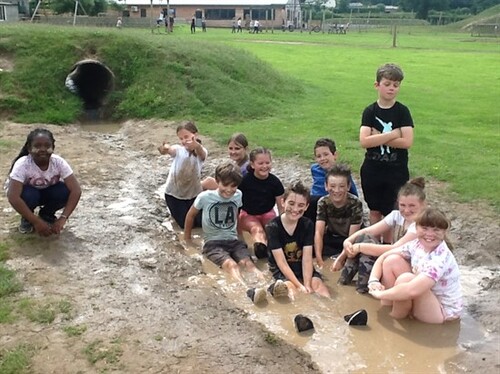
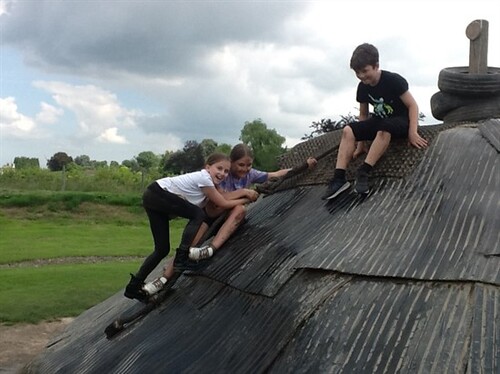
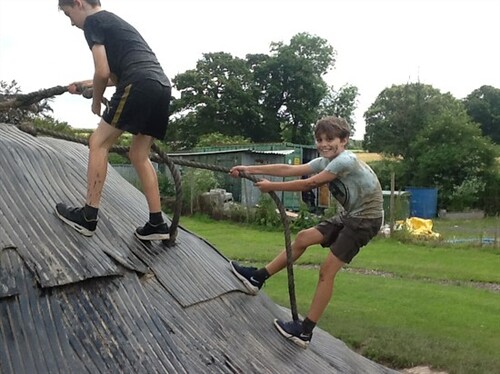
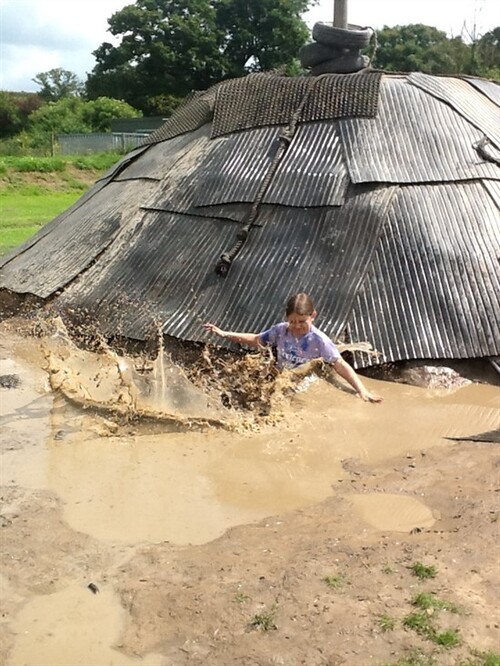
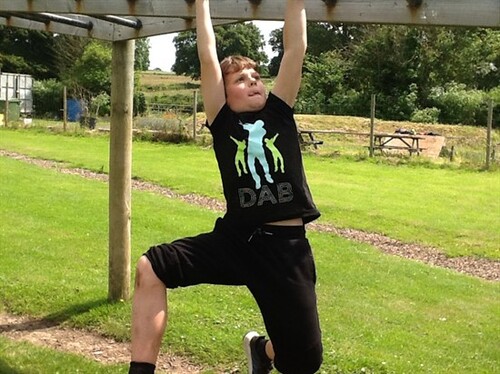
We shared our Highwayman narrative pieces of writing in pairs.
We took this opportunity to critique and praise each others’ work, and to give us some reflection time before we edited.
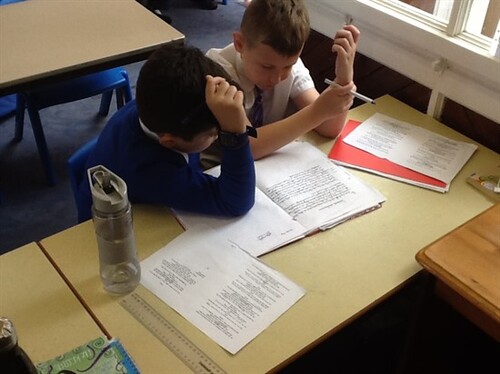
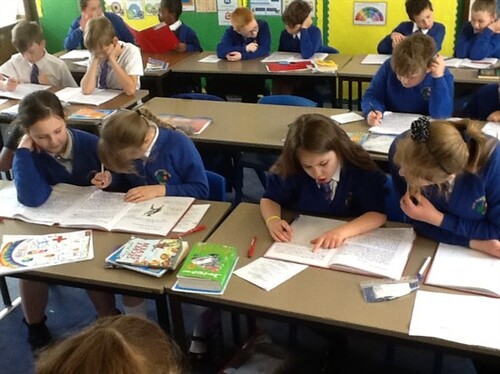
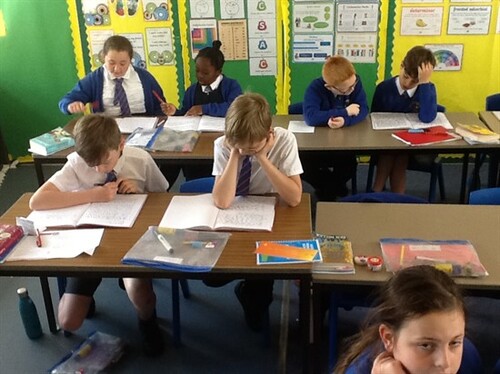
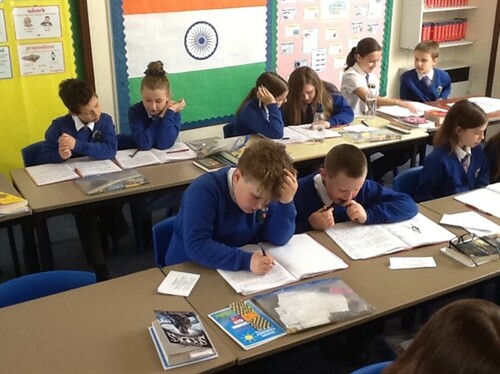
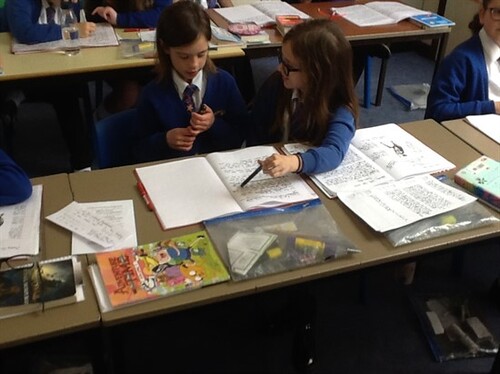
As a group, we discussed what makes an interesting problem or Maths puzzle. We then investigated the best methods to create an effective puzzle, which is both possible to solve and challenging.
After this, we created our own individual puzzles, based on decimals or decimal sequences. We recorded the answer in our Maths books.
We used Basic Skills to solve each other’s puzzles, and discussed our favourites as a class.
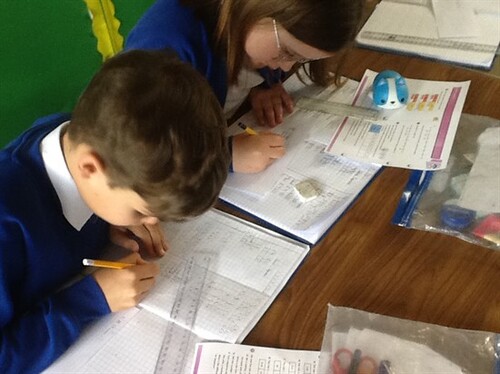
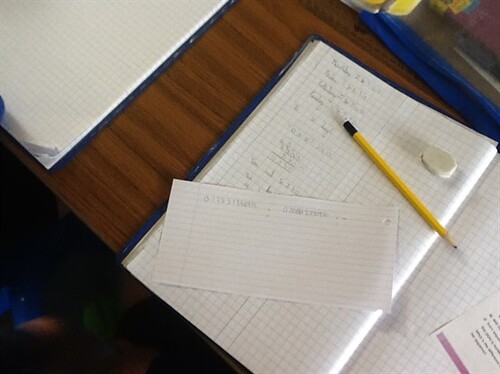
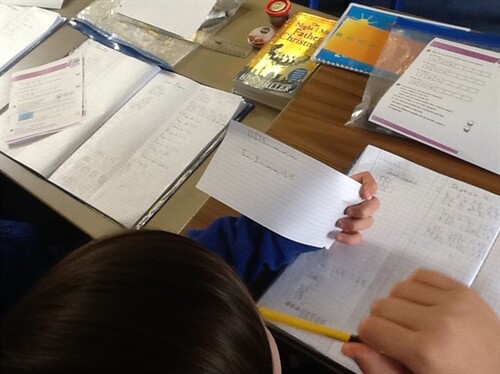
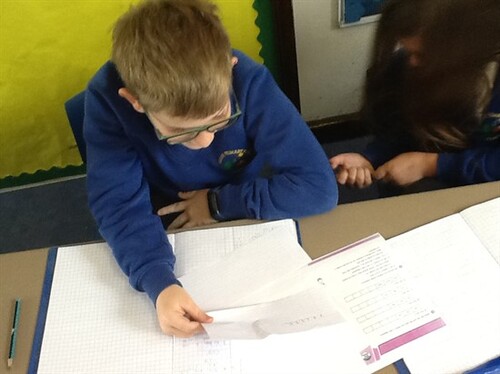
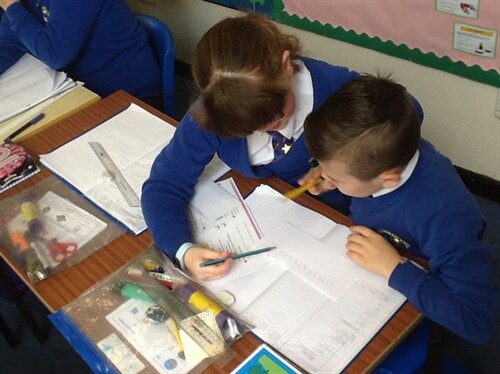
For our exit task on Tudor Life, we created a non-chronological report poster in groups. Each group member focused on an aspect that had been covered in the unit, and then as a group we edited and published the different paragraphs that were created.
We then added diagrams and illustrations to complete the posters, before sharing our work with each other.
“The rich Tudors ate such huge amounts of meat – I’d forgotten that”
“ What did they bring back from America again?”
“I think it was potatoes and gold from the Aztecs – let’s quickly check.”
“Oh yeah! Look at what the streets looked like. Remember the chamber pots being thrown into the street. Ugh!”
“It was definitely better for the Lords. Think about the punishments. Didn’t they get treated fairly?”
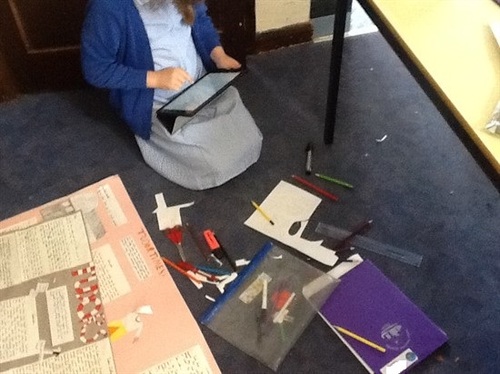
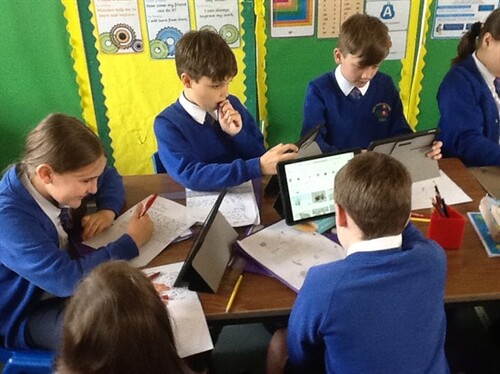
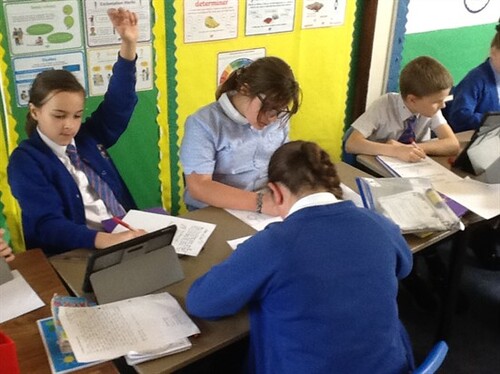
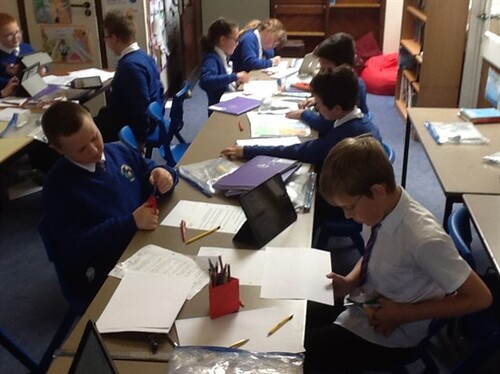
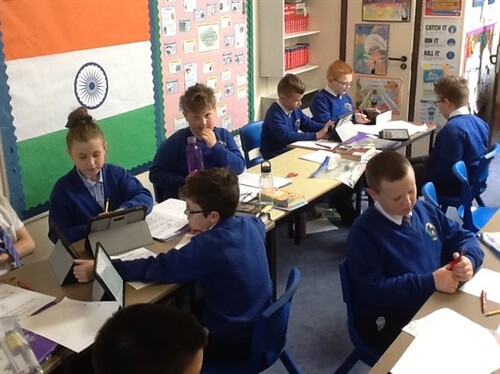
On Friday 5th March Huish decided to observe 'Unplugged Day' - a whole day of school using no technology! As well as publishing our survival guides and continuing with our work on fractions, Mrs Farmer and Miss Barnes helped us to make 'space rock cakes'. These differ from normal rock cakes with the addition of popping candy and edible glitter. In the afternoon we made 'stained glass window houses' to put up at home. We also went outside and made some 'natural art'.
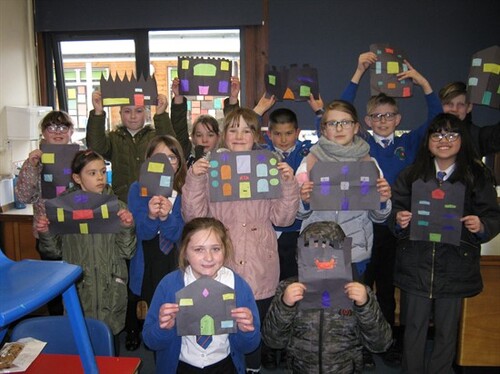
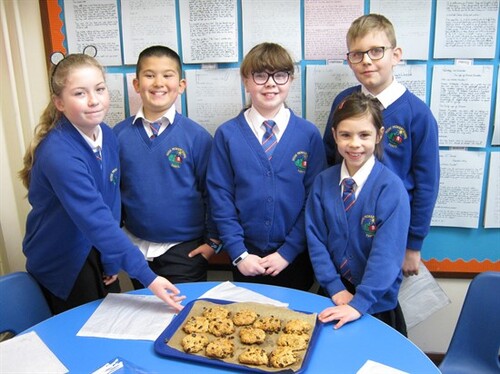
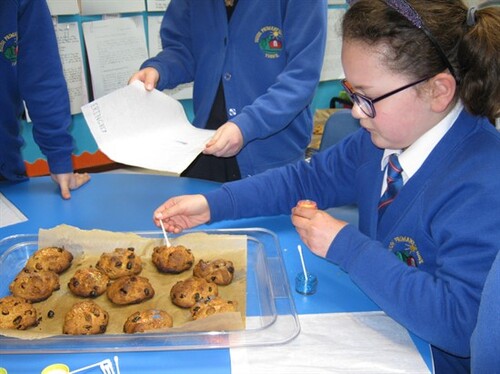
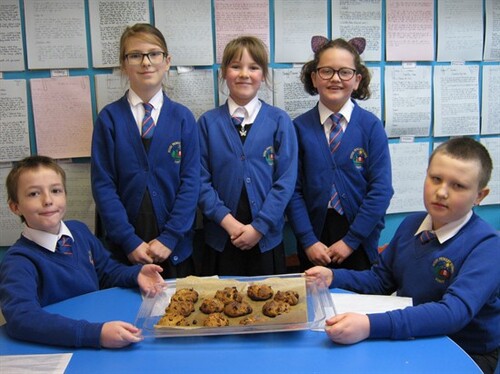
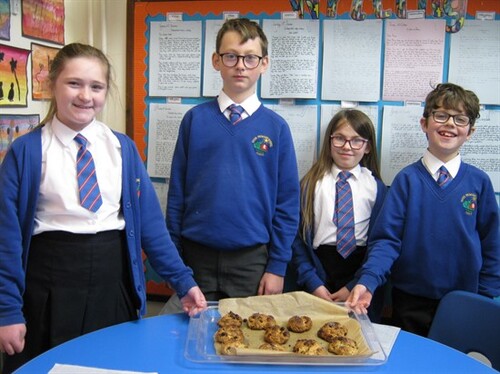
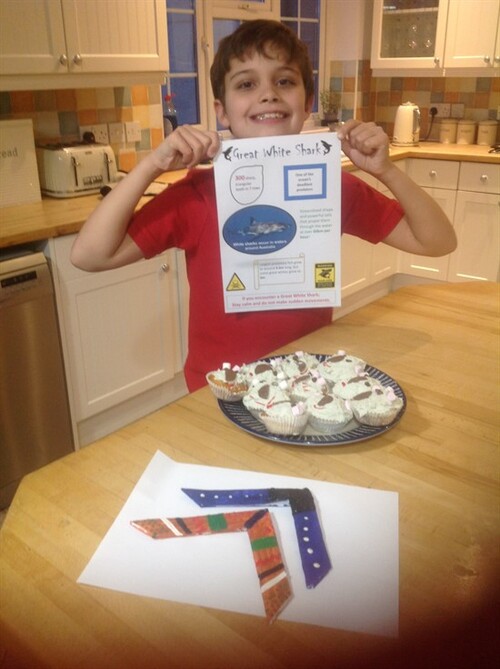
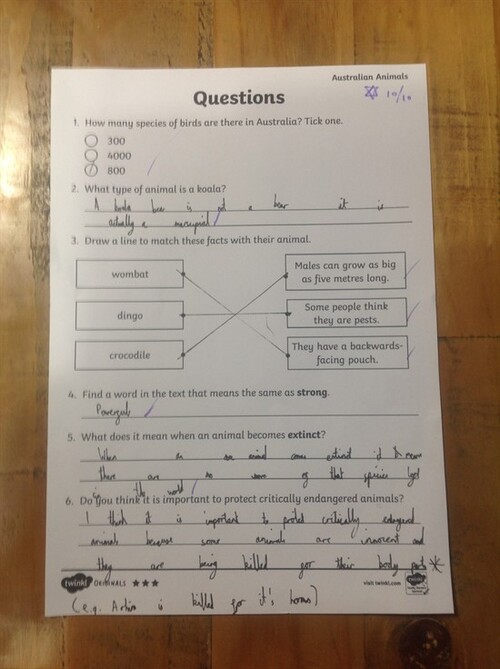
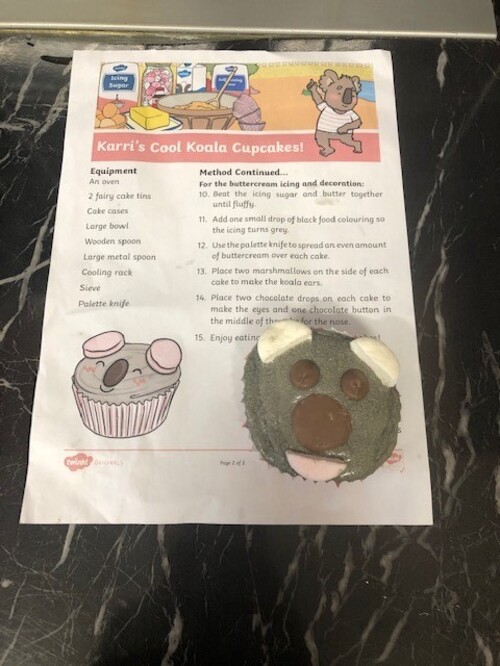
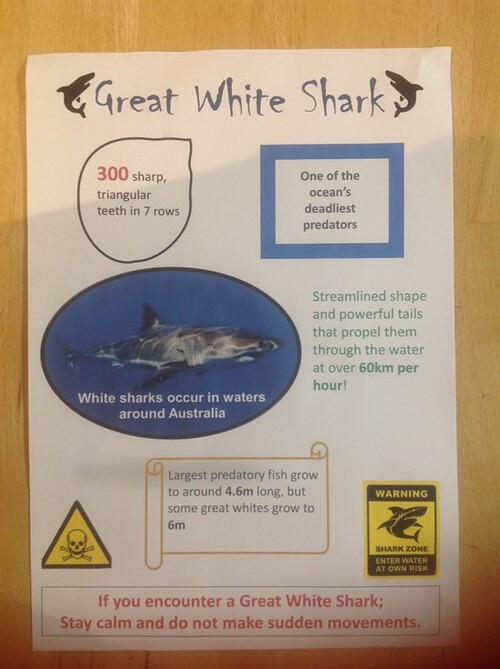
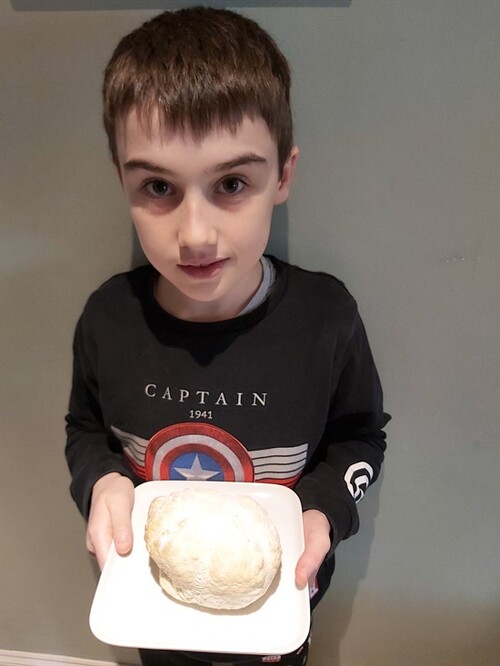
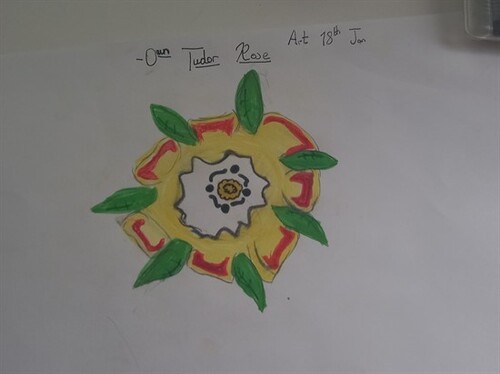
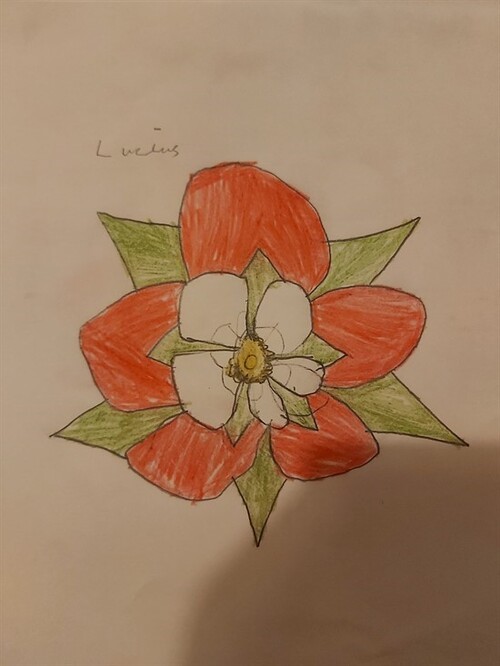
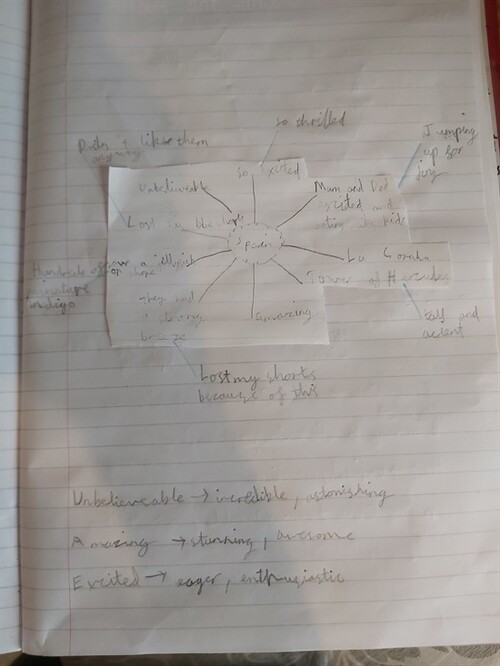
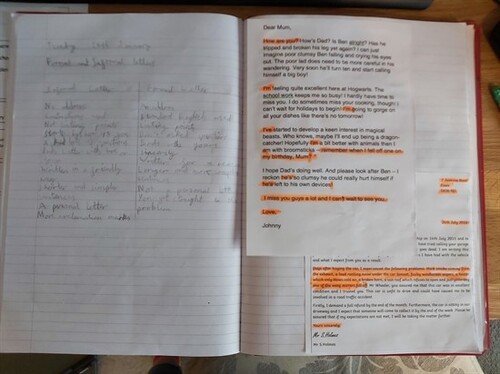
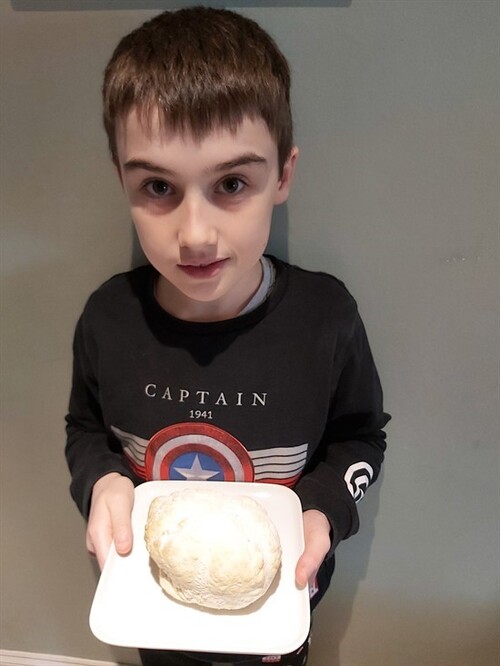
This week, to start our first full week of home learning, we created some planetary mountain scenes using just our pencils. We used lines and shading to create a dramatic effect and then some of us added some glitter to the night sky. Have a look at our gallery of pictures that we created both in school and at home.
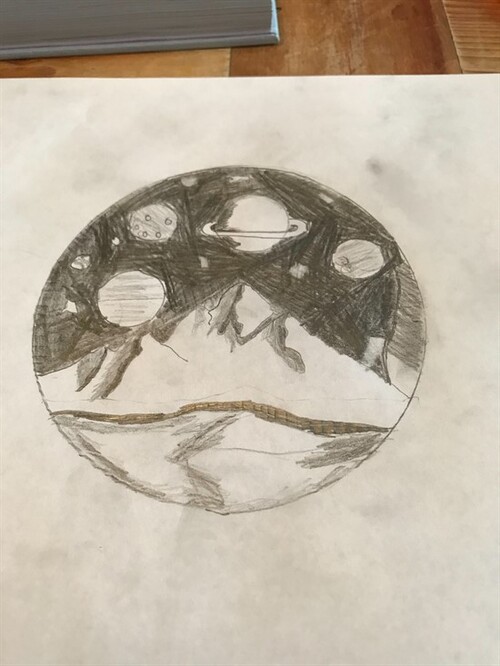
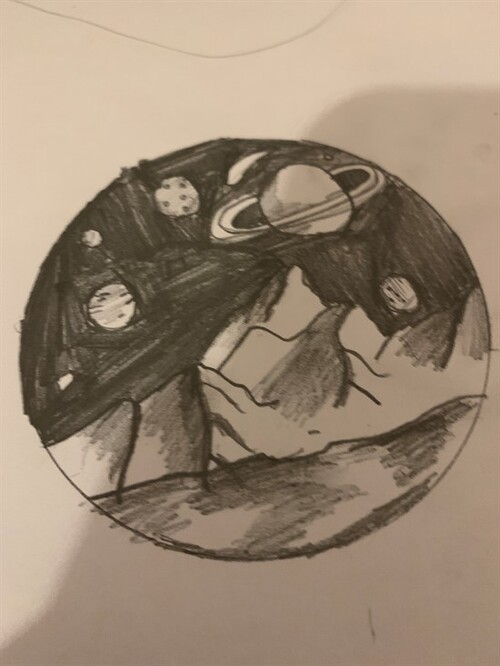
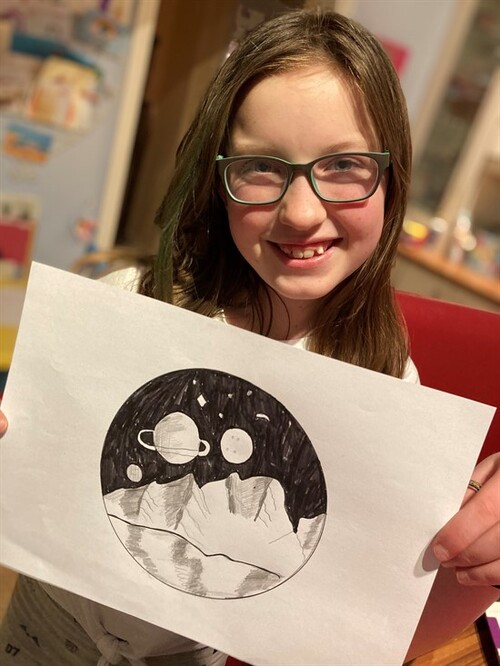
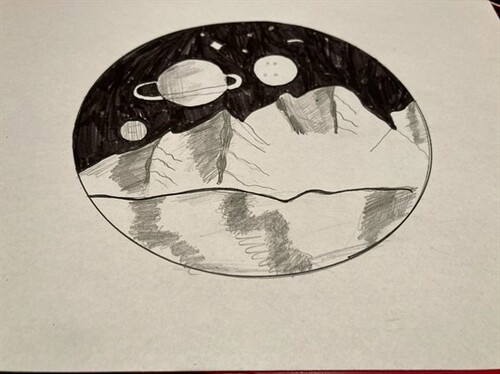
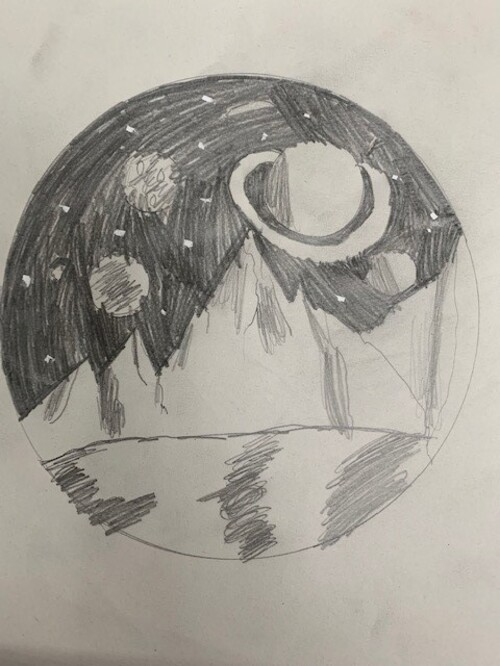
As part of our topic on multiplication and division, we have looked at cube numbers.
We used blocks to explore and investigate different sized cubes, and made tables to compare the relationships between the lengths of each side, the area of each face and the amount of blocks in each cube. We used this as a starting point to visualize what the cubed symbol actually represents.
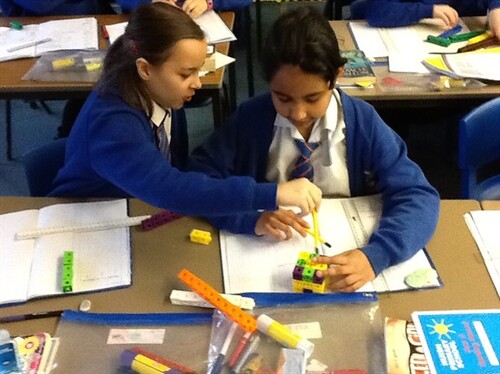
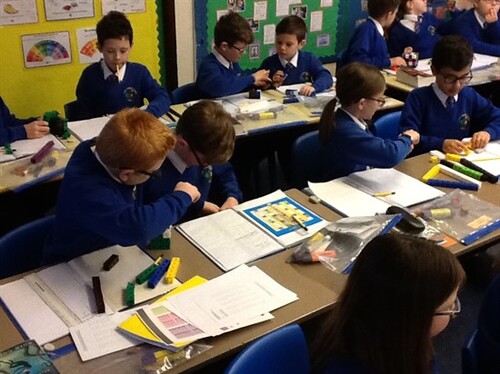
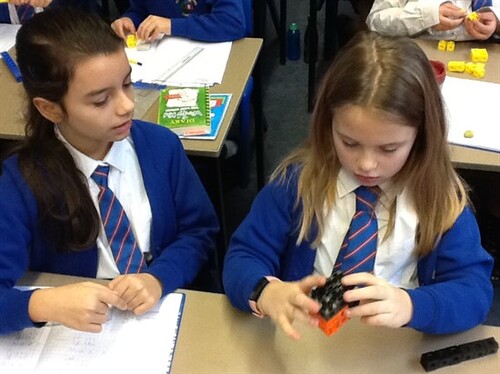
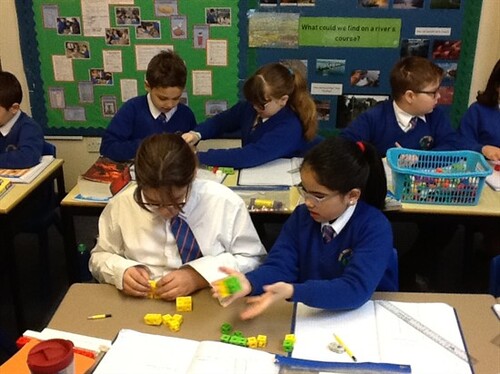
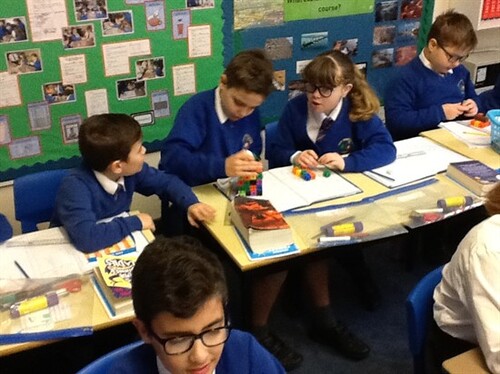
As part of our topic on multiplication and division, we have looked at square numbers.
We used counters to create squares, and looked at the relationship between the length of a side, the amount of counters we used, and the amount of counters we had to add each time we created a new square.
We then looked at and discussed our patterns; we found lots of interesting patterns!
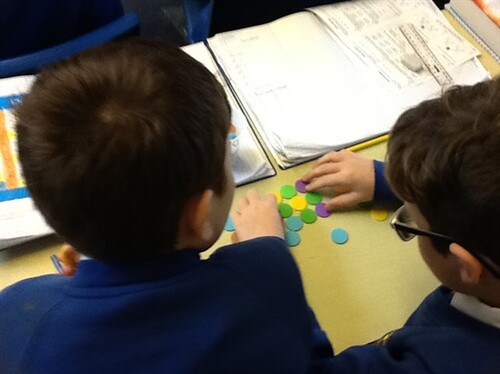
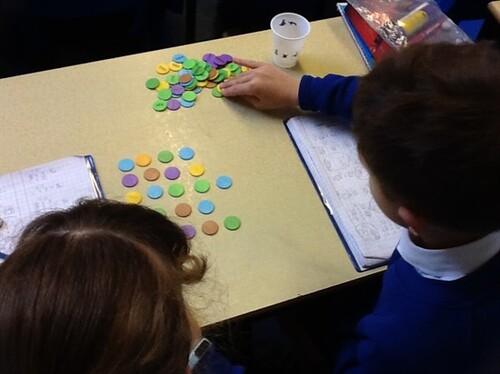
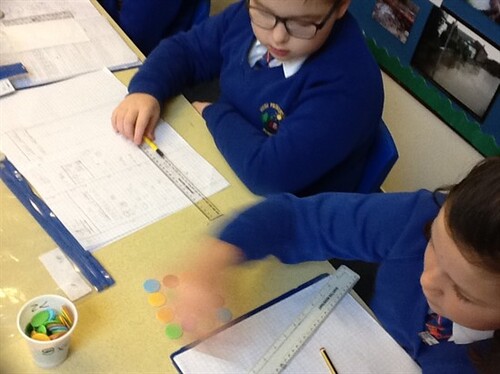
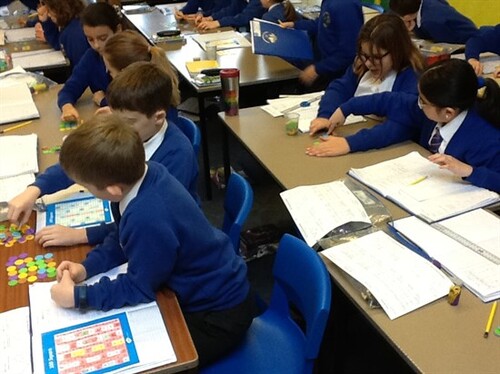
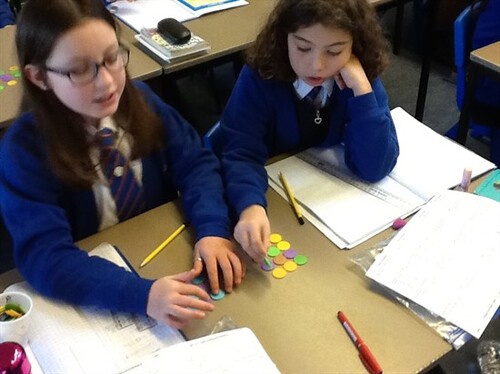
During one of our basic skills sessions each week, we use iPads or MacBooks to do a variety of timetable activities.
These include ‘TT Rock Stars’ and ‘Hit The Button’.
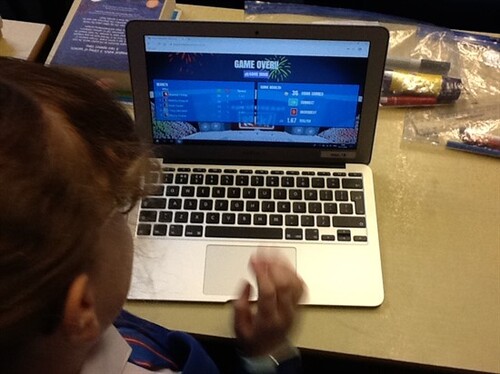
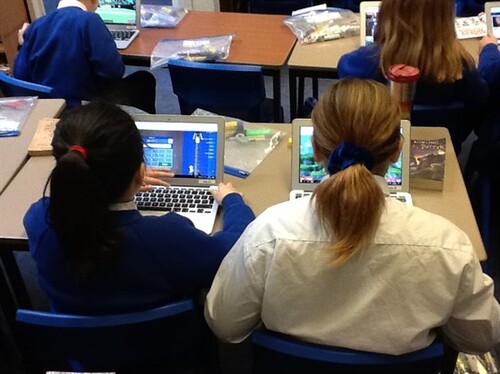
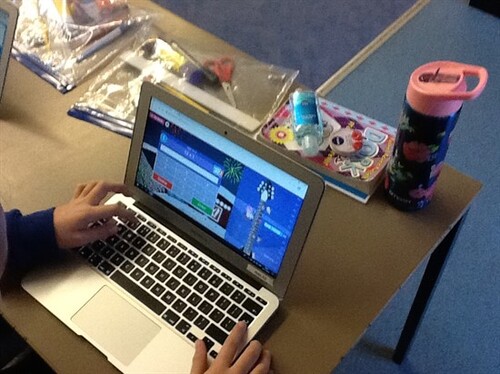
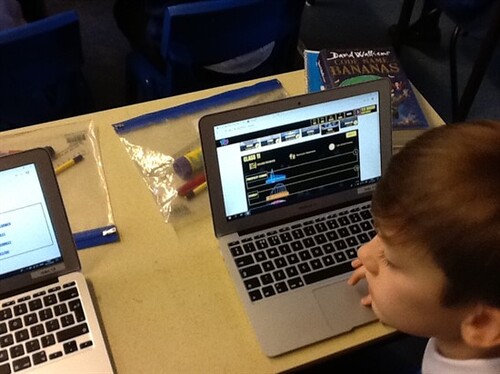
During our second History lesson on the Tudors, we explored the question ‘What Was The War of the Roses?’
As part of this, we looked at how Tudor society operated, as well as how the monarchy’s system of inheritance and primogeniture worked. We used drama to explore this.
We discussed the draw backs and benefits of this system, and we had the chance to reflect on our own ideas of whether this was a good or fair way to choose rulers and order society.
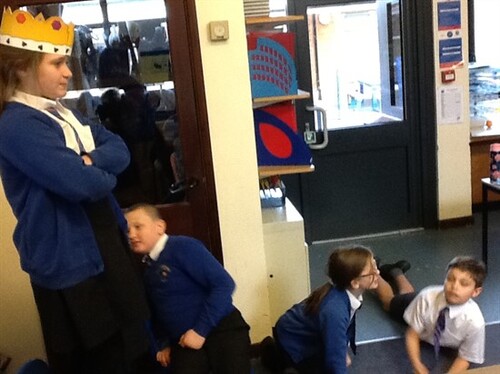
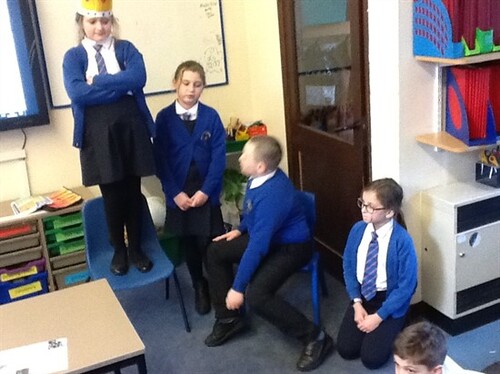
We have been looking at mathematical vocabulary as part of our topic on multiples and factors.
We played a game in pairs where we had a number of cards, each with statements involving square and cube numbers, factors, multiples and other concepts. We then had to think of a number that satisfied both statements. The first person to do this won the round, and earned a point!
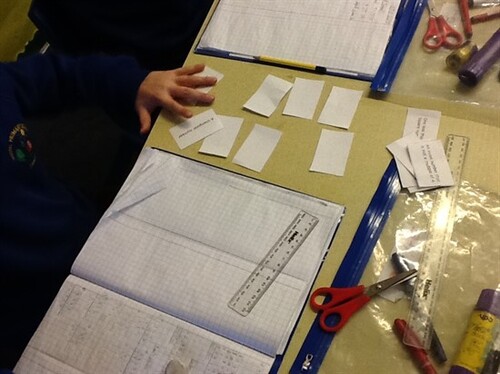
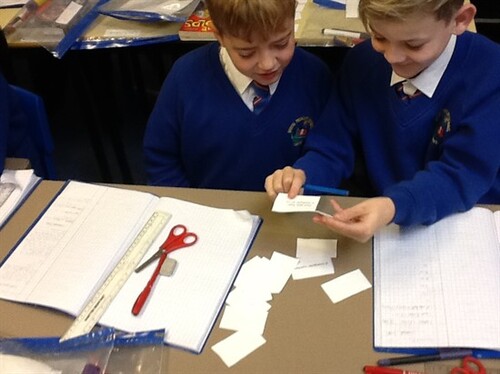
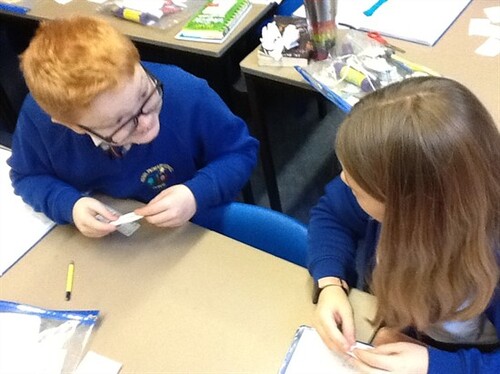
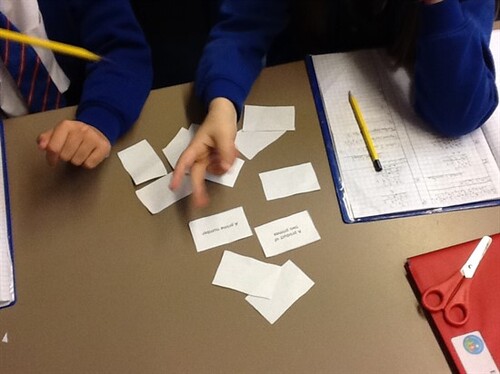
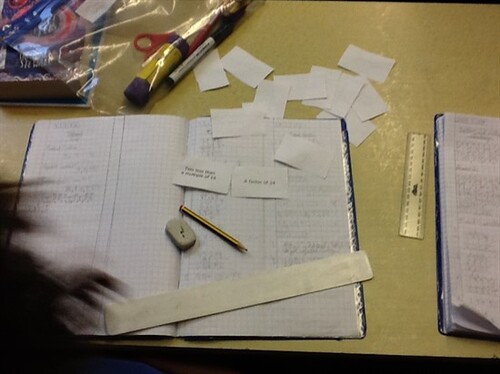
Year 5 had our Christmas party today. We really enjoyed 'throwing some shapes' on the dancefloor, and playing party games like 'Pass the Parcel' and' Musical Statues'. The afternoon was finished off beautifully with a drink and some cake. All of year 5 would like to wish our family and friends a very happy Christmas.
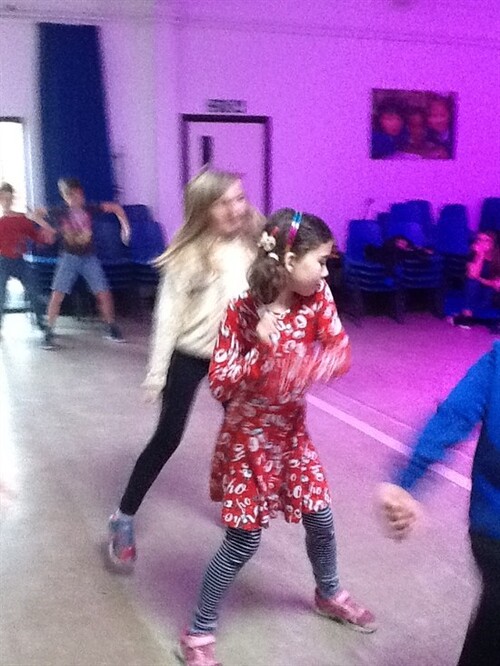
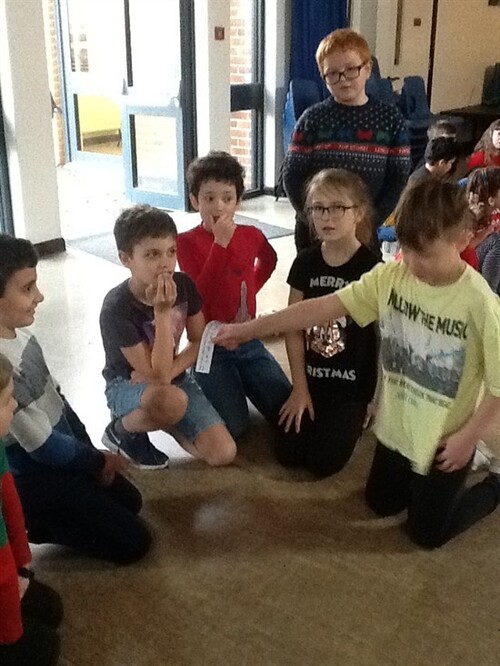
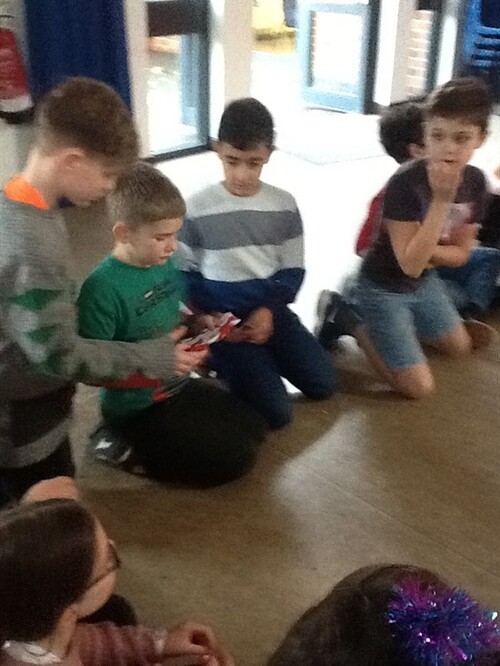
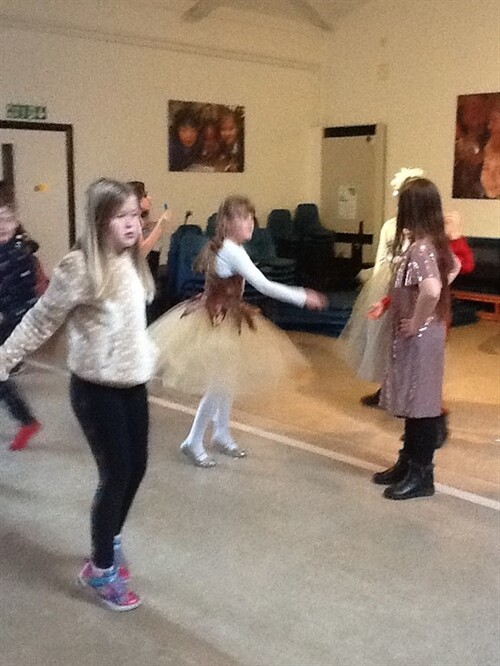
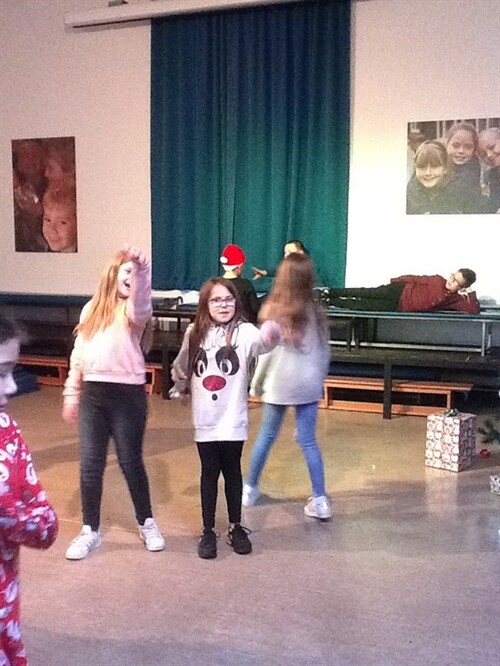
For our Tudors Hook lesson, we looked at a variety of Tudor artifacts and sources, and tried to guess what they were made out of, what they were and who they were for.
We also explored Tudor medicine, looking at some of the grisly and wacky cures that medicine women and physicians used at the time.
We discussed how they might have arrived at these conclusions, and how we might justify those conclusions given the knowledge at the time. We also compared and contrasted Tudor medicine, and people’s access to it, to today.
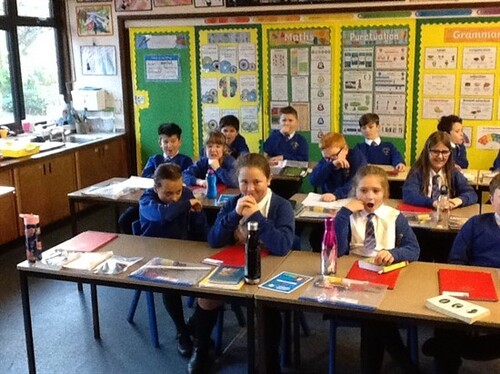
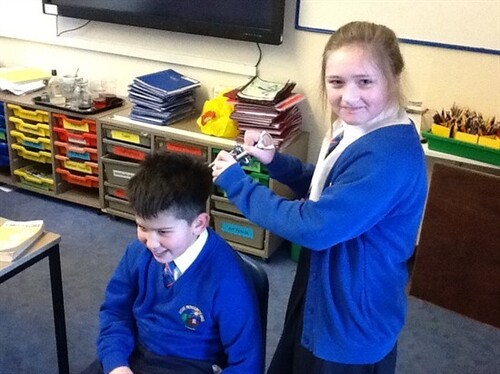
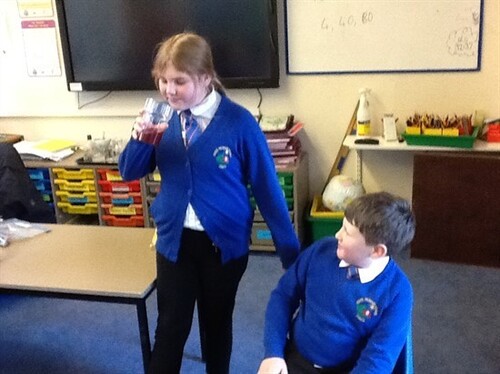
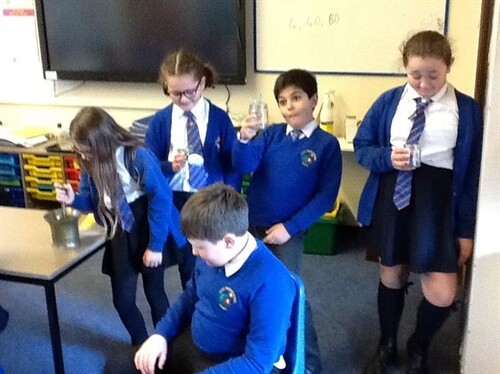
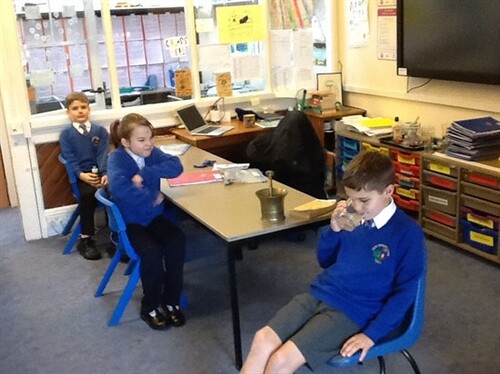
As part of our PSHE work, we have looked at team building, and what measures we can put in place to help us when we disagree about what course of action we should take. This took place over 2 lessons.
As part of these, we got split into teams and given the challenge of building the tallest tower we could out of 6 sheets of newspaper and a meter of sellotape!
There were a variety of designs, which we shared and refined, culminating in each groups final designs. Discussions about teamwork also visibly helped us to work as groups better as the challenge went on!
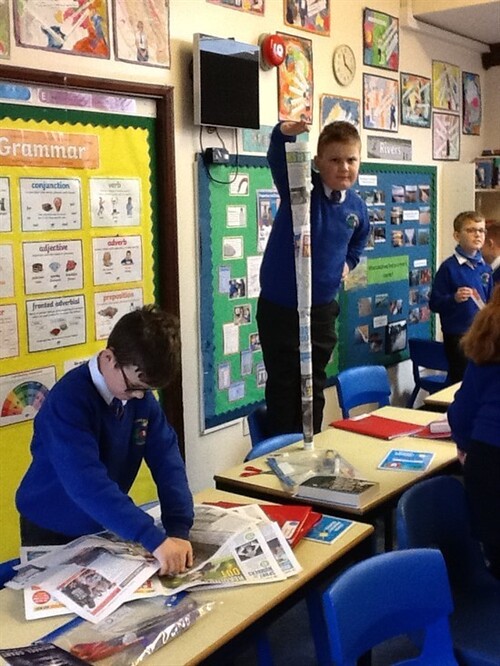
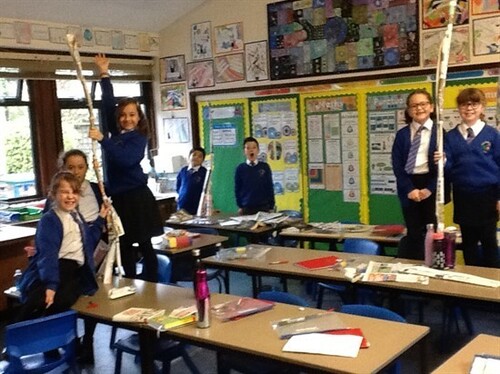
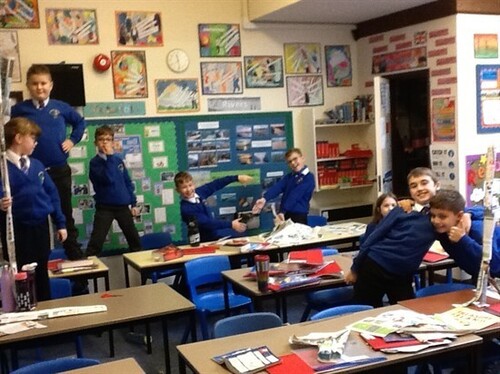
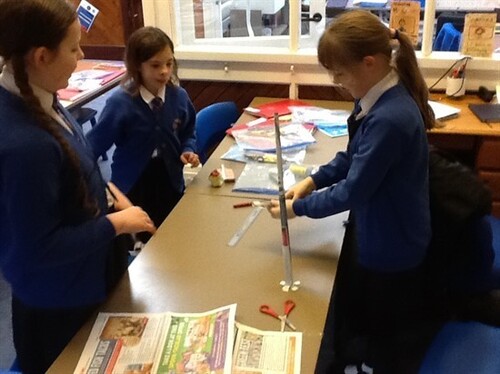
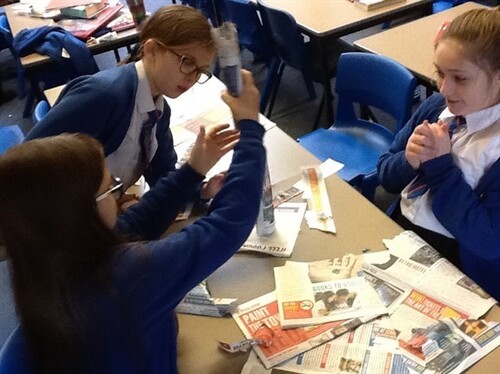
As part of our Rivers topic, we have been looking at how rivers can affect humans, and how we can manage their effects, particularly flooding.
As part of this, we designed and built dams made out of different materials. We worked in teams, and discussed our designs. Once we’d tested our initial designs, we refined our ideas, discussing which shapes and materials worked best, in order to improve the effectiveness of our designs.
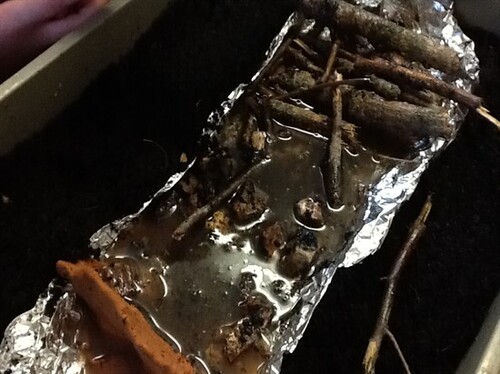
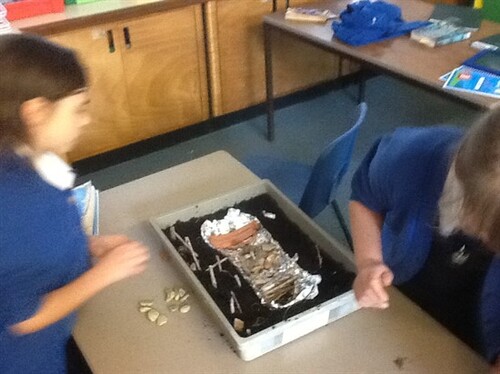
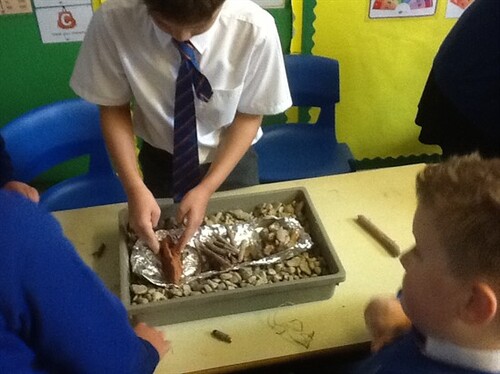
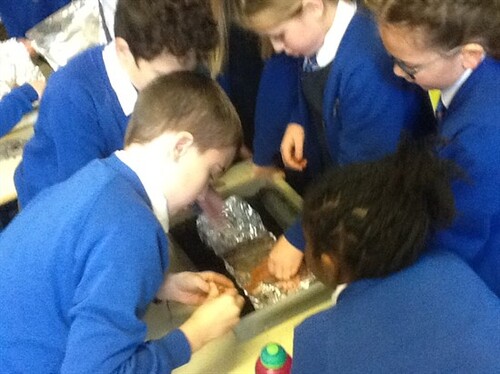
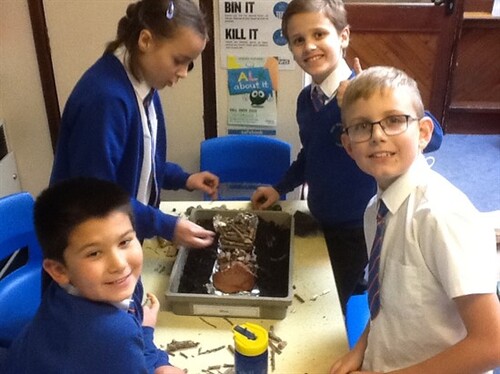
As part of our basic skills sessions, we have revisited negative numbers. During this work, we played a strategy game, which required us to refine our tactics using our knowledge of dice and probability, as well as quickly work out the sum and difference of negative numbers.
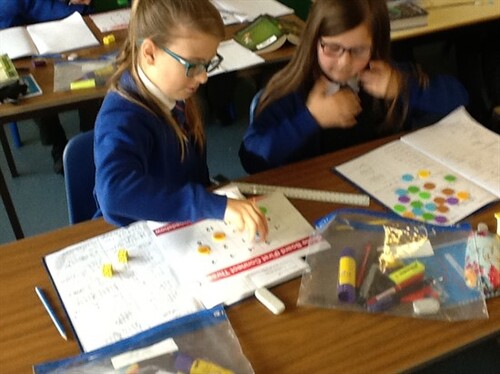
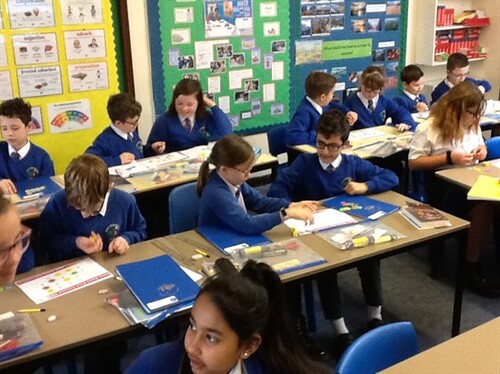
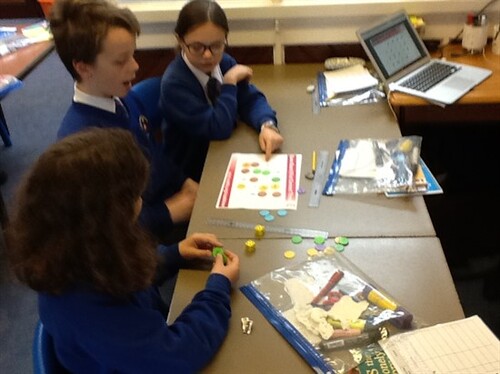
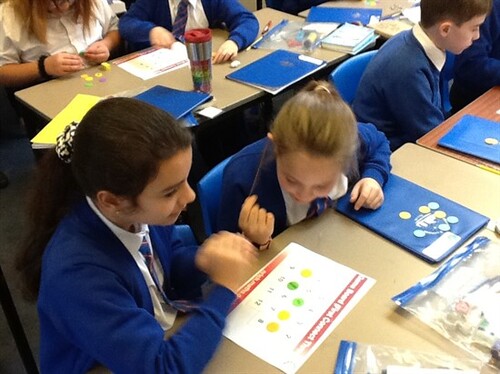
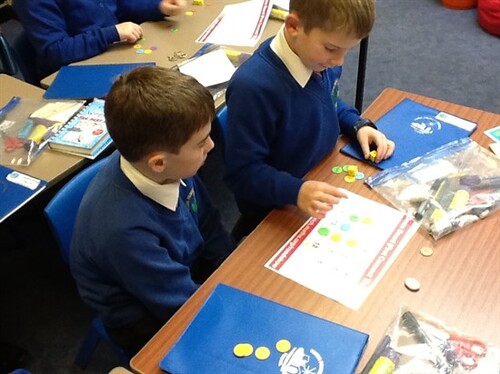
During our English writing work, we often engage in peer editing after we have finished final draft.
We sometimes pair according to what our strengths have been during that piece of writing, and carefully read over each other’s work, giving advice and justifying our own choices.
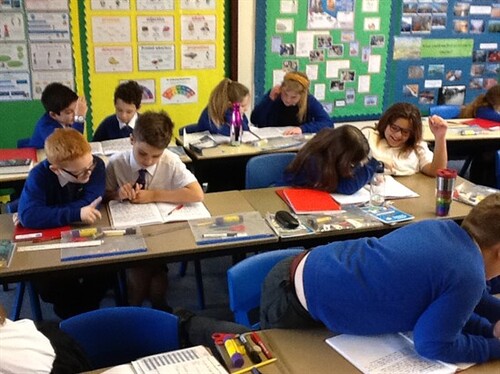
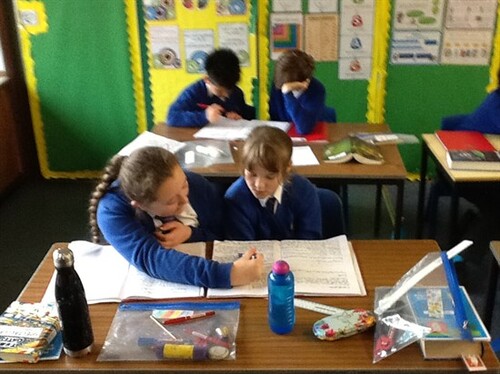
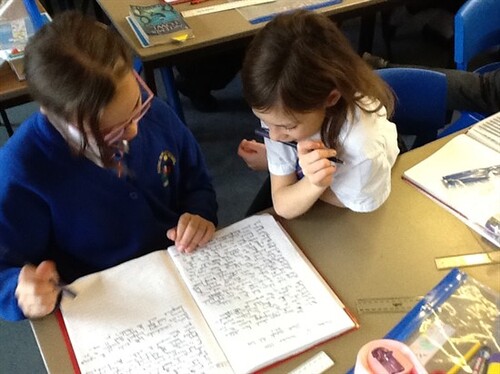
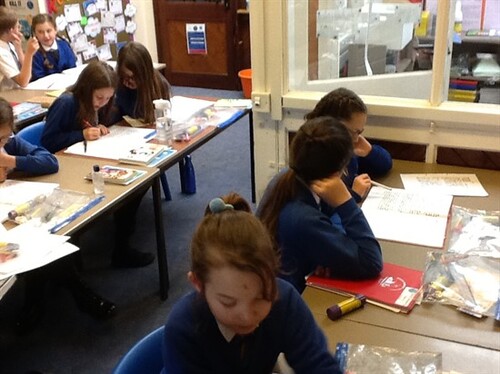
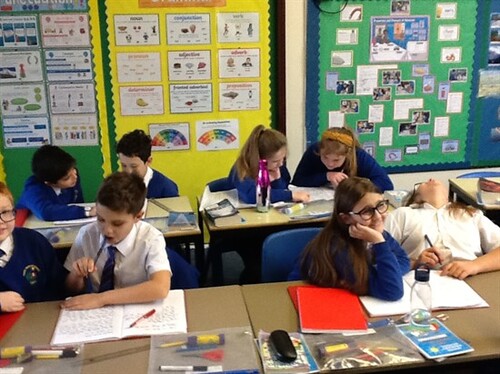
We have completed a variety of exciting and unusual activities for Maths week including puzzles, games and number investigations led by a mathematician online!
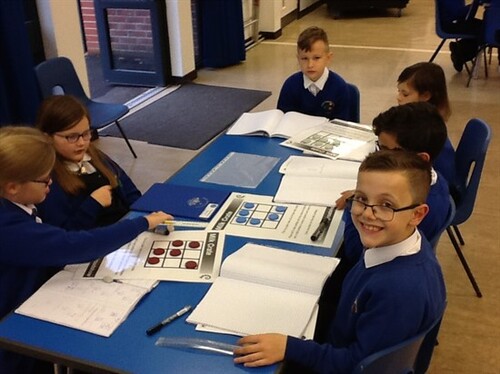
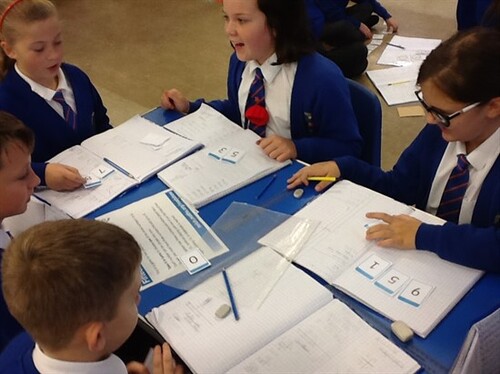
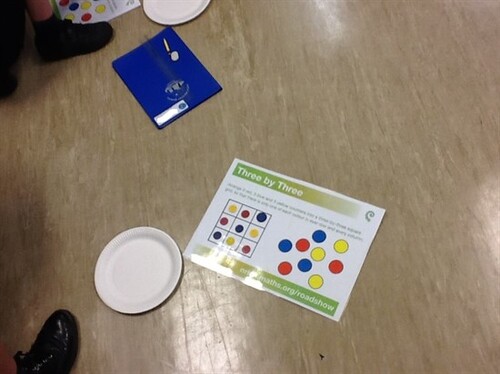
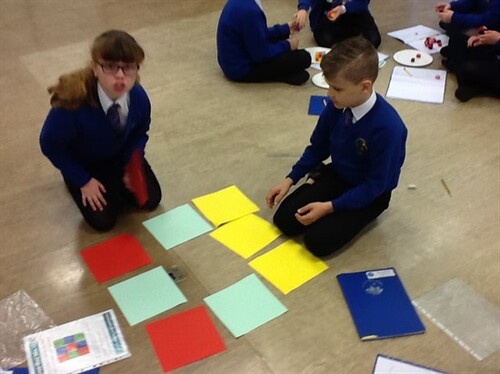
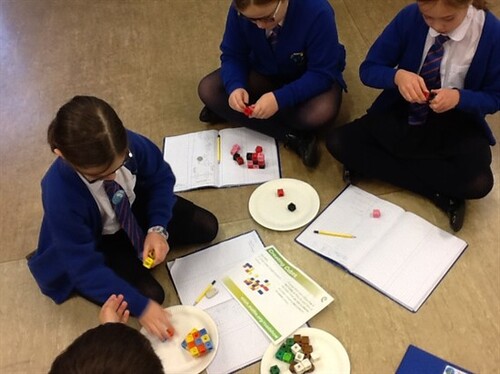
We have created some poems based on winter.
We looked at rhythm and rhyme in poetry, then thought about what sort of objects, feelings and imagery we experience during winter time.
We then used these ideas to construct our poems, deciding whether we wanted to include a rhyming scheme, or base our structure more around a list poem.
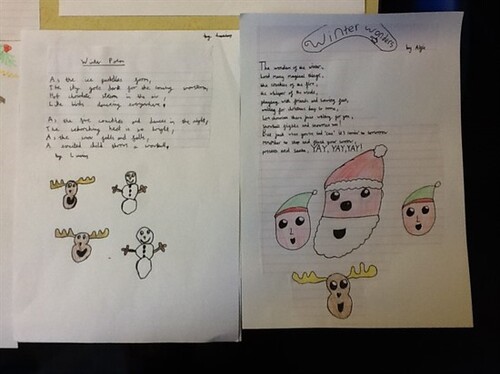
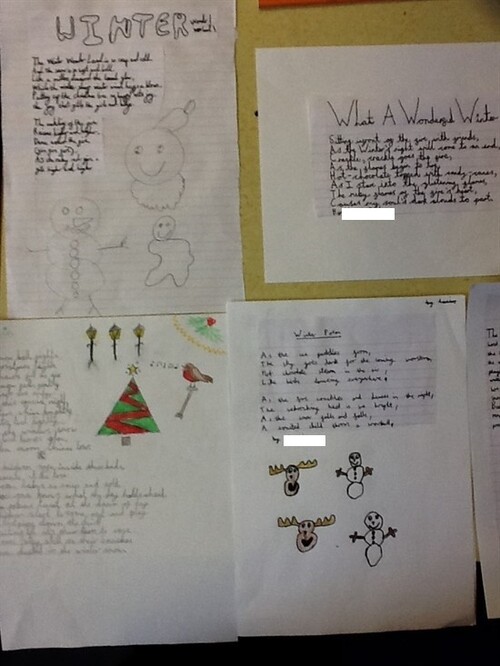
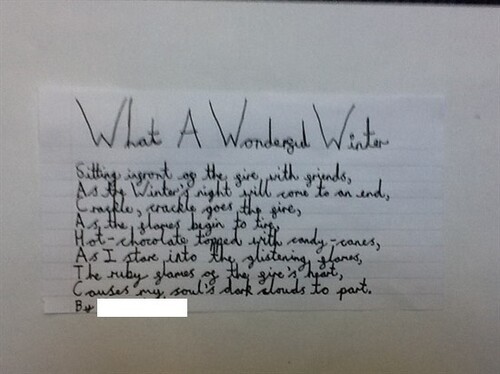
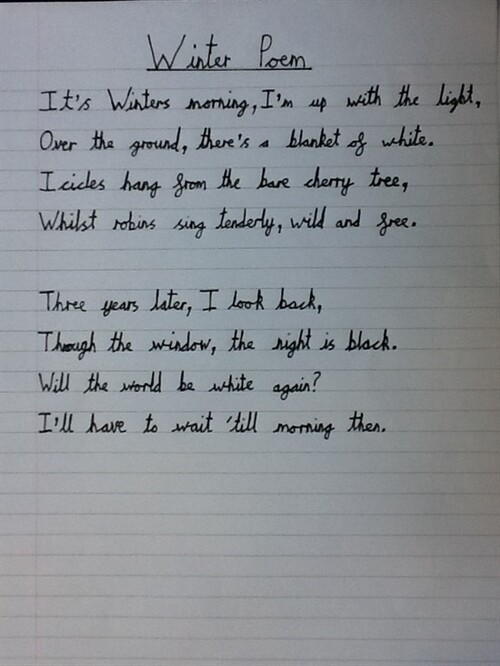
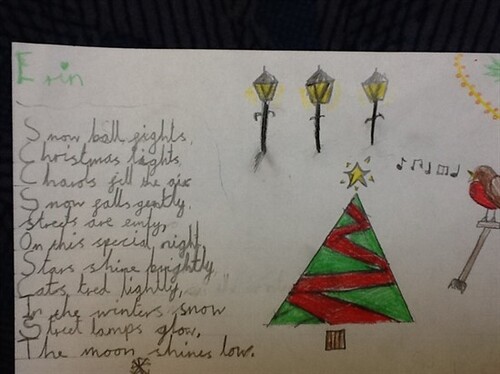
We have continued to have brass lessons, with each of us learning to play either a trombone, trumpet or euphonium.
We have learned about how to correctly use our mouths to make different pitches through the instruments, whilst also learning to read music. We are learning more and more notes!
We are taking our instruments home and practicing them in-between each lesson.
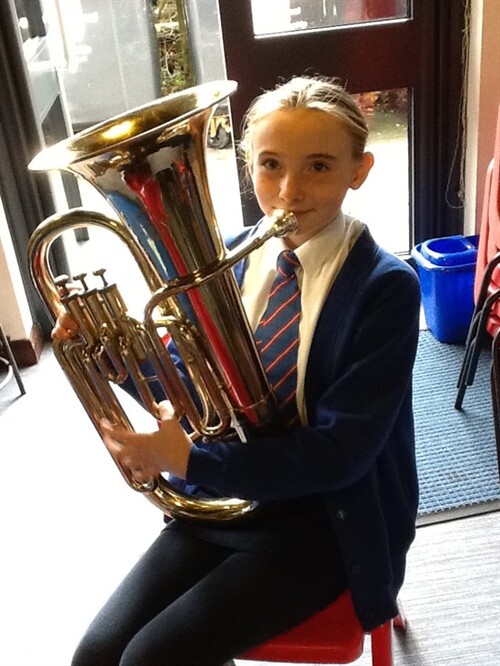
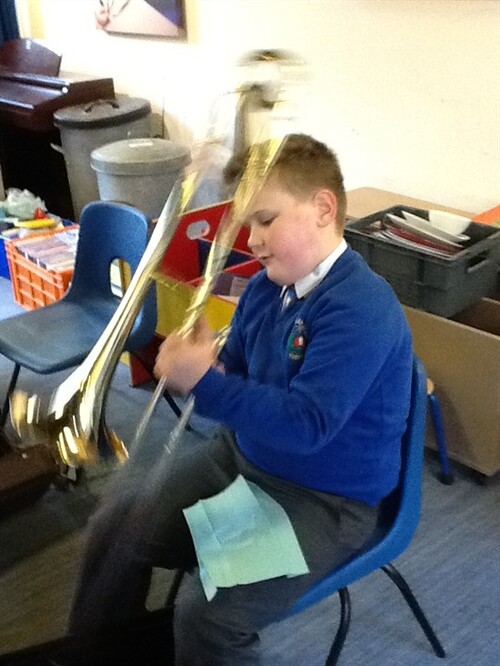
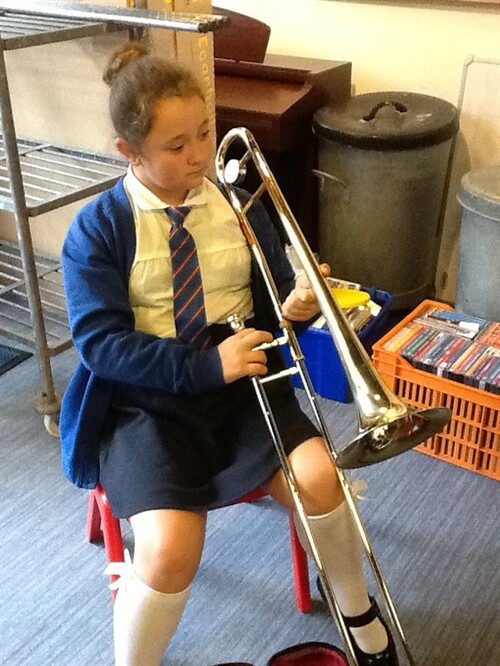
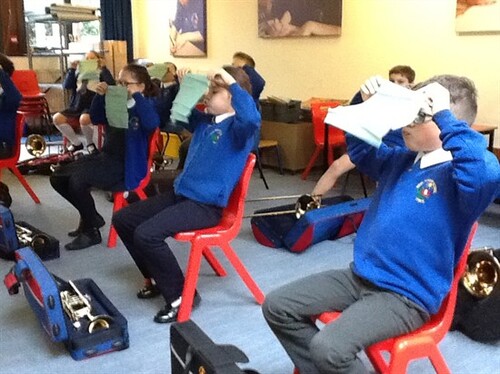
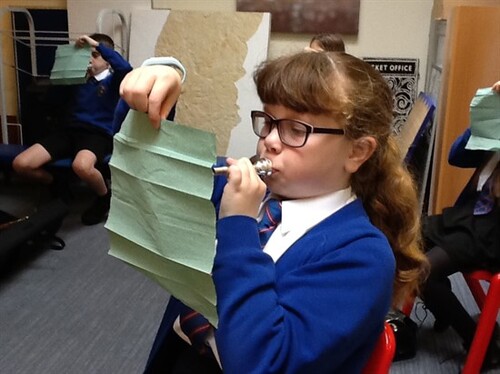
During our break-time, Reception were doing a P.E. lesson, during which they were coming up with a dance to the song ‘Ghostbusters’.
We all watched, applauded and cheered them throughout our break – it was great fun!
Because it was our day on the trim-trail and adventure play, we could sit and stand on the climbing frame to watch them.
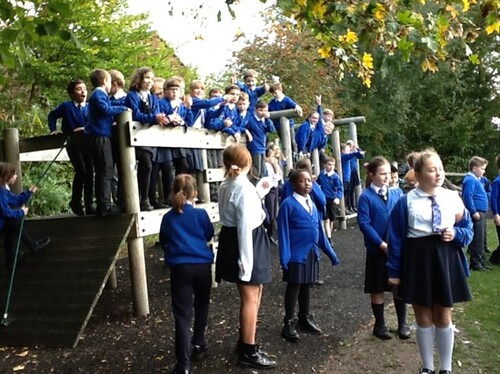
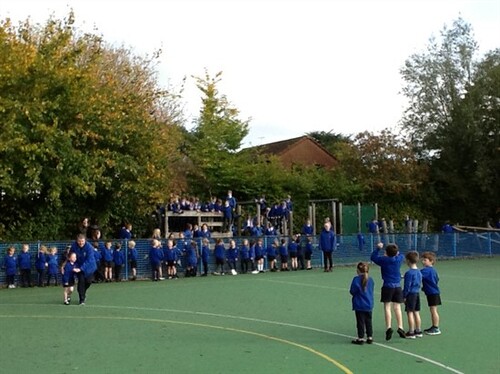
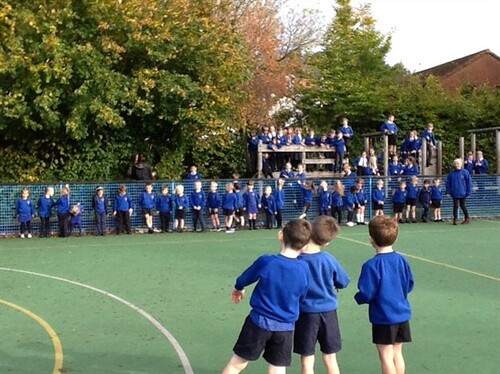
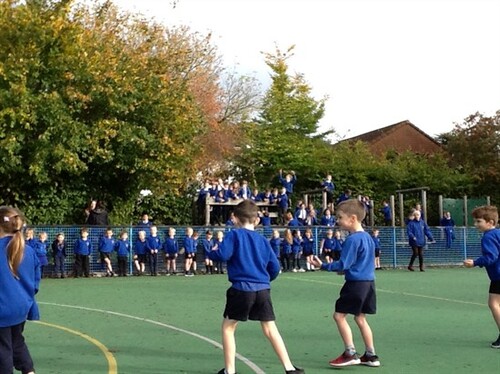
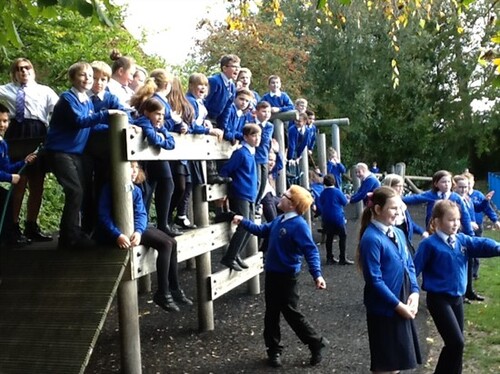
To round off our work on addition and subtraction, we have conducted an investigation where we have designed, funded and created a theme park.
We then simulated running our theme park, taking into account costs, profits and maintenance. The design of our theme park was important as, taken with our initial outlay, it helped each park settle on an admission price.
As part of this investigation, we discussed different strategies for making a bigger profit in the short and medium term. Would spending more of our initial loan be wise? Should we hold back some of our funds in case we incurred losses. A variety of strategies met with differeing levels of success!
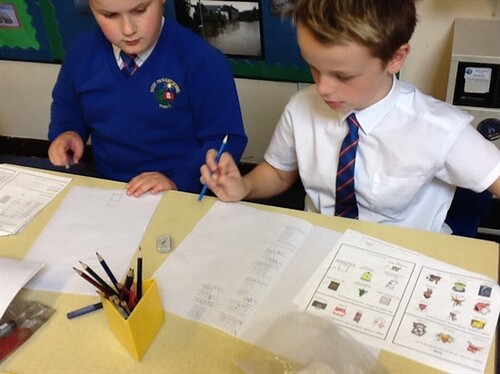
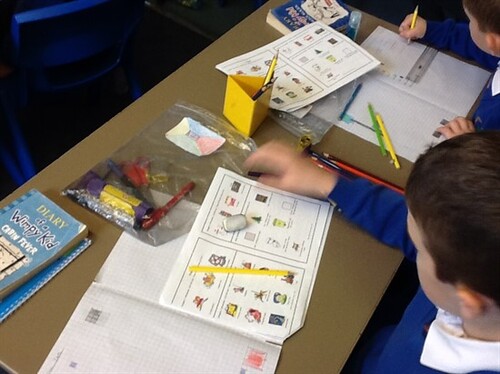
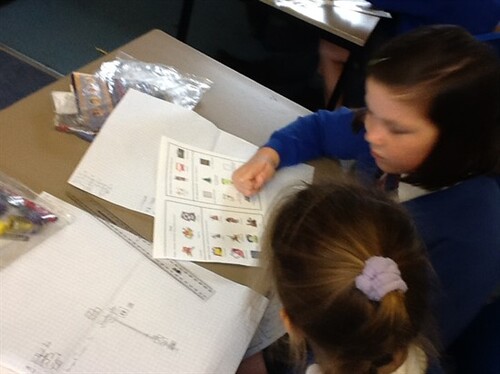
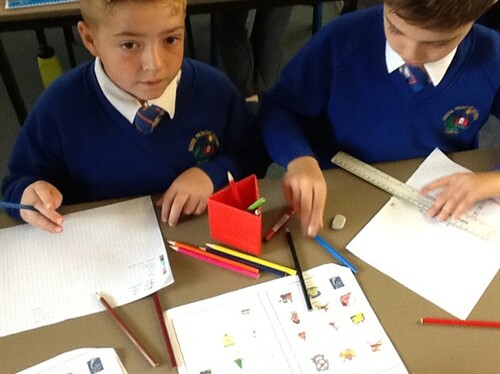
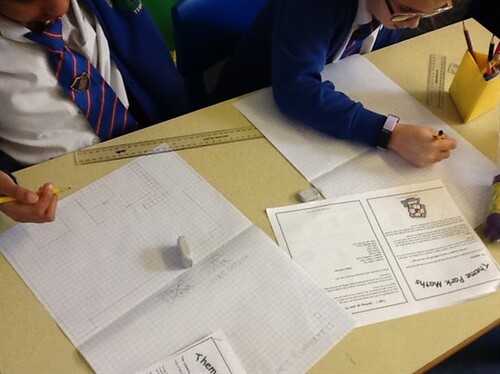
As part of our unit on the book Journey to Jo’burg, we have looked at our culture and values in Britain, and what makes up our identity as a nation, and as individuals.
As part of this, we looked at a range of British institutions and ideas, and ranked them in order of ‘Britishness’ and then importance.
We also looked at what values are important to us, and which of these we would like to promote and live by.
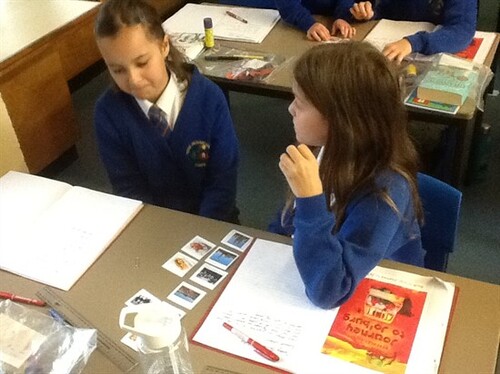
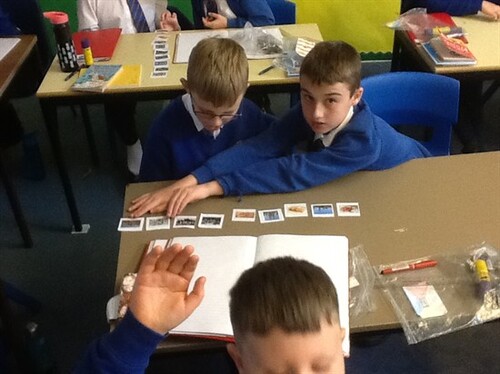
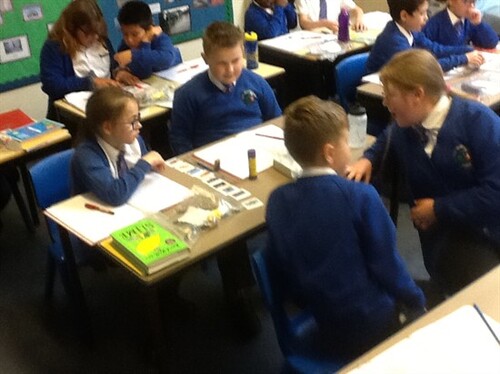
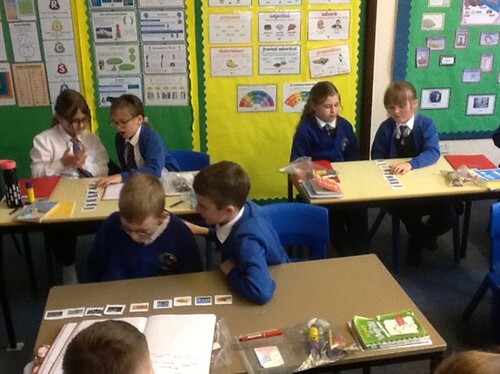
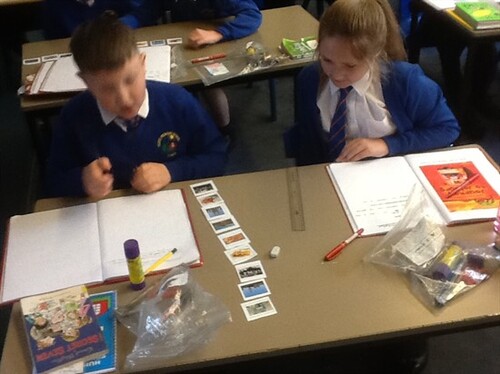
We used this session to give anonymous complements to each other. We each wrote our name on a piece of paper, which was then handed around the class.
As they went around, we wrote something we admired about that person. It could be a quality, or even a specific incident where they were kind or considerate.
How does it feel reading what people have written about you?
"It makes me happy."
"I can't believe people think I'm clever. That's nice."
"Lots of people think I'm funny. I really like that!"
"I didn't know that my friends think I'm kind."
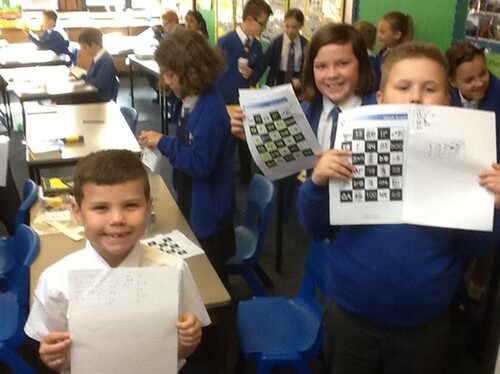
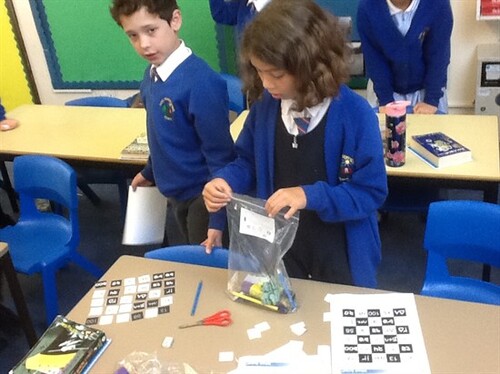
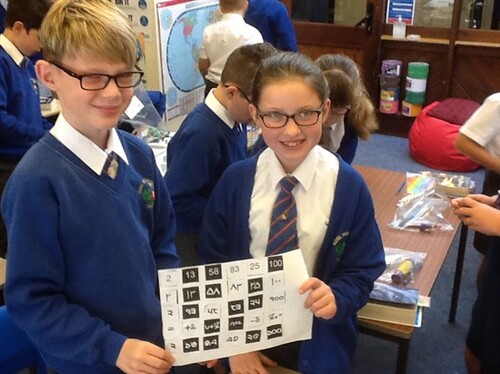
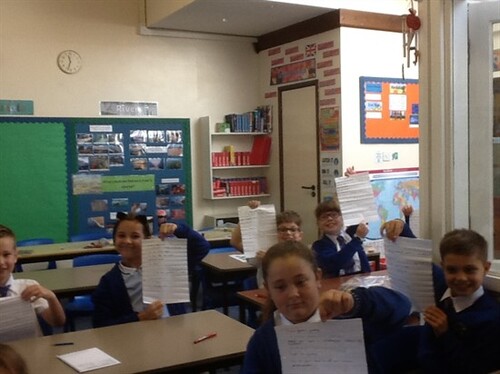
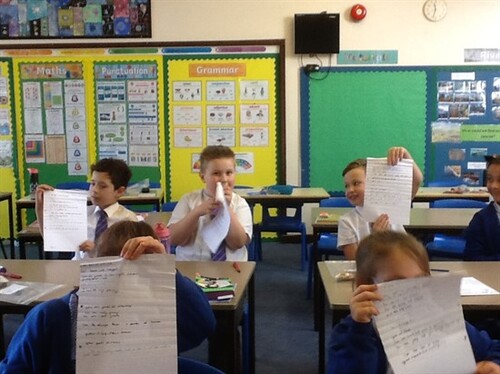
We used hot-seating and drama to explore the opening chapters of the arrival.
We explored how the main character would have felt leaving his family, and then looked at what it would be like arriving in a different country, not understanding our surroundings or the people who were interrogating us.
We focused on body language and the tone of our voices to get our message across, even if they were sounds that our group didn't understand!
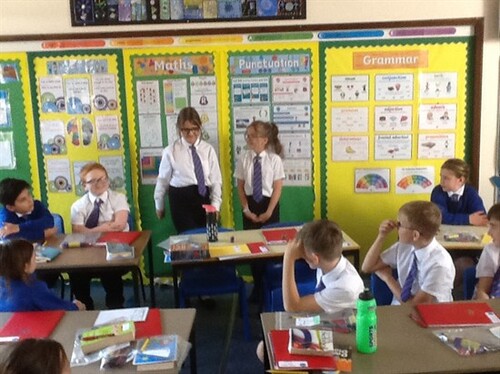
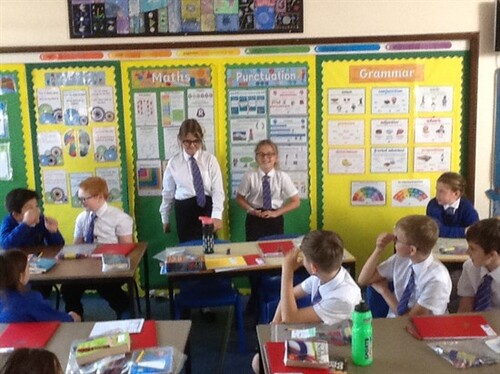
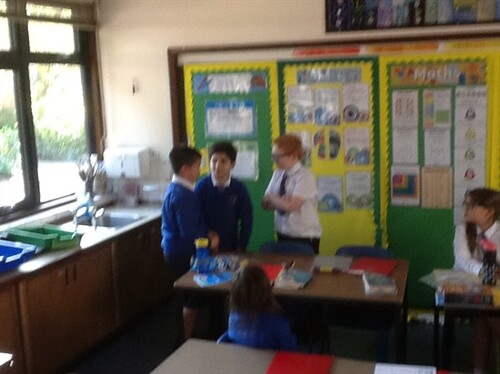
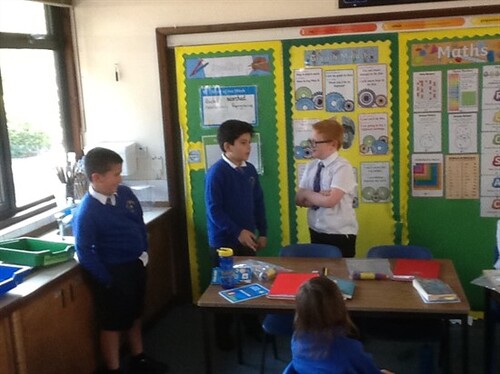
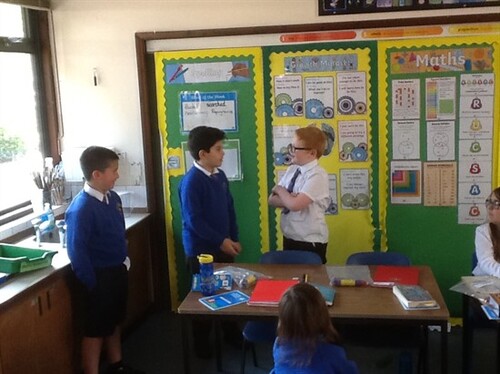
We demonstrated erosion by looking at what happened when we ran water through some soil, and collecting the run off in a clear plastic bottle.
"Look! The water is dirty!"
"I think the water smashes the soil along."
"It's dirty because the soil has been moved."
"I reckon there's less soil in the [first] bottle now."
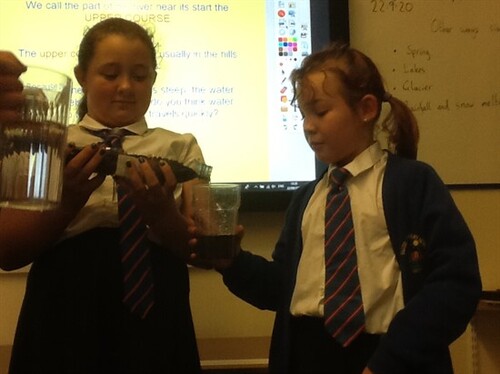
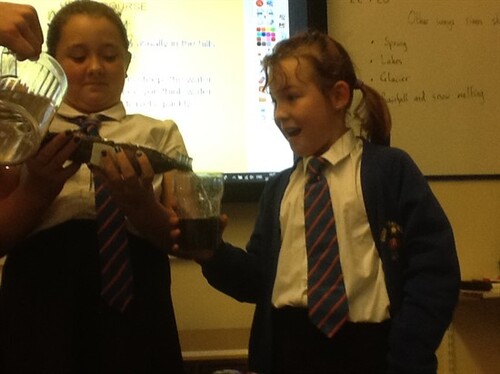
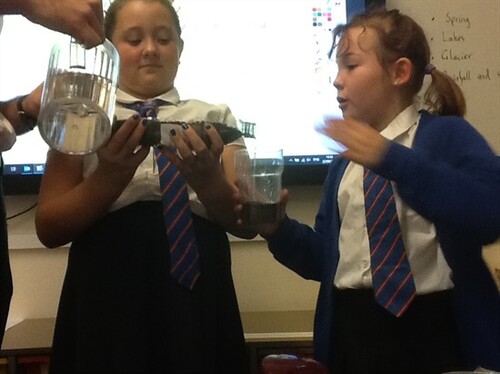
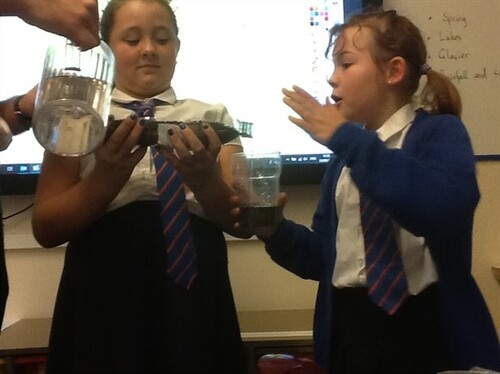
We have explored mental arithmetic and times-tables through a variety of activities.
In the one depicted, the children play a game where they turn over two cards up to a value of twelve, and multiply the values. They then flip two more, and mentally multiply them, before adding their two products together, again mentally. This is their score.
A strategy element is added - they may turn over 4 more cards and repeat the process, adding it to their score, but if they turn over an Ace, they lose their score for that turn.
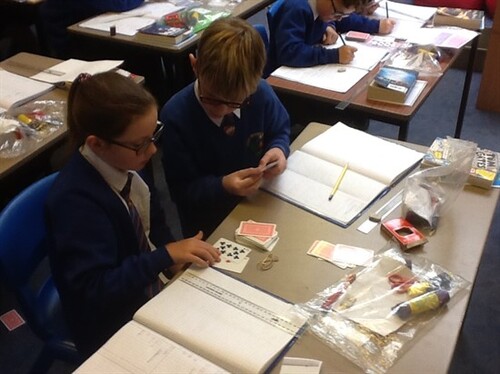
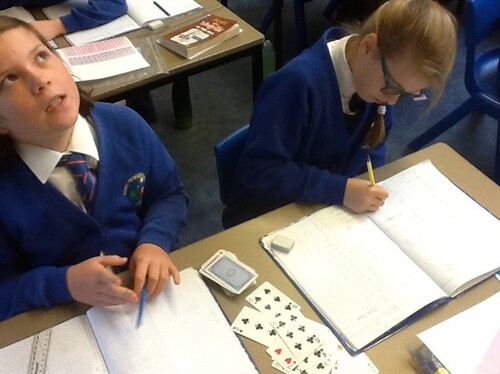
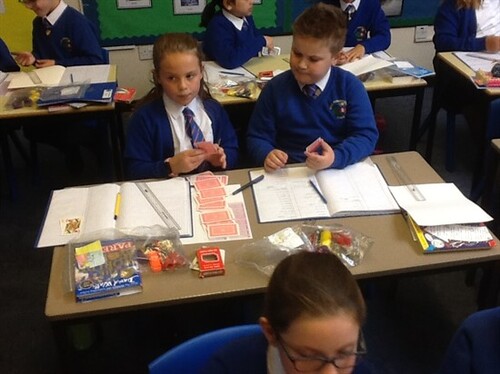
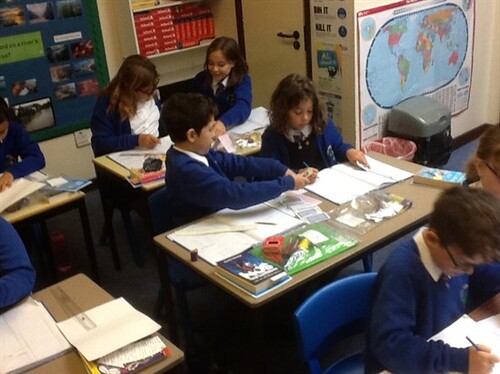
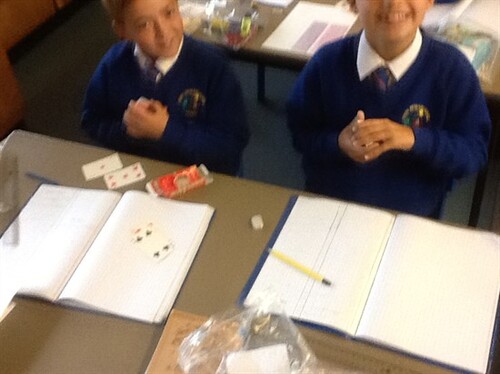
We used the SCARF Coram activity on saving money to discuss what children would do in a variety of situations. The children explored when to decide to spend their money, and what they think is important when making this decision.
We also discussed what we like to spend our money on.
Will we spend or save? Why? Does it make a difference if our friend is making the same decision?
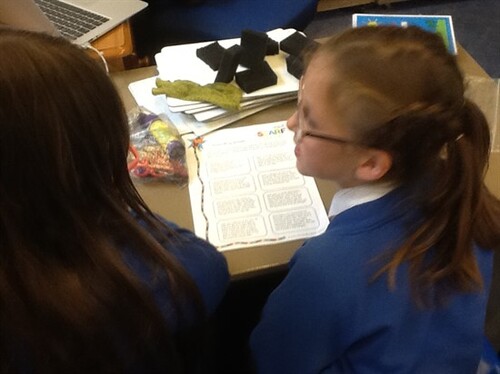
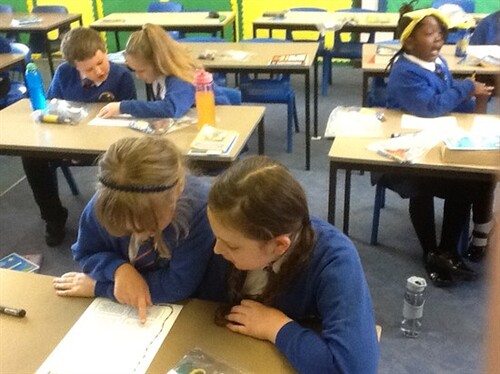
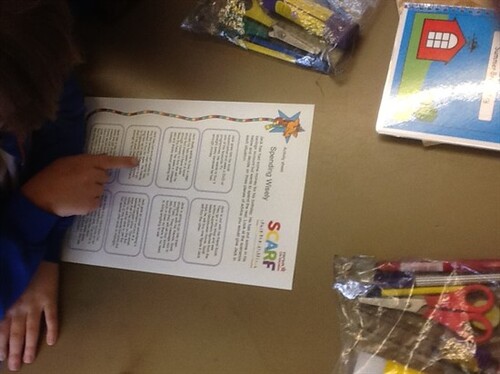
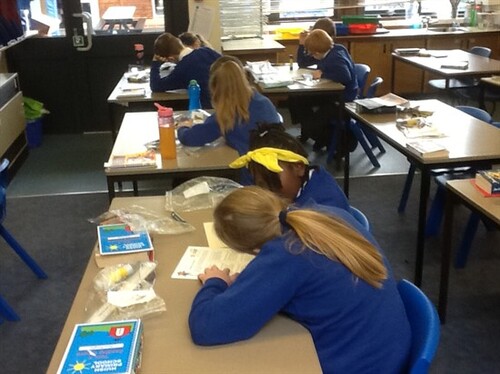
As part of our first week back, we have been looking at a variety of Maths puzzles that require reasoning to solve. These included matchstick puzzles, which encouraged using our knowledge of shape to create different triangles and quadrilaterals, under a variety of different circumstances.
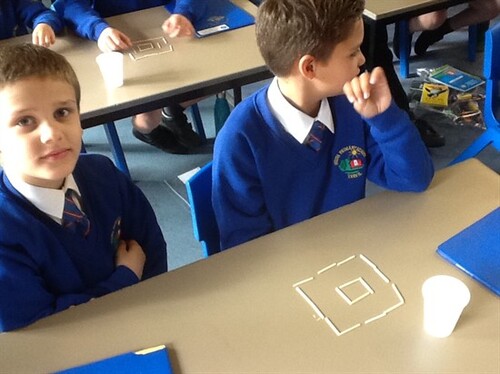
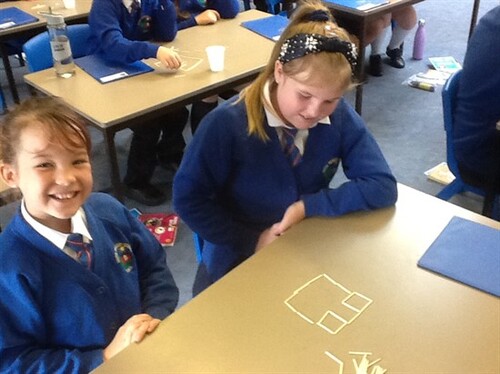
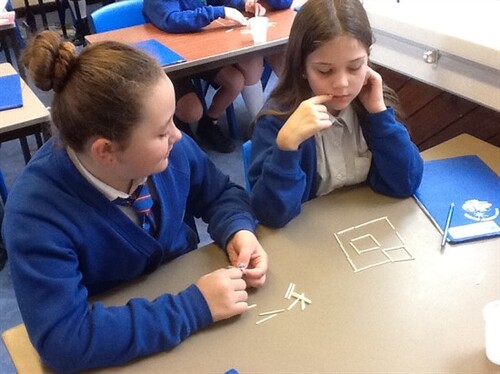
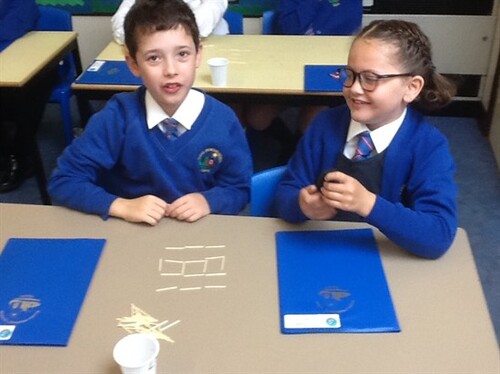
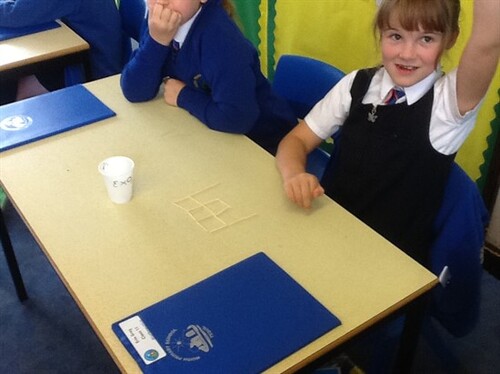
When starting our unit on place value, we looked at solving a coded hundred square by arranging fragments into the correct place. We had to use our knowledge of digits, and compare symbols to the patterns we find in a normal hundred-square, in order to solve it.
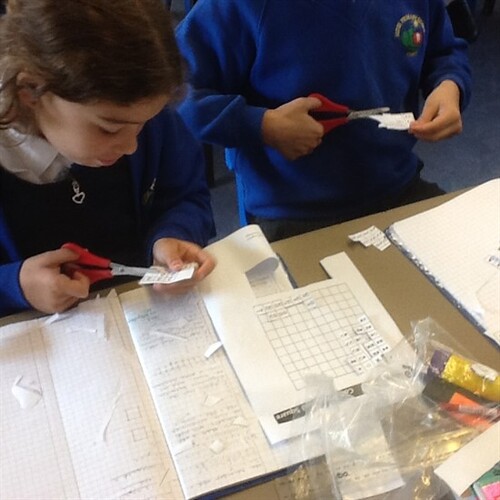
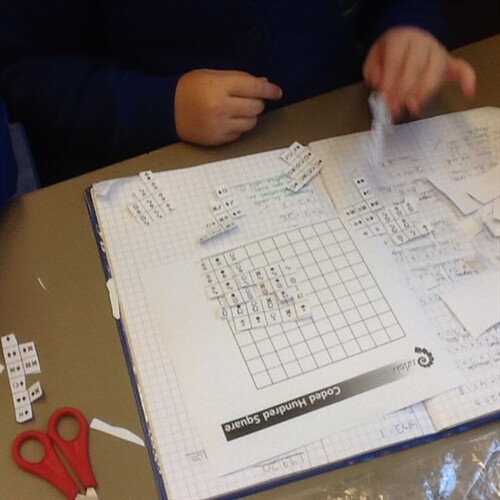
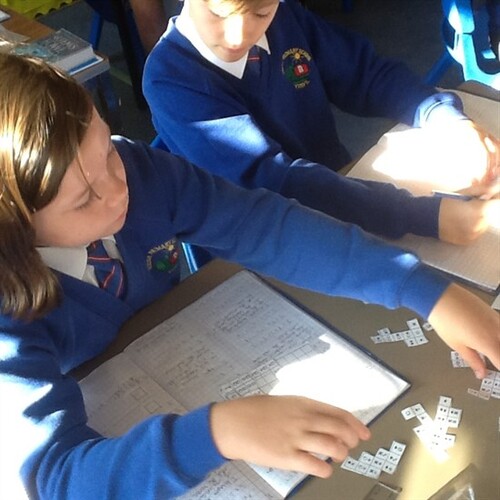
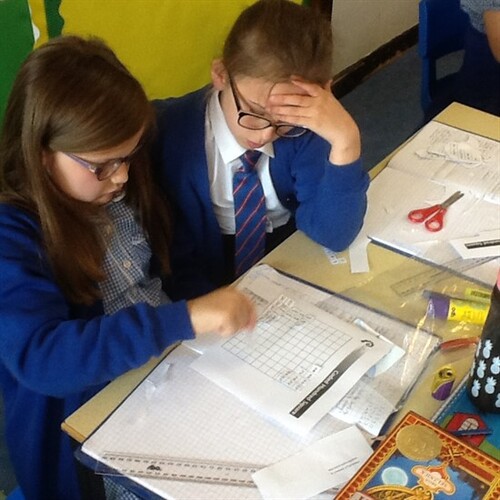
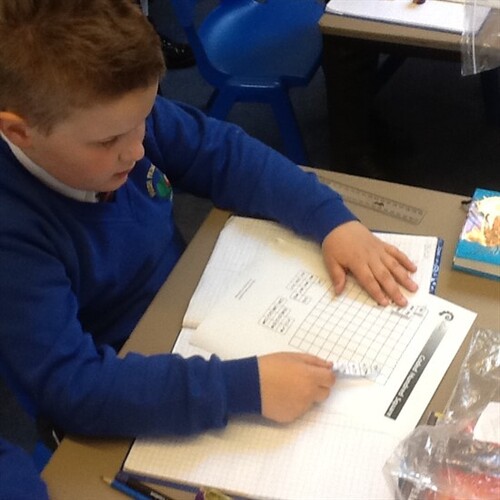
We have been looking at the story ‘Alien Landing’ as part of our unit on narrative writing. As we got to know the plot, we used drama and freezeframes to represent different parts of the story. There was some fantastic acting, dialogue and facial expressions, including some very frightened children, curt doctors, and no-nonsense policemen.
We started our Geography topic on rivers by sharing our holiday homework in classes 11 and 12. We then looked at a variety of interesting pictures about rivers, and discussed what questions we would like to ask about these.
The questions the class came up with included:
• Do these people have electricity at home?
• If they don’t, would they like electricity?
• What are they trying to protect from the flood?
• Why is the water that colour? Is it some sort of algae?
• What are those people celebrating or having a party for? I think it’s for some sort of Indian water god? Is it to do with a Hindu festival? Why are they wearing orange?
• Is it a glacier?

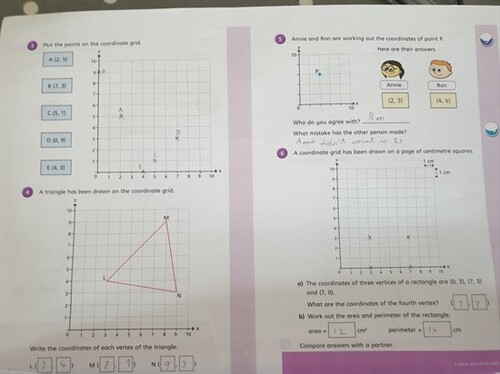
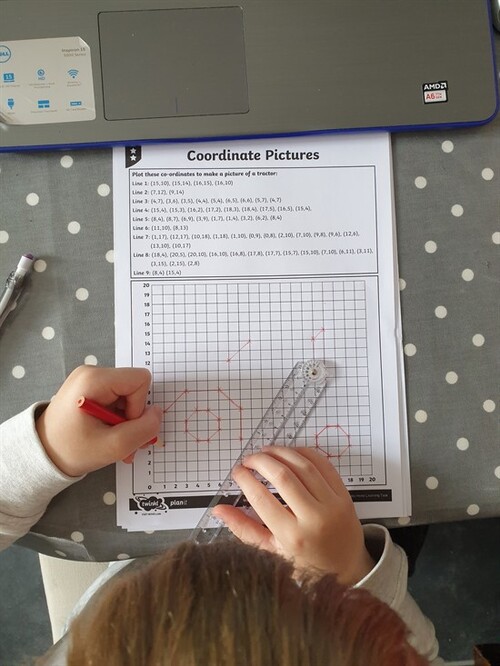
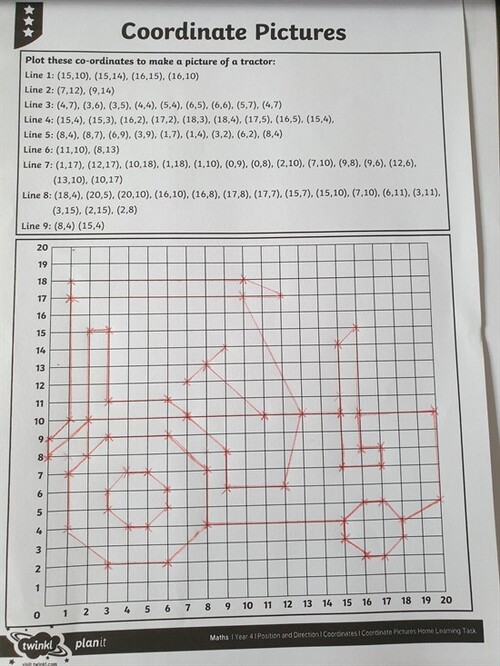
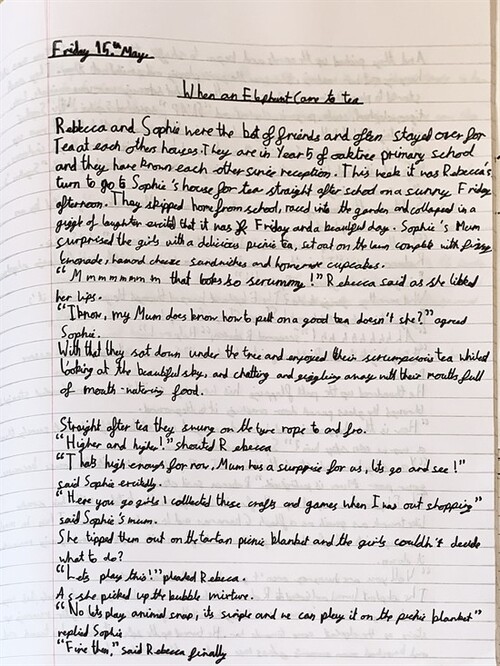
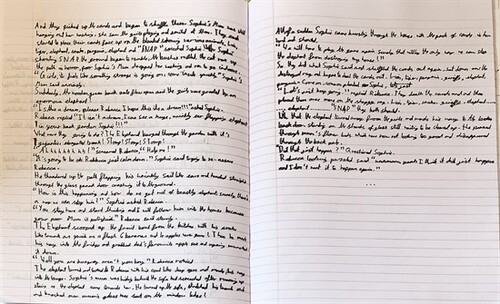
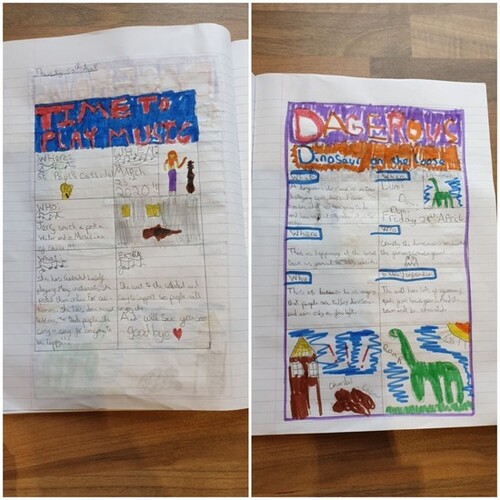
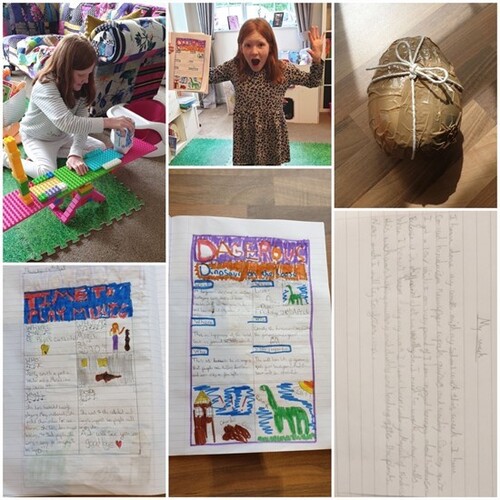



As part of her role as an eco-ambassador for Huish, Bianka has taken part in the WE ARE THE ARK project, run by the Nature Activist Mary Reynolds and aiming to highlight the importance of encouraging land-use that is friendly to nature. As part of the project, she created this sign. Mary Reynolds herself commented on Bianka’s work, saying " Grazyna Wikierska and her daughters stunning sign! Beautiful work. This would surely turn all the neighbors heads and rise awareness.” Well done Binaka!
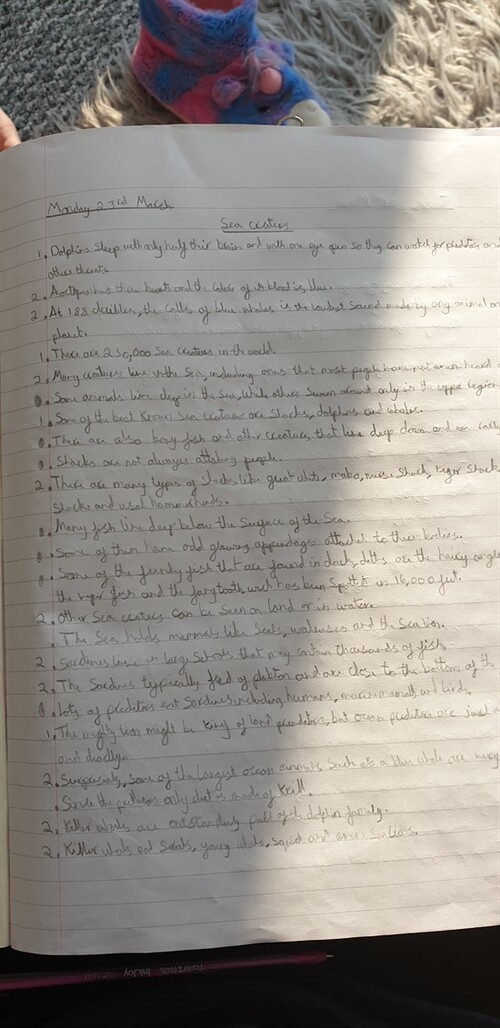
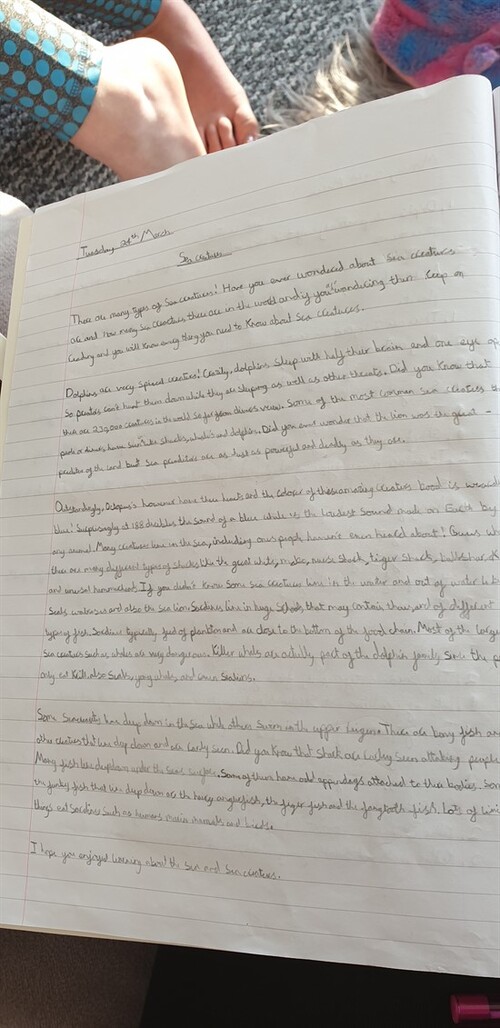
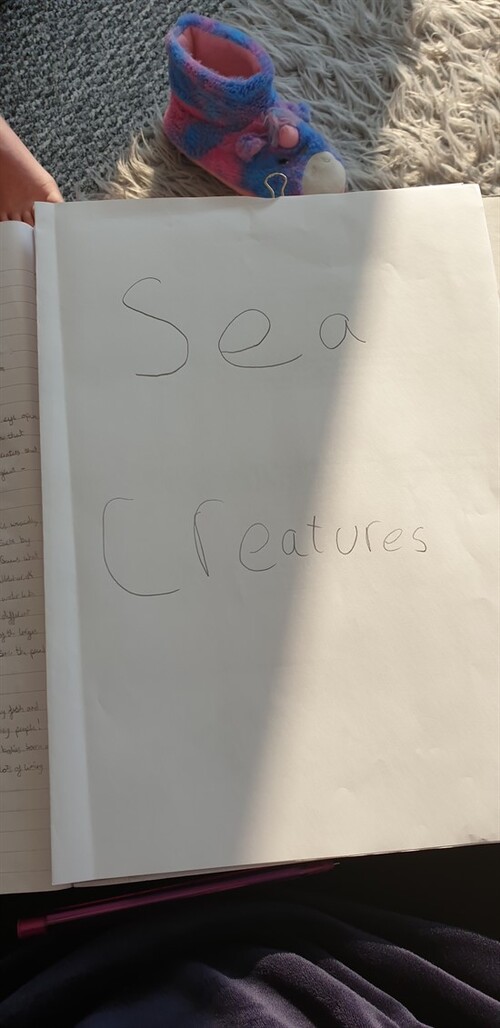
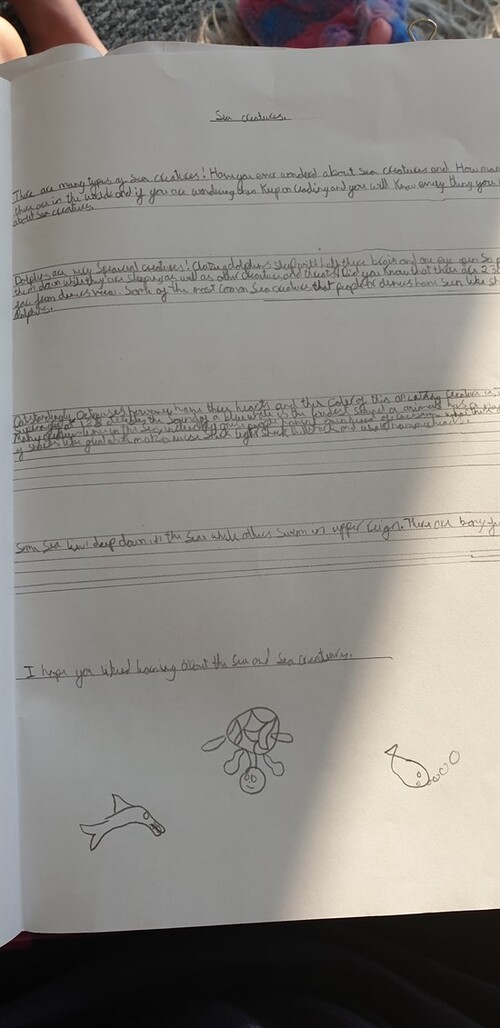
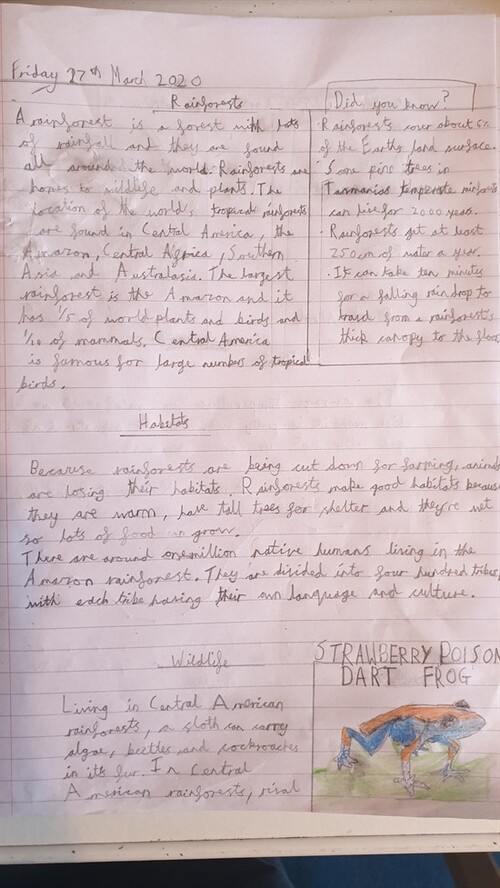
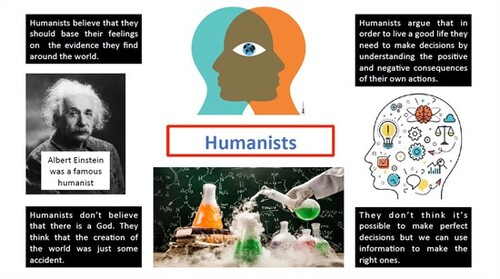

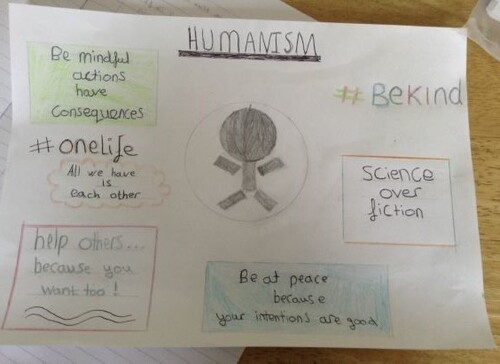
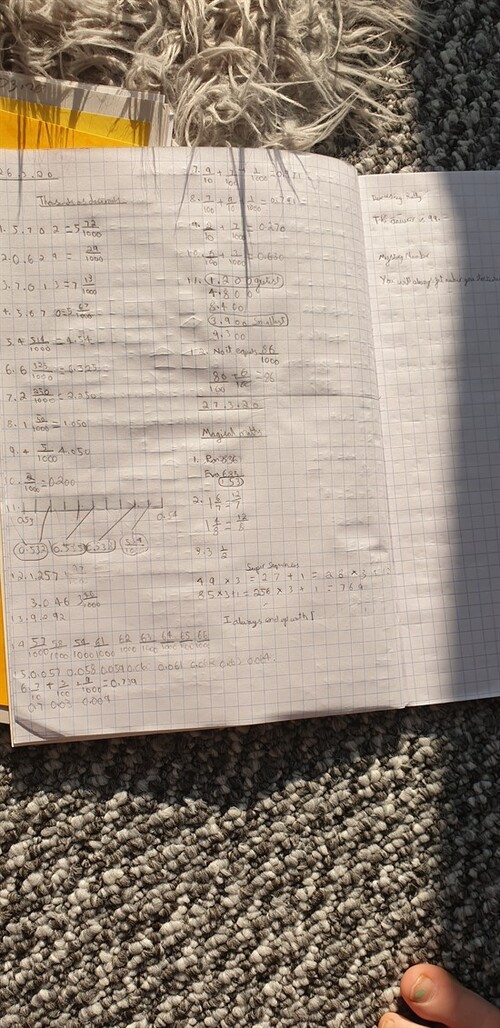


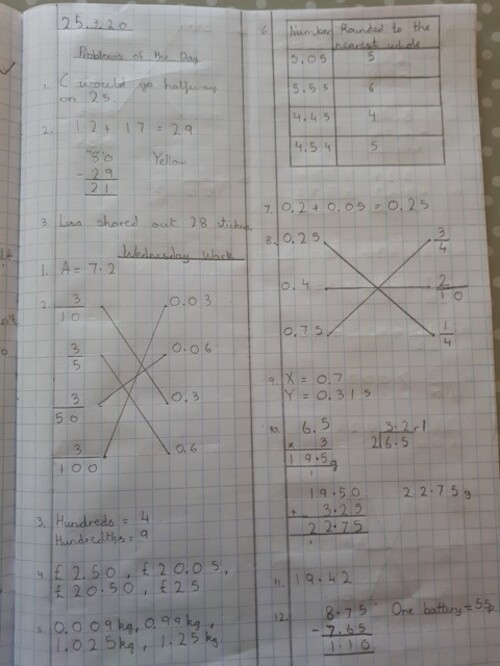
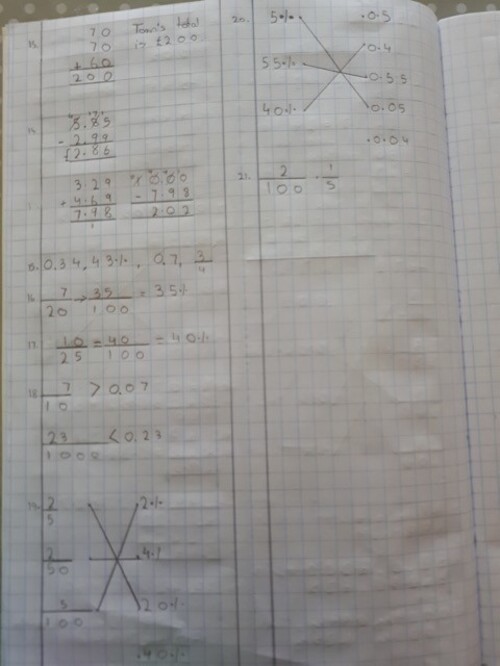
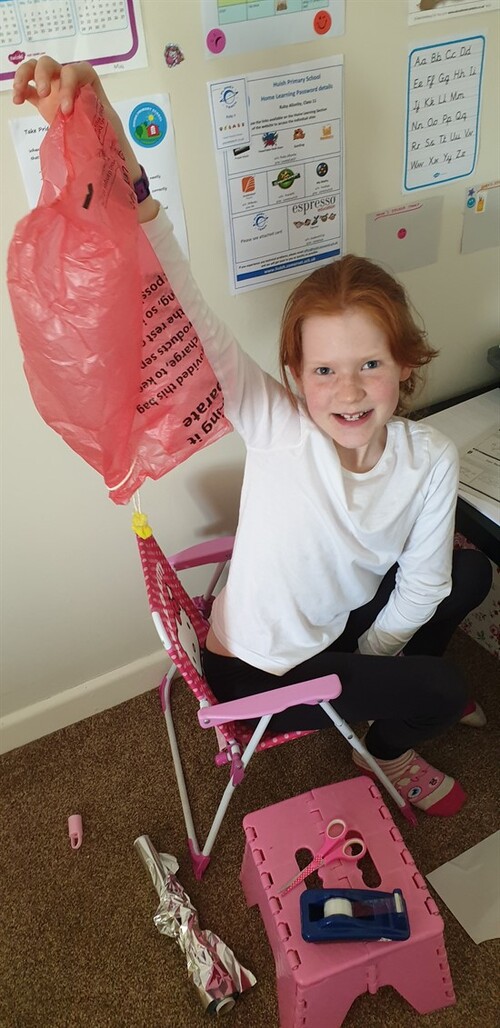
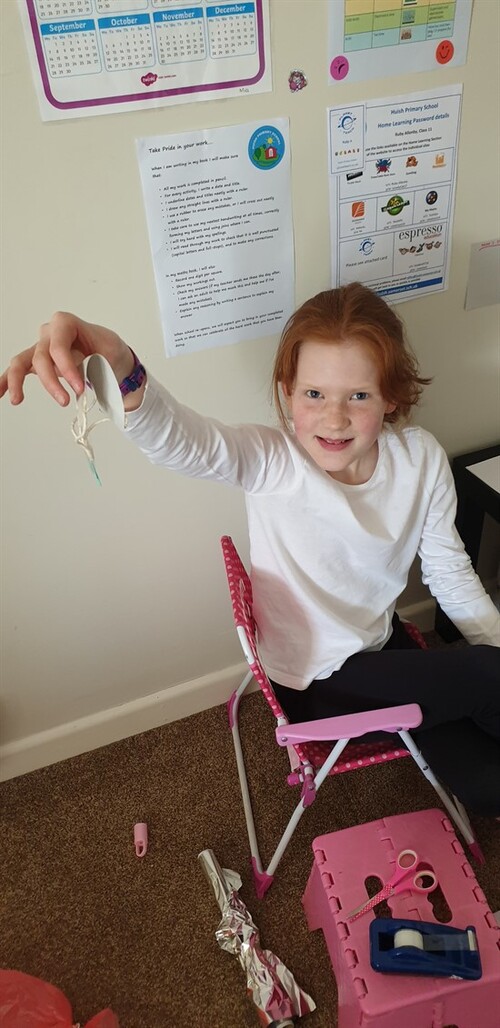
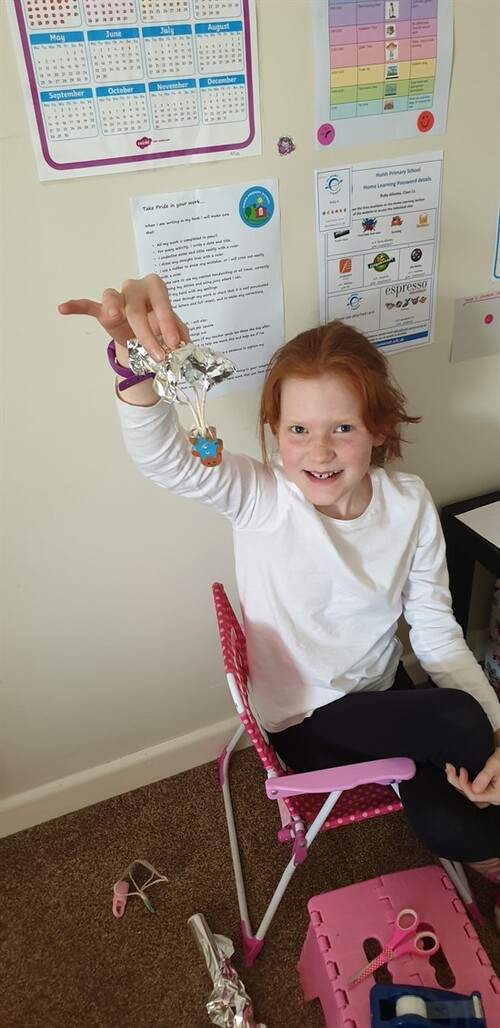


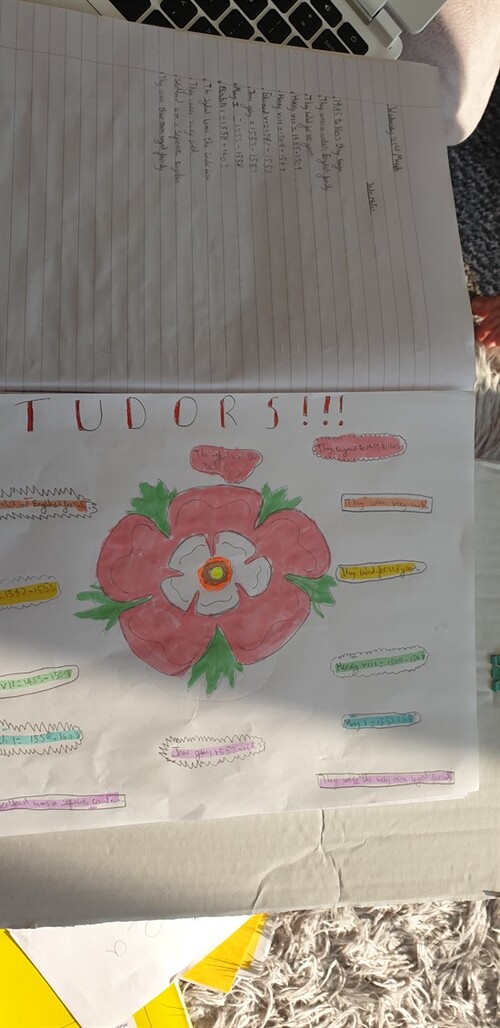
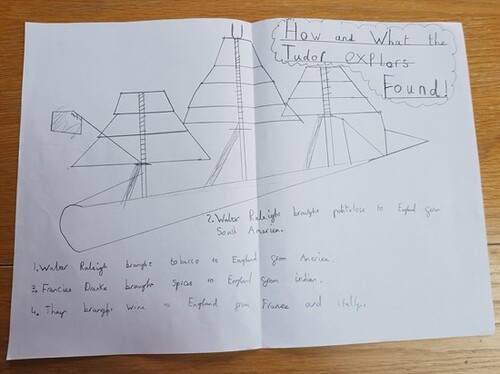
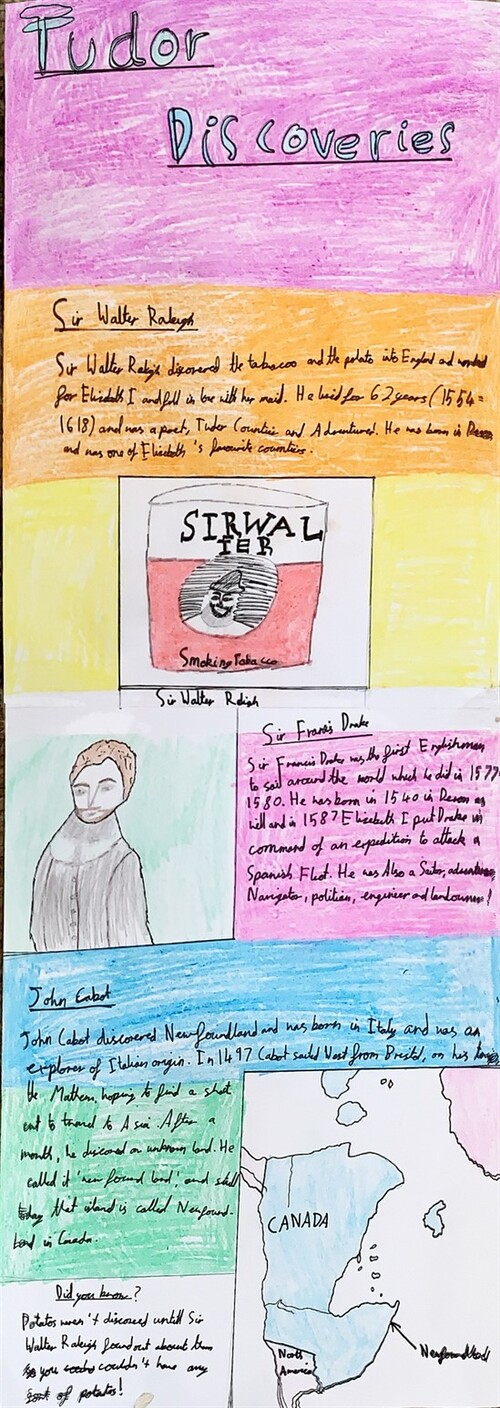


Class 11 have continued to enjoy their brass lessons, and have learned a variety of tunes this term, from Mozart to the Scissor Sisters! Unfortunately, we did not get a chance to partake in our end of term concert, which was due to take place in the last week of term. Special thanks to Mr Thomas, who has been a great teacher, but who is retiring at the end of this term. We wish him the best of luck.




Class 11 donned some excellent and imaginative costumes to celebrate world book day. During the morning, we created some detailed comic strips retelling either our favourite stories, or our favourite parts of these stories. The illustrations and accompanying texts were brilliant, and it was lovely seeing the variation of books and authors that were enjoyed in our class!
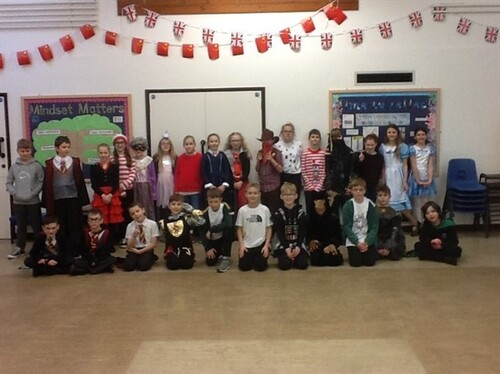
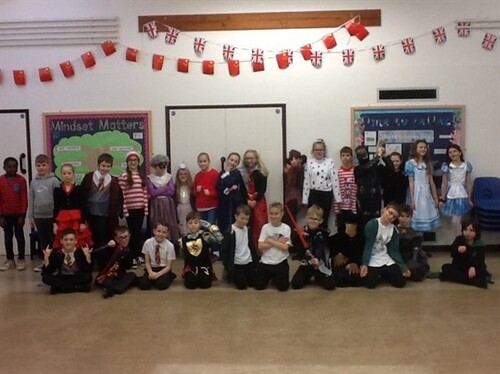
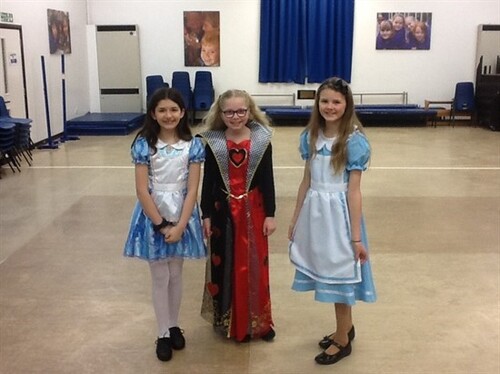
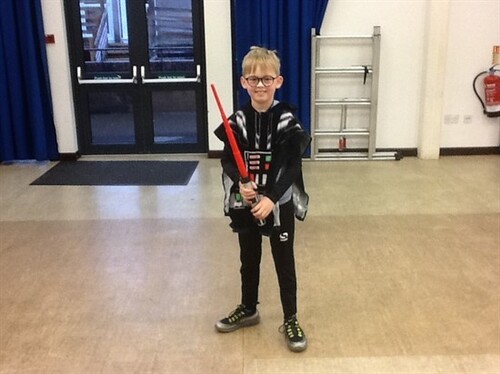
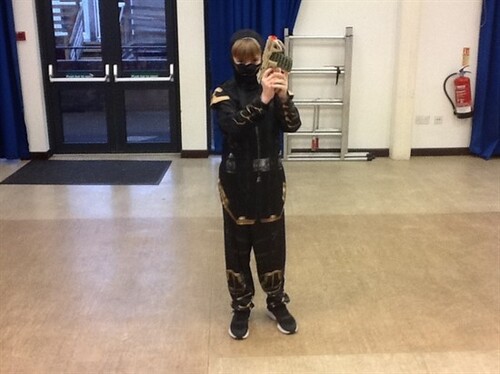
In History, we have begun to study Henry VIIIs wives, and what we can learn about the quality of Henry’s reign, his personality and the Tudor monarchy from this. As part of our lesson, we had a discussion about whether Henry made the correct decision on choosing each wife – we stood up to indicate our agreement with certain statements. This led to discussion about whether he should have persevered with marriages for the sake of alliances, the relative importance of alliances and having a son, and whether upsetting the pope was worthwhile in any situation.




Class 11 and 12 have conducted their auditions for our performance of the highwayman to the rest of school! We were amazed by the expression and clarity of all of the children’s speaking and acting – well done Year 5!





We have begun to learn about fractions in our Maths lessons. So that we can fully appreciate what the integer, denominator and the numerator represent when looking at mixed numbers and improper fractions, we have been using counters to represent different aspects of the fractions we have looked at.





We have continued to have visitors as part of the ‘What Would You Do’ and Crimestoppers drama project. This has led to furthering our understanding of what it means to be part of a community, and some children have been selected to take part in filming for an event which will be screened at Westlands!





We have begun to look at the poem “The Highwayman” in more detail in our English lessons. In order to help understand the different scenes and characters, we have been using hot-seating, mime and drama to explore different aspects of the poem!





We have been studying division in Maths. In order to aid our understanding of what exactly the bus stop method is and represents, we have used place value grids and counters to visualise exchanging and what it entails.





We have been looking at 2 digit by 4 digit multiplication in Maths. As part of the unit, we played some games using dice which required us to pick the best places to put digits in order to be closer than our partner to a target. This aided our understanding of place value as well as our ability to estimate quickly.
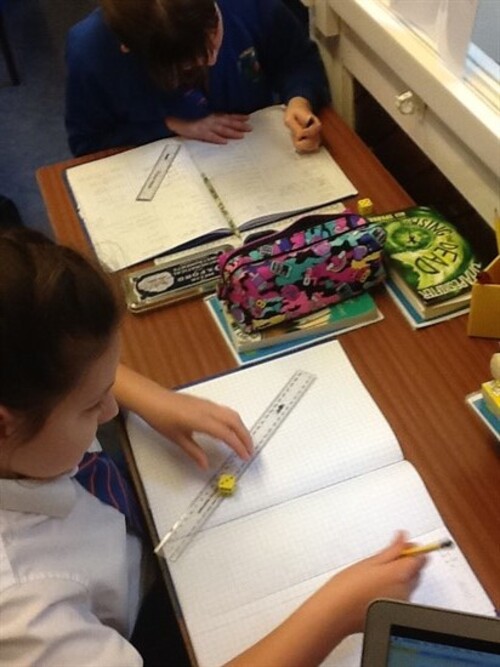




We have begun looking at the epic poem “The Highwayman”! To start off our topic, we paired up then practice reading out a stanza, using our voices to convey emotion. This led to a discussion about rhythm and rhyme in poetry.





For our English homework we wrote the next part of a story called the Evil Genie that we had studied in our Guided Reading Sessions. Class 11 and 12 teamed up and enjoyed listening and sharing our stories. We spotted how different they were even when we had a similar theme to write about.





We have been using concrete and pictorial methods in Maths in order to visualise and understand how and why exchanging works when completing division calculations.This has given us a secure knowledge as we’ve moved onto more abstract questions and problem solving tasks.





In our spelling lessons, we have continued using a variety of activities to prompt our understanding of vocabulary and the recall of different spelling rules. This has included miming or acted more complicated verbs, whilst a partner spells out the word being mimed.
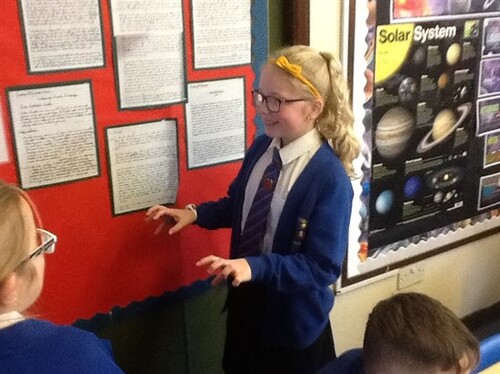
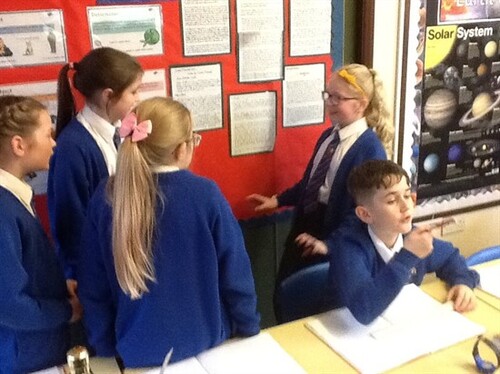

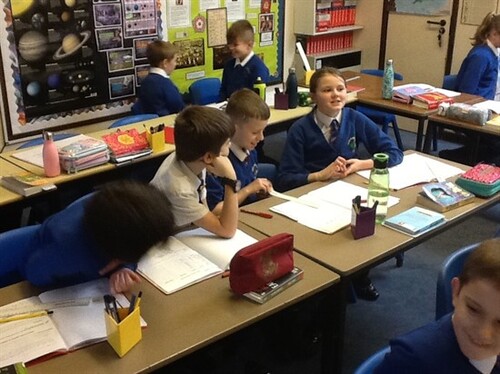
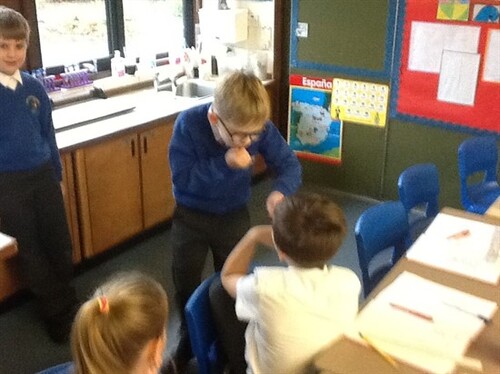
Here is a selection of concrete and practical activities we have been doing in maths in order to investigate and understand square numbers, cube numbers, factors and multiples.





To conclude our unit on column multiplication, we have created games to reinforce our knowledge of this.The games had to include working out 2 digit by 3 or more digit calculations in order to progress.




We have now had our first two sessions with the “What Would You Do?” drama company, in association with Crimestoppers. We looked at what issues could face our local community, and then used freeze frames and group discussion to show our different solutions to these.





As part of our hook lesson to introduce our new History topic, The Tuodors, we created a class-sized timeline in order to understand where our topic fits chronologically, before looking at a variety of unusual (and sometimes disgusting) tudor artefacts. We tried to work out what these could be before finding out what they actually were. Some of the artifacts were types of Tudor games, and we then had the opportunity to play some of these!





To conclude our topic on rivers, children independently designed, made and labelled some models of river basins. They included labelling different river and geographical features, as well as labelling these.
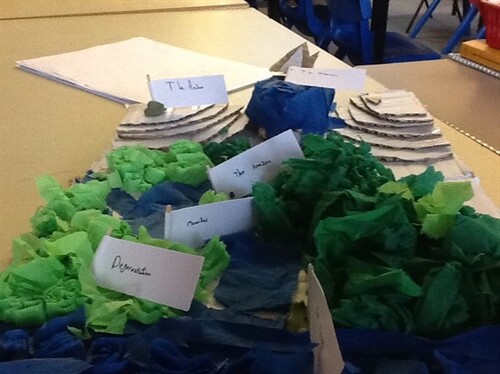
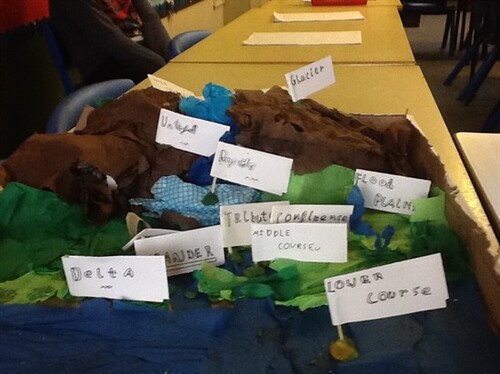
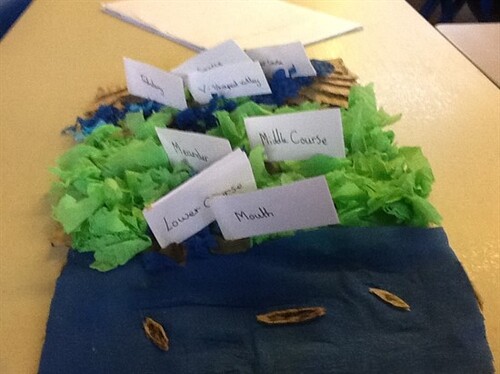
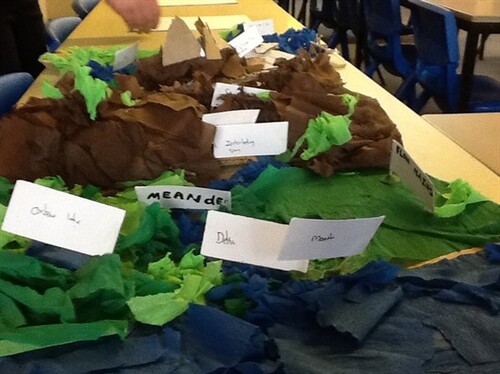
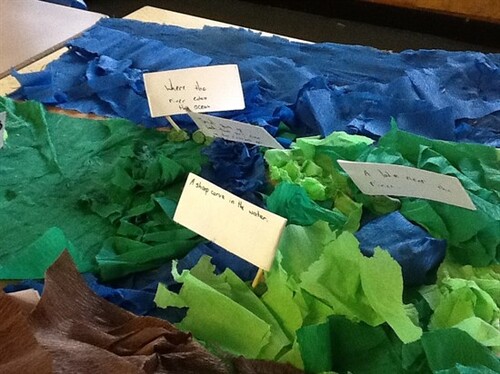
As part of our topic on rivers, we had a debate on the human impact of rivers. Children were asked to make groups and then take opposite sides on a variety of debates on topics such as the use of river by industry, wildlife conservation and whether rivers should be used for watersports!





To conclude our topic on area, we have measured and calculated the compound area of the KS2 playground. We used trundle wheels, meter rules and our knowledge of rectilinear compound shapes in order to achieve this!





We have been creating our own political parties in the run up to the General Election. This included inventing manifestos, thinking about how the country funds policies and creating election posters!





We have recently enjoyed step-up days to both Preston and Westfield. During these days, we have had the opportunity to try our hand at a range of secondary activities, including investigating heat and flammable materials, creating kites, cooking, making model cars and sculptures in DT and watching some of the secondary school dance groups. Class 11 and 12 left these step-up days excited for the opportunities that will come their way in the future!
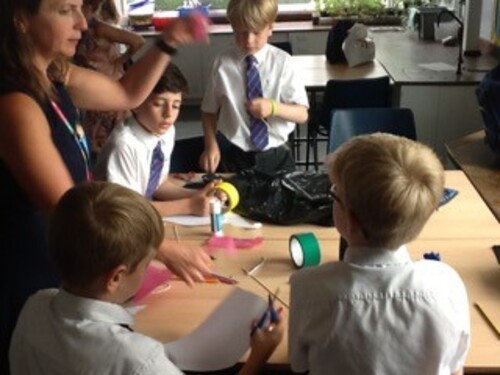
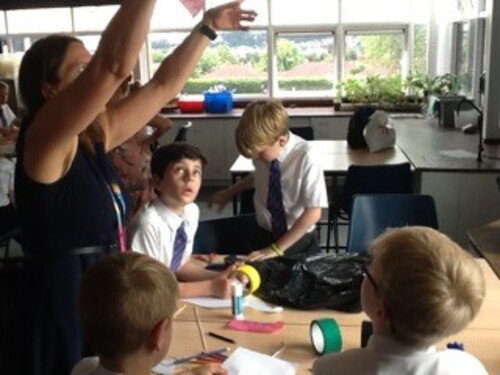
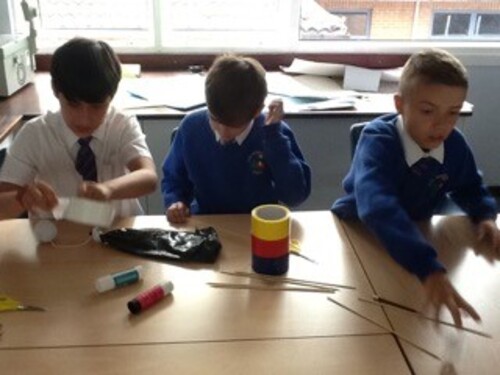
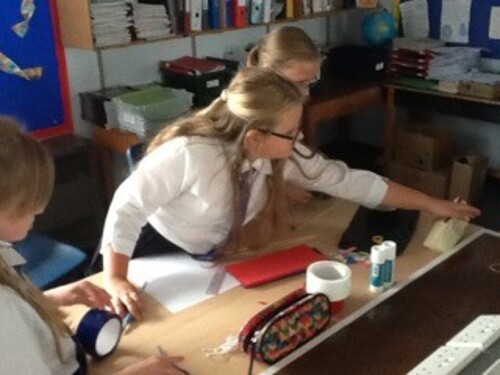
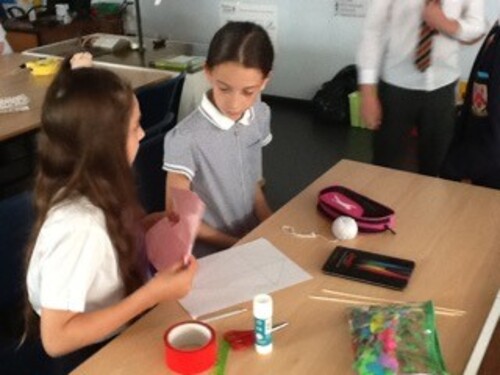
Thank you for coming to watch Class 11s brass concert. All the children have had a wonderful time learning their instruments and Mr. Thomas has been an excellent teacher throughout Year 5. What a great sound Class 11 made!





In class 11 we took the opportunity to share our space pick ‘n’ mix homework. We loved seeing all the hard work that had been put into the projects and there was some incredibly creative and interesting work. Thank you to the parents for all your help with these pick ‘n’ mix tasks!





As part of our final lesson on shape, we had a go at solving a number of tangram puzzles. Tangram is a traditional Chinese shape puzzle that requires a good sense of space and problem solving. We had to make different shapes by arranging different pieces of the tangram puzzle. The children really enjoyed it and wanted to do even more!





This week some of us were lucky enough to visit Westfield Academy for a Science Day. There were four sessions throughout the day, so we learnt a little about biology, chemistry and physics. In our first session we did some taste and smell tests to study our senses, threw tennis balls at a glass screen to look at how our nervous system reacts, watched the teacher make 'elephant’s toothpaste’, mix vitamin tablets with water to make film canisters pop and use a plasma globe to make hair stand on end - and all of this was just in the first hour!! In our biology session we dissected a chicken wing to learn about the different parts bodies are made up of. For chemistry, we had to solve a crime to see which pen (and which criminal) had written a fraudulent cheque by using chromatography paper to separate inks. Finally in our physics session, we made circuits to turn on a light bulb, and then added in switches and buzzers to see how we had to change the circuits so that it still worked. We then looked at how to properly draw a circuit.
It was a fantastic day and a massive thank you to the Westfield science department for the hard work they put into the day.

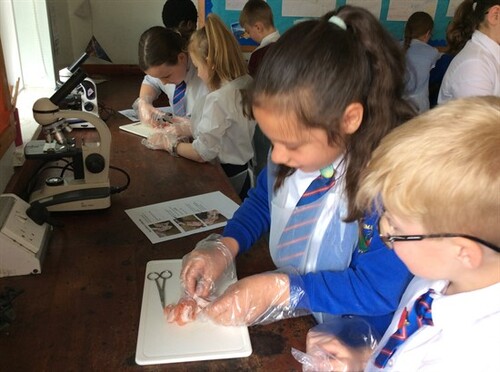
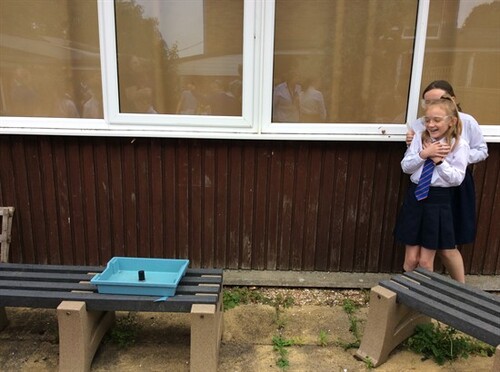
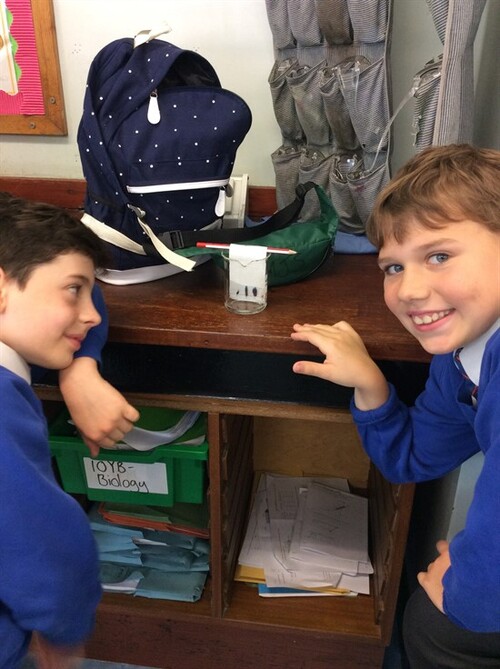
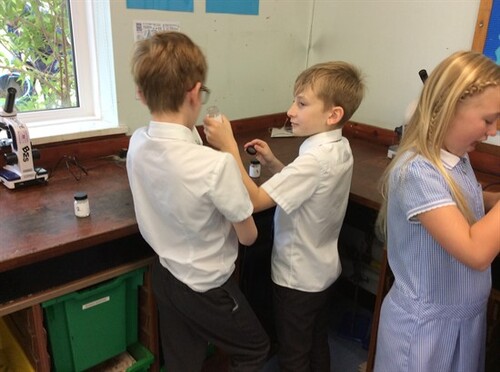
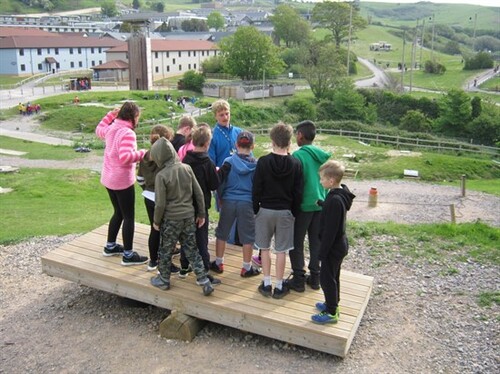
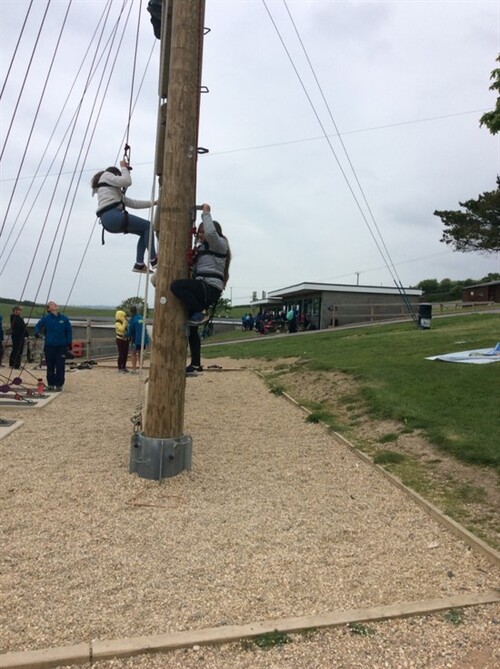
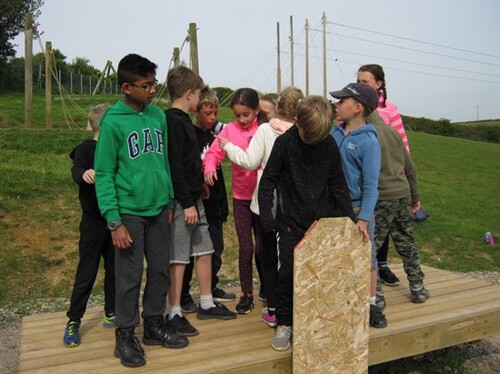
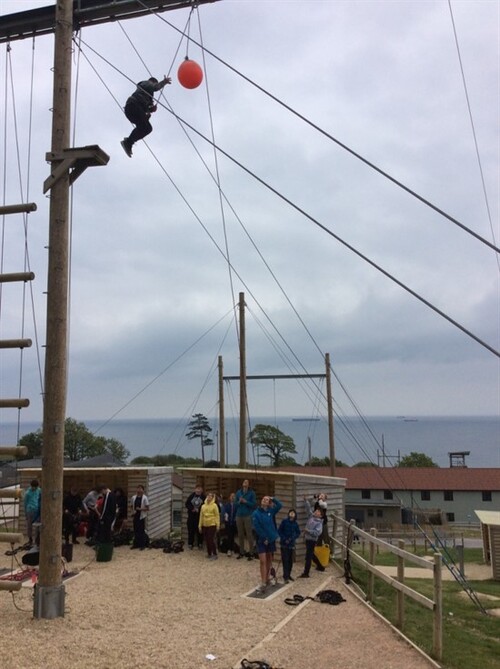
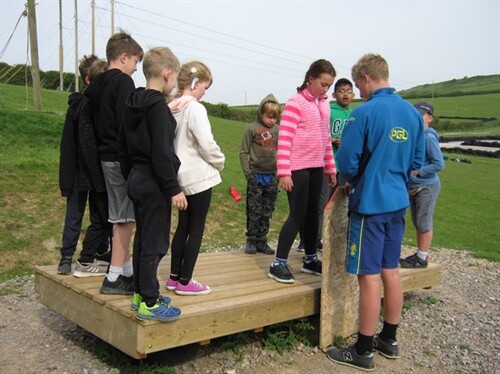
The children are all enjoying the fantastic weather and all the activities at PGL. They have had visits from Mr Hillier-Nickels and many other staff members and looking forward to their disco tomorrow night.
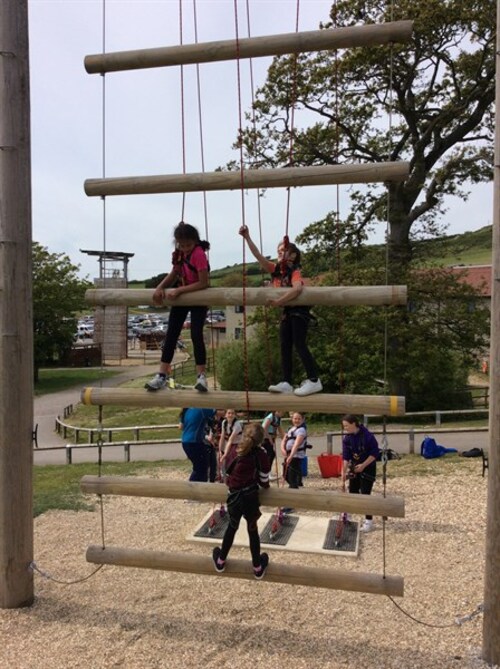
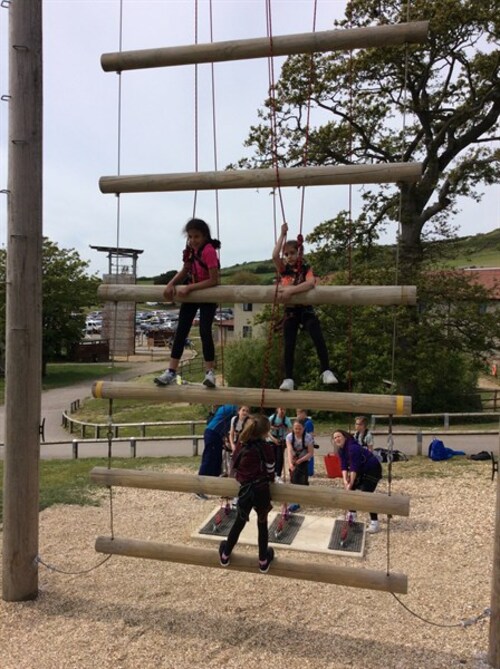
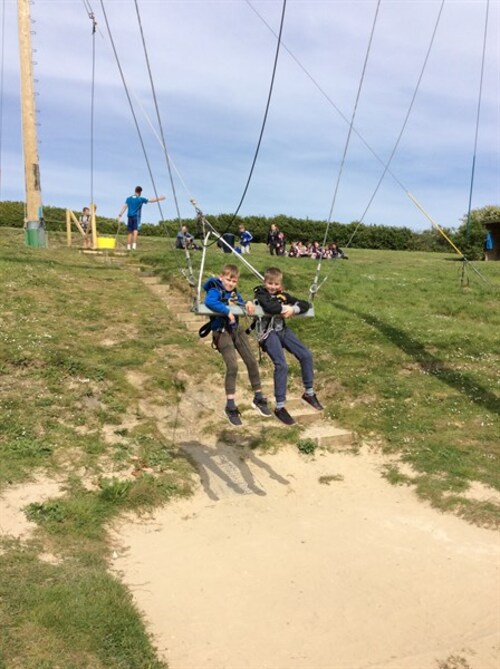
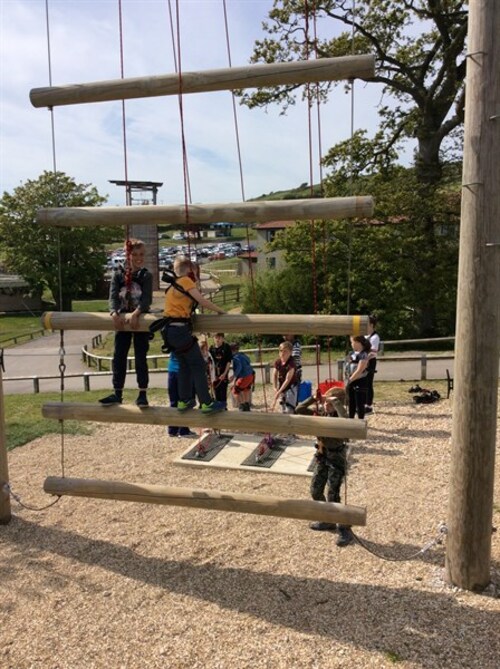
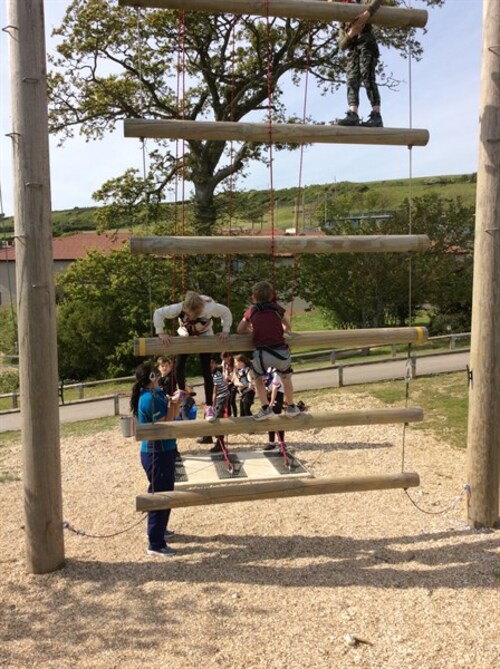
Class 11 visited Preston to take part in a Science lesson on forces. We made parachutes and attached different masses to them, recording the varying times it took for the different loads to reach the floor. We had to stand on the tables to get enough height for the parachutes to open! We enjoyed the lesson and it was exciting to experience what Science will be like at secondary school.





As part of our work on Tudor explorers, we designed an interview with Sir Francis Drake. All that we knew before we started was that he was a famous Tudor sailor and explorer who knew Queen Elizabeth. From that, each group decided on some questions before researching the answers and practicing a TV style interview! We then used green-screen to help the final interviews take place on-board Tudor ships. Some groups even used pictures of The Golden Hind (Drake’s ship) itself for their interview.

We had a visitor from Somerset Road Safety who explained different ways to stay safe on the roads. He reminded us of why we stop, look, listen and think, and we discussed how we need to be aware of electric cars and other quiet vehicles. We also talked about sensible and safe places to cross the road.

We learnt about how the Tudors often used salted foods on long voyages to help with their preservation – essential as refrigeration hadn’t yet been invented! We also discussed what else sailors could have done, including taking livestock with them or catching food along the way.
It’s safe to say that the salty “hard tack” biscuits were met with a mixed response, but at least we didn’t have to tap them to get the maggots out!
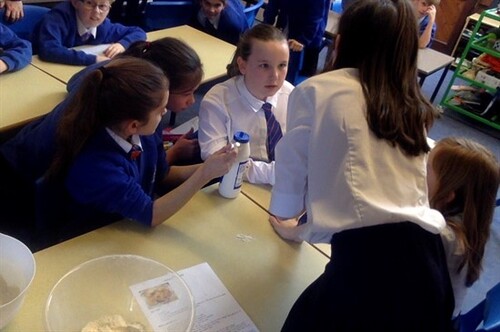
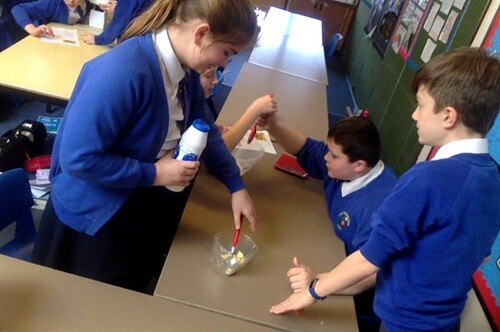
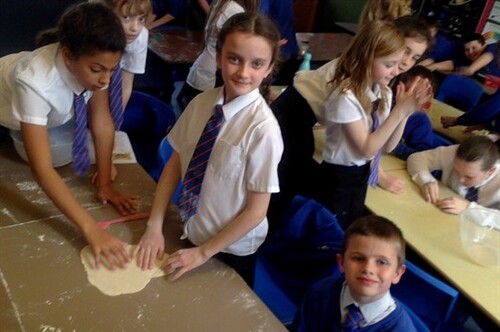
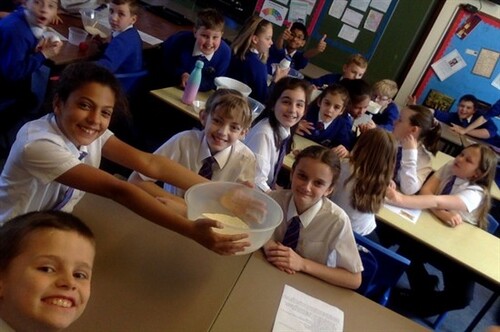
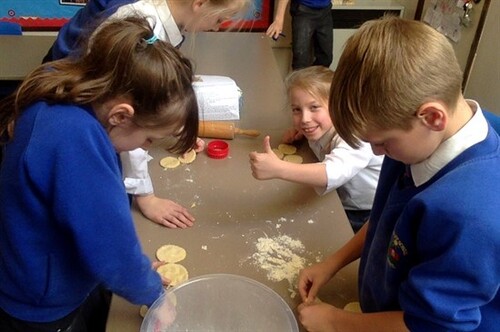
We looked at the crucifixion story and chose six parts of the tale to freeze-frame in groups. We paid special attention to how we could convey the different characters’ feelings with facial expressions and body language. We also sequenced the story to make sure we could remember the order, cause and effects of Jesus’s death.
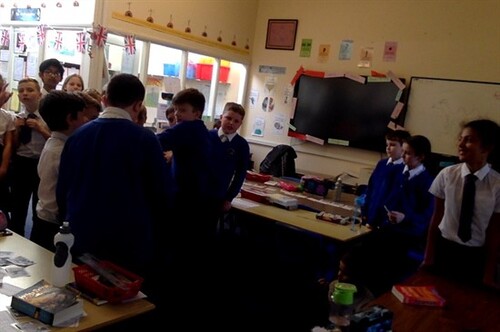
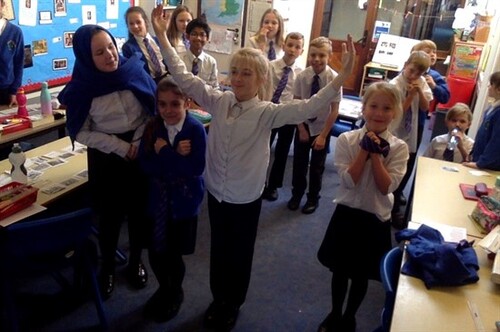
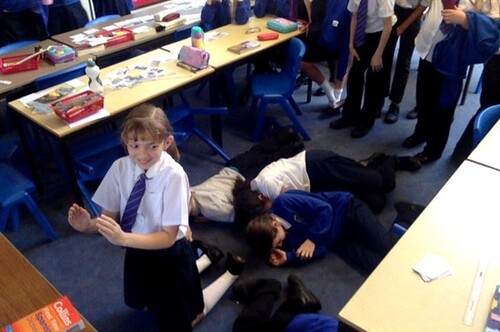
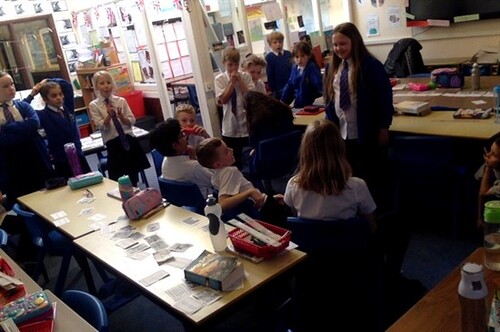
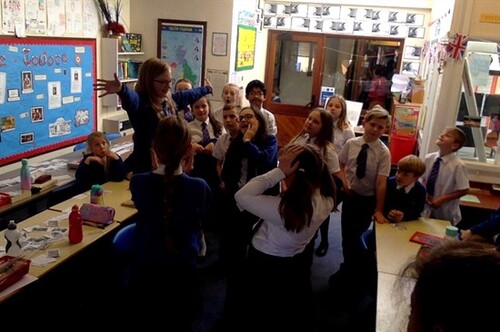
We made model Tudor Houses using wood, card and paper. We were careful to include lots of features, including galleries, small windows, thatched roofs and wooden beams to support the wattle and daub.
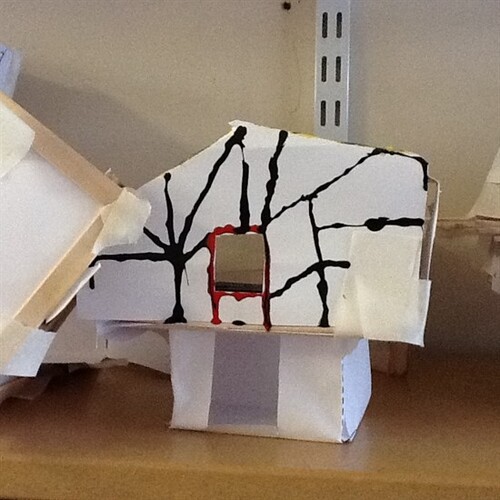
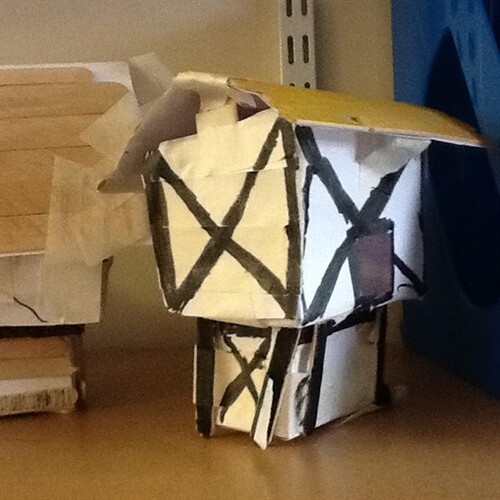
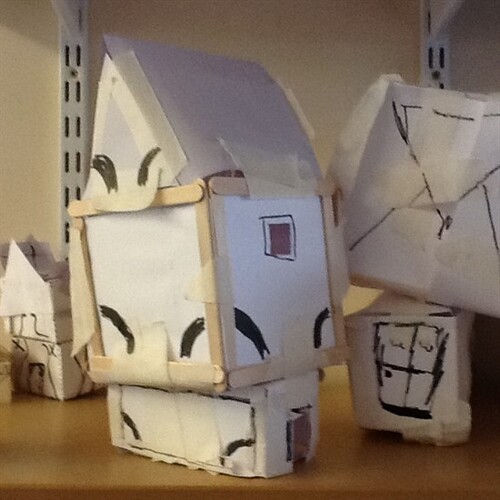
We have been learning instruments on Wednesdays and have had a wonderful time practicing and learning new songs – we are looking forward to upcoming opportunities to showcase our talents in front of the school!
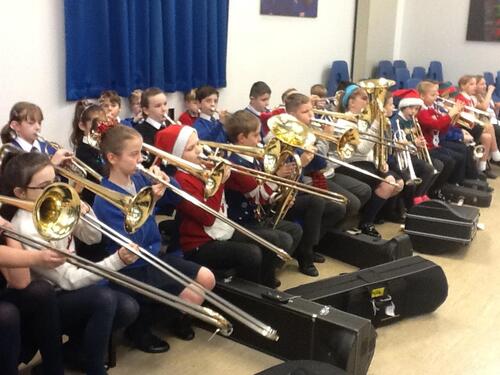
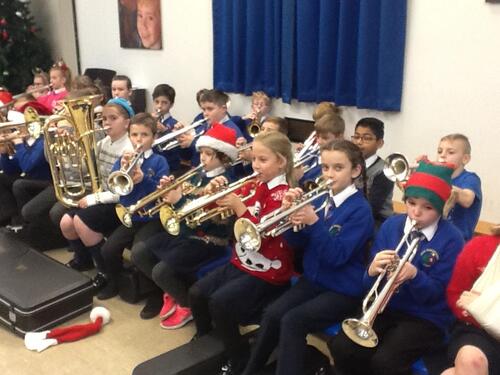
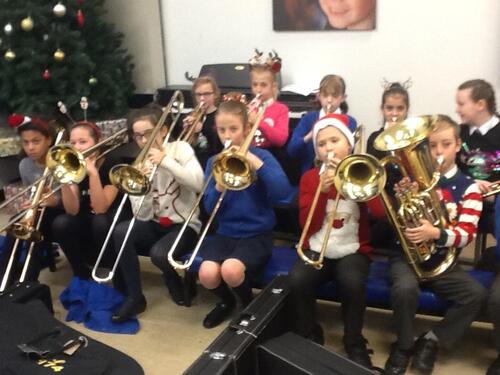
We have been learning instruments on Wednesdays and have had a wonderful time practicing and learning new songs – we are looking forward to upcoming opportunities to showcase our talents in front of the school!


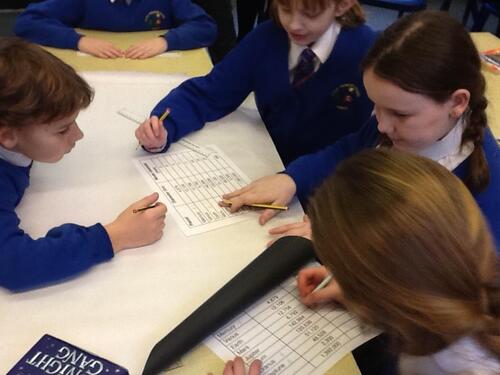


We have approached a number of reasoning and problem solving tasks in maths this year – this includes solving problems based on numbers written in different scripts, developing strategies to beat out talk-partners in games and creating out own mathematical games and problems.
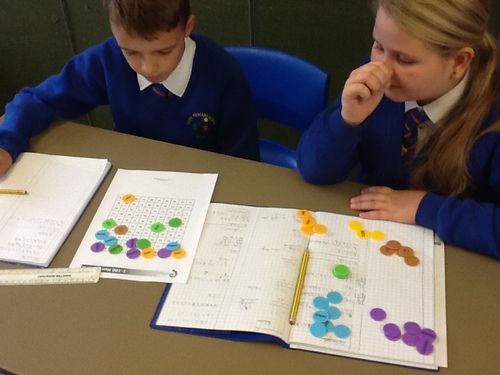
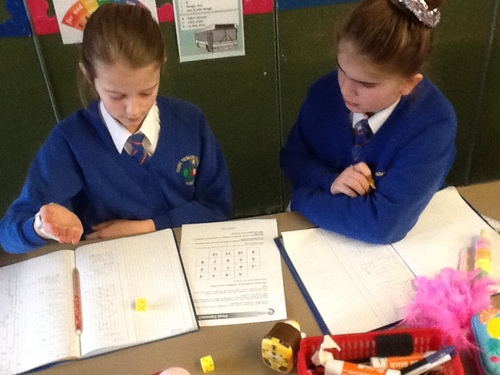

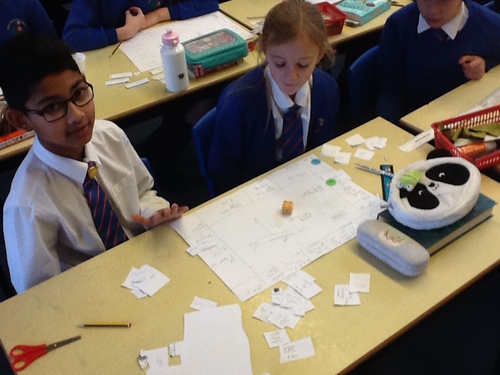
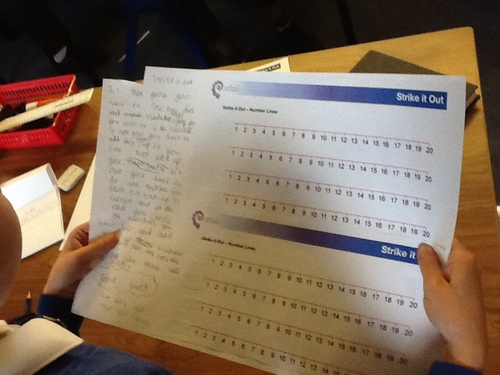
Nicky and Michelle came to visit us today from Nationwide. They taught us all about banking and money. We learnt about current accounts and how someone can pay for things. Some of us knew about saving money, especially if we were lucky and got money for our birthday. We learnt about interest and percentages. We learn that if we saves £100 and the interest was 1%, it would be £1 interest. We talked about how to keep ourselves and our money safe and secure. Some of knew about ‘scams’ and how to be careful. All of us learnt what a Money Mule was and how we could prevent this from happening.



We recapped what we learnt today in a speech bubble. Here are some examples:



After months and months of hard work and practice, we finally performed the clarinet to our parents and carers! We played Twinkle Twinkle Little Star, Mrs Muddle, Laxton’s Pearmain and Uptown Funk and some of us performed a solo or as part of a small group. We were nervous but our nerves were overcome with our excitement and we put on an excellent show!





The children enjoyed lots of activities yesterday, including the high ropes, archery and fencing. The sun shone for us, the children were exhausted after such a busy day.





After a great night's sleep and a hearty breakfast the children have travelled to Portland for Dragon Boat racing and are looking forward for a fun filled afternoon back at Osmington!





The children arrived safely at PGL, but sadly the weather was very wet so there was no trip to the beach. The children have all settled in to their rooms, toured the site and enjoyed activities indoors. Everyone is looking forward to the activities tomorrow, where hopefully the sun will put in an appearance.





Today is Earth Day! To celebrate Earth Day, we thought about the importance of looking after our Earth and how we can protect it. We learnt about why we celebrate Earth Day and discussed many areas of how to protect our planet. We completed a Guided Comprehension all around Earth Day and plastics. This helped us with our knowledge about our Earth, how we use plastics and how we can prevent plastics damaging our planet. For our art lesson, we read the flap book 10 Things I Can Do to Help Our World. We then discussed other ways we could help our world.
Our own ideas:
Building new habitats, Sustainable energy, Solar panel, Shop local, Reuse recycling, Reduce the things you buy or use, Volunteer
We then made a flap for a class flap page with lots of ways to help our planet and wrote information underneath the flap! Here are some examples of our work:



We had a fantastic day as we were joined by five Leonardo employees who led us in a series of STEM workshops where we created a rollercoaster and a boat that could float after weight was added. We evaluated and improved not only our scientific and DT skills but also our teamwork and communication.





Year 5 enjoyed our RAF STEM day and created our own rockets to test to see how far they would fly. We had great fun!





Take a look at our amazing homework that we shared across Class 11 and 12. We did a fantastic job and learnt lots of fascinating facts about South Africa. Well done and thank you for your hard work.





Year 5 enjoyed their Christmas Dinner- it was delicious!





We studied a an African artist called Gakonga and practiced our painting skills to create our own pictures in his style. Some of these were displayed at our art exhibition while others are on display in the corridor for everyone to admire.





Across Year 5, we shared our brilliant Pick 'n' Mix homework pieces all about rivers. It was wonderful to see their hard work and new geography knowledge to support our rivers topic.





Over the last few weeks, we have been investigating materials and their properties. We sorted materials before carrying out tests on them. We used pipettes to test for permeability and absorbency; magnets to test for magnetism and electrical circuits to test for conductivity. Some of the results surprised us. We added these results to our mind maps. In the next lesson, we then thought about why specific objects were made of certain materials and how the properties made them suitable. We did a treasure hunt around the school looking at different objects.





We were introduced to our new class text The Arrival. We immersed ourselves in role play to capture the feelings of the characters. This aided some powerful writing tasks.





For our first week back, we studied abstract art and made our own abstract art pieces. We included sentences about ourselves so that our new teachers could get to know us more!





We are very lucky in Year 5 because we get to learn the clarinet for the entire year!
In our first lesson, we learnt about each part of the clarinet, how to make them, how to clean them and, most importantly, how to play them! Most of us were able to make a sound without too many squeaks! We are now able to take home our clarinets to practice.




